
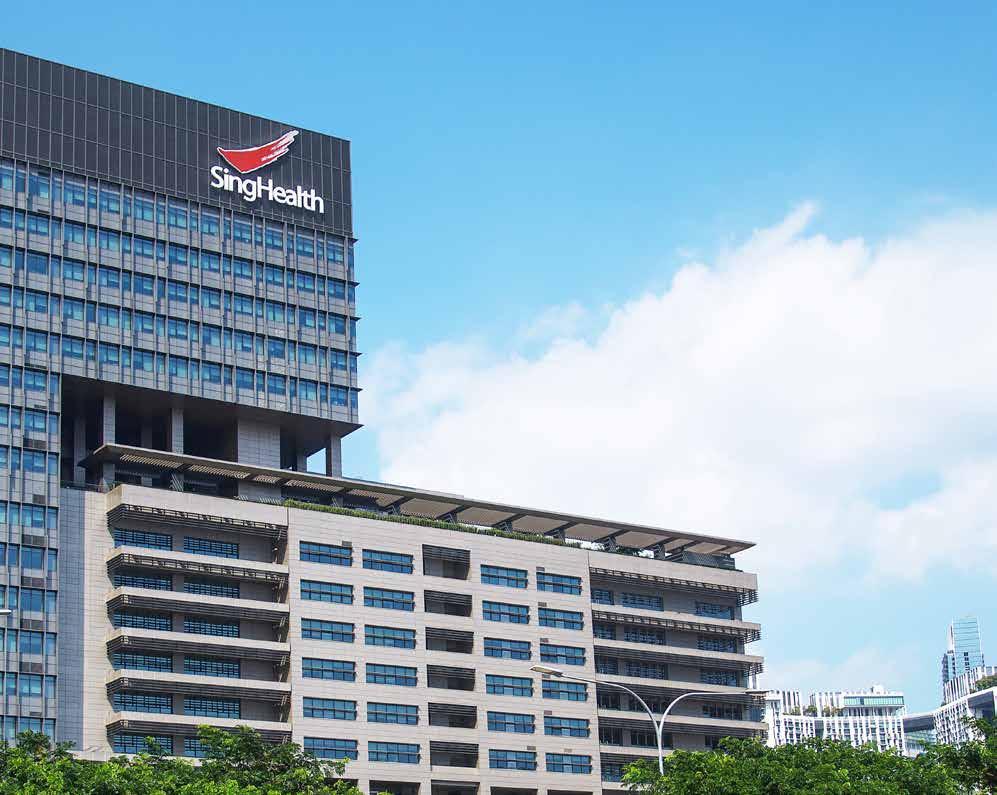

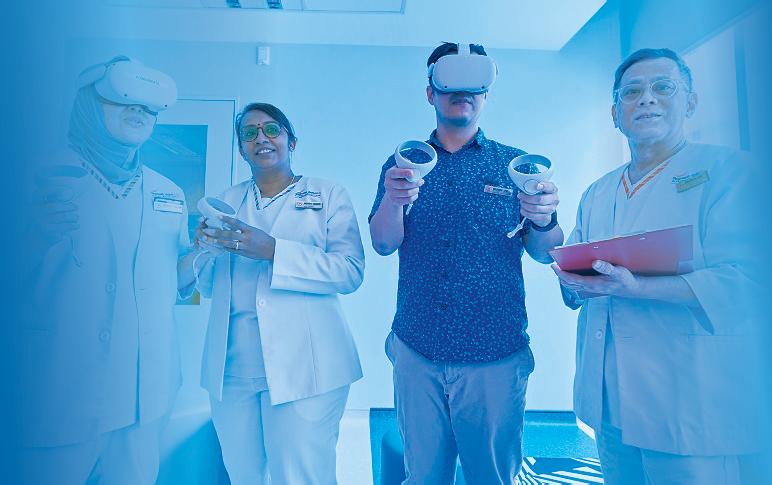
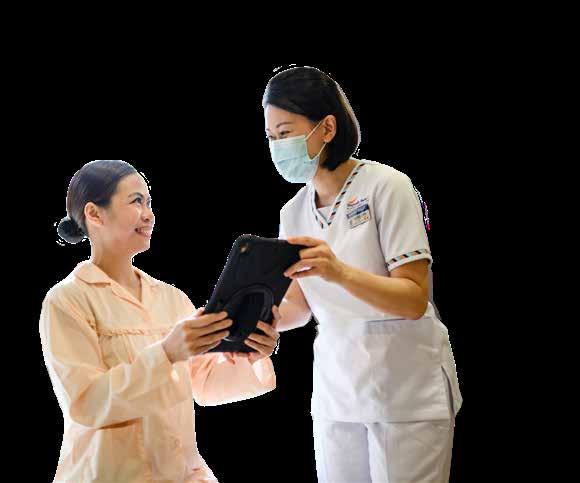
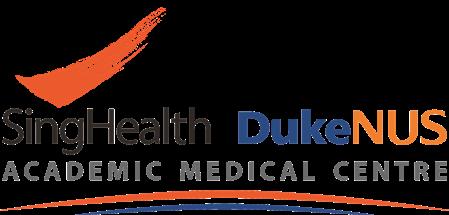
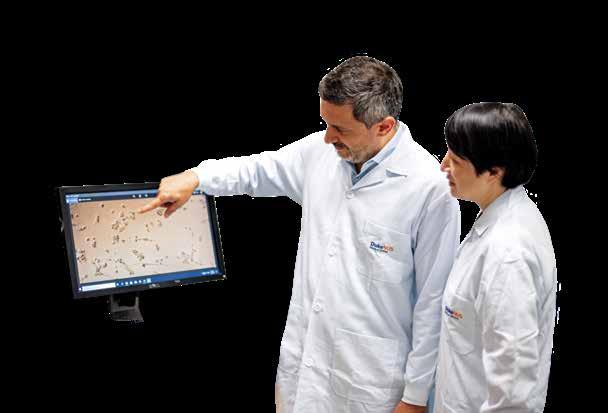
AROUND YOU CENTRING OUR CARE ANNUAL REPORT 2022/2023
SingHealth Duke-NUS
Academic Medical Centre
Annual Report 2022/2023
SINGAPORE GENERAL HOSPITAL (SGH)
CHANGI GENERAL HOSPITAL (CGH)
SENGKANG GENERAL HOSPITAL (SKH)
KK WOMEN’S AND CHILDREN’S HOSPITAL (KKH)
NATIONAL CANCER CENTRE SINGAPORE (NCCS)
NATIONAL DENTAL CENTRE SINGAPORE (NDCS)
NATIONAL HEART CENTRE SINGAPORE (NHCS)
NATIONAL NEUROSCIENCE INSTITUTE (NNI)
SINGAPORE NATIONAL EYE CENTRE (SNEC)
SINGHEALTH COMMUNITY HOSPITALS (SCH)
SINGHEALTH POLYCLINICS (SHP)
DUKE-NUS MEDICAL SCHOOL (DUKE-NUS)
Copyright 2023 Singapore Health Services
Information accurate at time of print.
PUBLISHED BY
Singapore Health Services Pte Ltd
10 Hospital Boulevard
Singapore 168582
Tel: (65) 6225 0488
www.singhealth.com.sg
media@singhealth.com.sg.
All rights reserved. To reproduce content, please email
CENTRING OUR CARE
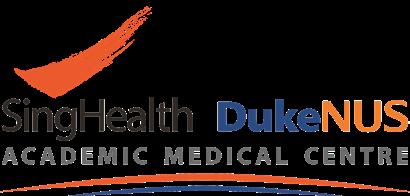
AROUND YOU
CONTENTS
OUR LEADERSHIP
Chairman’s Message
Duke-NUS Medical School


Chairman’s Message
Joint Leaders’ Message
OUR PEOPLE
Connecting Family Doctors and Specialist Clinics
Targeting Cancer Cells with Proton Beam Therapy
$25 Million to Reduce Blindness
Building Resilience through Mentoring
CVS.AI: Keeping Your Heart Beating

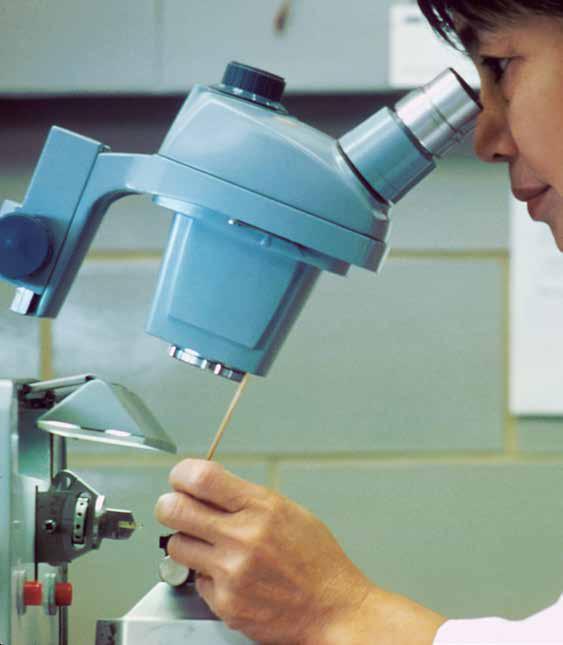
44 Improving Outcomes and Quality of Life 48 Advancing Healthcare System Reliability 54 Contributing to a Healthier Tomorrow through Education 64 SDGHI Leads the Charge to Tackle International Health Challenges 68 Research: Transforming Medicine 78 Fuelling Research and Hope for Patients through Philanthropy 88 About Us 90 Leadership 94 Overall Key Figures and Statistics 96 Financial Information Research Statistics 110 112 Education Statistics 116 Giving Statistics OUR IMPACT OUR ACHIEVEMENTS
SINGHEALTH CHAIRMAN’S MESSAGE

2022 marked a year of significant achievements for SingHealth. We advanced our healthcare transformation efforts, innovated new models of care and achieved a new milestone in our campus development efforts with the opening of the new National Cancer Centre Singapore (NCCS) building.
As Singapore’s largest Academic Medical Centre (AMC), we are relentless in bringing the best outcome and experience to our patients who entrust us with their care. For close to a decade, SingHealth has been bringing care beyond our institutions’ walls to residents, enabling them to keep well, get well and age well at home and within the community. This has prepared and positioned us to readily support the national Healthier SG initiative.
Healthier SG complements our national role of providing cutting edge tertiary and quaternary care. Our longstanding partnership with our General Practitioners (GPs) and community partners enable us to intervene early and achieve better outcomes for the 1.5 million residents in the East. We established a comprehensive ‘Population Health Governance Framework’ to guide our population health strategy as a cluster. The newly set up Regional Health System (RHS) Operations arm further translates our strategies into practical programmes such as Health Up!, which empowers Singaporeans to cultivate an active lifestyle and stay healthy.
We are thankful for the strong support of GPs, People’s Association, SportSG and the Health Promotion Board among many others, who work hand in hand with us to foster a supportive ecosystem, and to leverage technology to facilitate care for our patients and population. Partners Buddy is one prime example. Using a web-based platform, our specialists can furnish real-time updates to GPs, and communicate on a patient’s condition and care plan anytime, enabling more coordinated care across the continuum to effect better treatment outcomes.
This year, we took a significant stride forward in realising the ambitious SGH Campus Masterplan, with the opening of the new NCCS building.
Mr Cheng Wai Keung Chairman, SingHealth
I am excited for what is to come as we embark on the next lap of our academic medicine journey
4 SingHealth Duke-NUS Academic Medical Centre
– by trailblazing research and innovation advancements and delivering the most advanced care possible with the best outcomes; compelled by our common purpose of always putting Patients, at the Heart of All We Do.
Housing expanded clinical services, research and education capabilities under one roof, the purpose-built NCCS building will revolutionise cancer care for patients and the community. NCCS offers state-of-the-art treatment modalities including the proton beam therapy, an advanced form of radiation treatment that can target cancer tumours with greater precision and minimise damage to surrounding tissues and organs. The Goh Cheng Liang Proton Therapy Centre in NCCS treated its first patient with proton beam therapy in June 2023, the first public healthcare institution in Singapore to do so. This Centre, supported by a generous $50 million gift from the Goh Foundation, gives patients in Singapore and the region access to cutting edge cancer treatment in one of the largest radiotherapy centres in Southeast Asia.
I’m pleased to highlight the remarkable achievements of our other institutions. The Singapore General Hospital (SGH) has been ranked ninth in Newsweek’s “World Best Hospitals 2023” and is the only hospital in Asia to be placed in the top 10. Changi General Hospital (CGH), NCCS, National Heart Centre Singapore (NHCS) and SGH have also been ranked in Newsweek’s “World’s Best Specialised Hospitals 2023”, with CGH, SGH and KK Women’s and Children’s Hospital (KKH) garnering spots on Newsweek’s “World Best Smart Hospitals 2023”.
In addition, SingHealth, CGH and KKH were ranked among Singapore’s best employers in an annual survey by The Straits Times and Statista. Our people are at the core of our success, and we must never take them for granted. Our staff’s wellness is integral to our pursuit of excellence. To ensure that we continue to focus on our people’s mental, physical and career wellness, we have established the SingHealth Staff Wellness Council.
As one SingHealth family, we celebrate each other’s successes and support each other through challenging times. We have just journeyed together through an unprecedented global health emergency. Our people have remained steadfast in prioritising the health and well-being of our patients and our nation.
This year, 1,787 staff received the National Awards (COVID-19). Most notably, Professor Ivy Ng, Group Chief Executive Officer (GCEO) and Prof Fong Kok Yong, Deputy GCEO (Medical & Clinical Services) received The Public Service Star (COVID-19). Dr Edwin Low, Director, Programme Development, SingHealth Office of Regional Health, who headed external operations to treat migrant workers in dormitories at the peak of the pandemic, was also recognised with the ‘Exemplary Leader Award’ at the 2022 COVID Public Sector Transformation Award.
30,000 individuals in SingHealth also received the COVID-19 Resilience Medal. These prestigious national accolades are testimony to the steadfast dedication and unwavering commitment of our colleagues, always striving to make a positive difference to the people whose lives they touch.
The SingHealth Board of Directors and I are immensely proud of our incredible staff and all your outstanding achievements. As we reflect how far we have come since the pandemic and look to the future, we would like to express our heartfelt appreciation to Prof Ivy Ng. She has not only steered us through challenging times but has also led the SingHealth family to achieve new pinnacles of excellence. Under her sterling and visionary leadership, SingHealth has evolved into a world-class AMC in partnership with Duke-NUS Medical School (Duke-NUS), laying a strong foundation for GCEO (Designate) Prof Ng Wai Hoe and his team to pave the way forward in redefining care delivery paradigms and fostering a healthier Singapore.
I am excited for what is to come as we embark on the next lap of our academic medicine journey – by trailblazing research and innovation advancements and delivering the most advanced care possible with the best outcomes; compelled by our common purpose of always putting Patients, at the Heart of All We Do.
5 Annual Report 2022/2023
DUKE-NUS MEDICAL SCHOOL CHAIRMAN’S MESSAGE
In 2022, Duke-NUS and SingHealth accelerated out of the pandemic, translating lessons from the COVID years into meaningful actions to help Singapore be better prepared against future pandemics and to deliver on the nation’s ambitious post-pandemic health agenda. The SingHealth Duke-NUS AMC demonstrated the broad capabilities that have earned it not only worldwide renown, but will also enable it to make significant contributions to Singapore’s plans—including creating a spin-off that pursues vaccines and antibody therapies that are protective against current and future coronaviruses, and receiving approval from the Singapore Health Sciences Authority for an Artificial Intelligence (AI)powered triage tool for people with chest pain.
Duke-NUS also launched the Centre for Outbreak Preparedness to enhance regional research capacity and cooperation in pandemic preparedness, strengthening our ability to respond effectively to outbreaks. One of the flagship projects under the new Centre is the Asia Pathogen Genomics Initiative, supported by the Bill and Melinda Gates Foundation. This initiative focuses on enhancing genomic surveillance and epidemiology to improve public health in Asia by engaging partners in 11 South and Southeast Asian countries.
But the focus of the AMC is not limited to Disease X. Our scientists continue to tackle endemic mosquitoborne diseases like dengue and Zika. In partnership with J&J, the pharmaceutical giant’s first Satellite Centre for Global Health Discovery in the Asia Pacific region was established to focus on flavivirus research, to advance the development of new therapeutics to mitigate the threat posed by these viruses. Located in the AMC’s Discovery District, collaborations like this will continue to accelerate bench-to-bedside research.
Significantly, last year, the AMC’s mandate to advance innovative ideas into better care at the bedside was further validated when Duke-NUS’ two parent universities—Duke University and the National University of Singapore (NUS)—reaffirmed their commitment to the School. The two university
presidents signed the fourth phase of the School’s partnership agreement in a ceremony held in Durham, North Carolina.
Continuing the pursuit of interdisciplinary collaborations and ground-breaking solutions, DukeNUS launched a new initiative to drive innovation: the Duke-NUS Health Innovator Programme—a strong demonstration of the benefits of the AMC partnership. This unique programme, conceived by a Duke-NUS alumnus, brings together students from medical, engineering, and business backgrounds to address challenges in healthcare with the support and guidance of industry partners and clinical mentors. The inaugural cohort partnered with KKH clinicians and industry leaders to identify patient needs that span different aspects of pregnancy.
Duke-NUS also introduced social prescribing into its curriculum to equip medical students to support Healthier SG, a key community health initiative by the Ministry of Health (MOH). Working closely with the clinical faculty from SingHealth, this course empowers students to consider the holistic needs of patients beyond their immediate illnesses. By adopting a patient-centred approach, students are encouraged to explore community resources and help patients effectively manage their illnesses while living healthier lives.
To strengthen the innovative spirit of our campus and across Singapore, Duke-NUS partnered with the Eureka Institute to launch the Master of International Translational Medicine programme. This interdisciplinary programme serves as a bridge between laboratory research and realworld solutions, equipping academic and industry professionals with the skills necessary to develop more effective medical treatments faster.
On the research front, scientists from the AMC have taken great strides in ageing-related research and regenerative medicine—two areas of keen interest as Singapore will soon be a super-aged society. Among these is a new partnership with Alder Therapeutics, a Swedish biotech start-up, to
6 SingHealth Duke-NUS Academic Medical Centre
enhance cell-based regenerative therapies for eye and heart diseases. Another key breakthrough— that interleukin-11 antibodies hold great promise for kidney disease patients—generated much public interest, especially as the antibody has just entered clinical trials for use as a therapeutic in lung fibrosis.
The quality of the science and innovations pursued by clinician-scientists, educators and innovators in the AMC was evident at the 2022 National Medical Excellence Awards and at the recent National Medical Research grant calls. I am particularly proud that for the July 2022 and the two preceding grant calls, all Singapore Translational Research Investigator Awards went to outstanding researchers from the SingHealth Duke-NUS AMC. At the School level, the second cohort of outstanding clinicians was inducted into Duke-NUS’ Hall of Master Academic Clinicians—to recognise and celebrate the achievements of these accomplished practitioners.
I would like to thank the members of the Duke-NUS Governing Board, senior leadership, faculty, staff, alumni and students for their steadfast commitment to our AMC’s shared purpose of improving the lives of patients, communities and societies.

These accomplishments collectively highlight the commitment and progress of Duke-NUS and SingHealth in advancing healthcare, education, innovation and research.
While the nation learns to live with an endemic COVID-19, the world faces new challenges: AI innovations are rapidly transforming work and leisure activities and climate change has accelerated to a level where it poses an imminent danger to human health.
It is up to the AMC—scientists, clinicians, students, alumni and all staff—to seize the opportunities that lie in these challenges. I have every confidence that the academic medical community will once again rise to the challenge, to transform medicine and improve lives.
The quality of the science and innovations pursued by clinician-scientists, educators and innovators in the AMC was evident at the 2022 National Medical Excellence Awards and at the recent National Medical Research grant calls.
7 Annual Report 2022/2023
Mr Goh Yew Lin Chairman, Governing Board, Duke-NUS Medical School
JOINT LEADERS’ MESSAGE
The past year stands as a testament to the remarkable resilience and dedication of our exceptional teams at the SingHealth Duke-NUS AMC. Despite the seemingly unsurmountable challenges posed by the COVID-19 pandemic, we remained steadfast in our mission to provide seamless access to care, advance medical knowledge through research and innovation as well as nurture future healthcare leaders to engender a healthier tomorrow. Our strategic partnership, grounded in the firm belief that the convergence of innovative care, research and education holds the key to improving patient lives, continued to propel us toward defining Tomorrow’s Medicine.
In this annual report, we celebrate some of our achievements in academic medicine – in research, innovation and education – thereby throwing a spotlight on potential new treatments in key disease areas.
Two teams led by NCCS and the Singapore National Eye Centre (SNEC) received the Open Fund-Large Collaborative Grant of $25 million each for their research in liver cancer and glaucoma, respectively.
By uncovering new biomarkers, the Precision Medicine in Liver Cancer Across an Asia Pacific Network (PLANet 2.0) Programme is a five-year initiative aimed at improving treatment strategies for hepatocellular carcinoma, the most common type of primary liver cancer and a leading cause of cancer deaths in Singapore. Their goal is to understand the nature of patients’ responses to treatment in order to improve outcomes.
In this report, we will introduce the clinicianscientists and researchers behind SNEC’s Tackling & Reducing Glaucoma Blindness with Emerging Technologies (TARGET) project. Glaucoma accounts for about 15 per cent of the world’s total burden of blindness. One aspect of TARGET examines the
use of AI to reduce the rate of blindness caused by glaucoma in Singapore within the next decade. Prof Aung Tin leads the multi-disciplinary TARGET team, aiming to make an impact on glaucoma not just nationally but globally.
Our AMC’s drive for innovation received a boost with a generous $50 million gift from the Lee Foundation, for which we are tremendously grateful. This will enable us to take bold steps to advance academic medicine by harnessing the potential of innovation, digitalisation, and AI. As we ride the rapid waves of technological innovation in healthcare, our focus remains focused on the needs of our patients and ensuring they benefit from these advancements.
We continue to build capability and capacity to navigate increasingly complex challenges, ranging from an ageing population and the burden of chronic diseases to the looming cloud of the next ‘Disease X’. As we emerge from the aftermath of the pandemic, it is critical that we apply the learnings from this watershed health emergency and strengthen our health system. For example, in November 2022, the SingHealth Duke-NUS Global Health Institute organised the 7th World One Health Congress, bringing together more than 2,200 delegates from 74 countries highlighting the importance of collaboration and sharing of information to detect emerging threats, address prevailing diseases and strengthen the robustness of health systems.
As an AMC, our quest for improvement has not wavered. We learn from best practices from around the world and constantly challenge the status quo. Over the past decade, the invaluable advice of the Academic Medicine Advisory Council (AMAC) has helped us steer our academic medicine journey and we are immensely grateful for their enduring support. In October 2022, we welcomed the 5th AMAC, led by Prof Sir Keith Peters, Emeritus Regius
8 SingHealth Duke-NUS Academic Medical Centre
Professor of Physics at the University of Cambridge. They shared a range of wise advice and insights on how we can continue to propel our AMC to greater heights of excellence.
Today, health systems around the world are working to find new ways of transforming healthcare that is more patient-centred, value-based, and efficacious. In Singapore, the national Healthier SG initiative brings together synergies in the multitude of population health initiatives and research that we have put in place or planned for to help residents keep well and live well. Our AMC plays a critical role in supporting the Healthier SG national initiative. This expansion of focus in preventive care is not new. With our RHS firmly in place since 2014, we have paved the way for broader advancements in fostering a healthier population among the 1.5 million residents whom we look after in the Eastern region of Singapore. We are confident that our efforts, strengthened by the expertise of and collaborations with an extensive network of partners, will contribute substantially to the realisation of Healthier SG’s goals, supporting our residents to Live Well with SingHealth.
As we stand at the threshold of a new chapter, we are reminded that the strength of our unwavering partnership lies not in our individual achievements but in the fruits of our collaboration. The complementary strengths of SingHealth and Duke-NUS are fused by a shared vision, and together we have redefined what is possible in academic medicine.
Our journey has been one of resilience, innovation and a commitment to push boundaries. With each passing year, the tapestry of our collaboration grows richer, and its potential grows. As we move forward together, we continue to raise the bar of excellence in healthcare and realise the promise of a healthier, brighter tomorrow.

As we stand at the threshold of a new chapter, we are reminded that the strength of our unwavering partnership lies not in our individual achievements but in the fruits of our collaboration.
Prof Thomas Coffman Dean, Duke-NUS
Prof Ivy Ng GCEO, SingHealth
9 Annual Report 2022/2023
OUR PEOPLE
• Connecting Family Doctors and Specialist Clinics
• Targeting Cancer Cells with Proton Beam Therapy
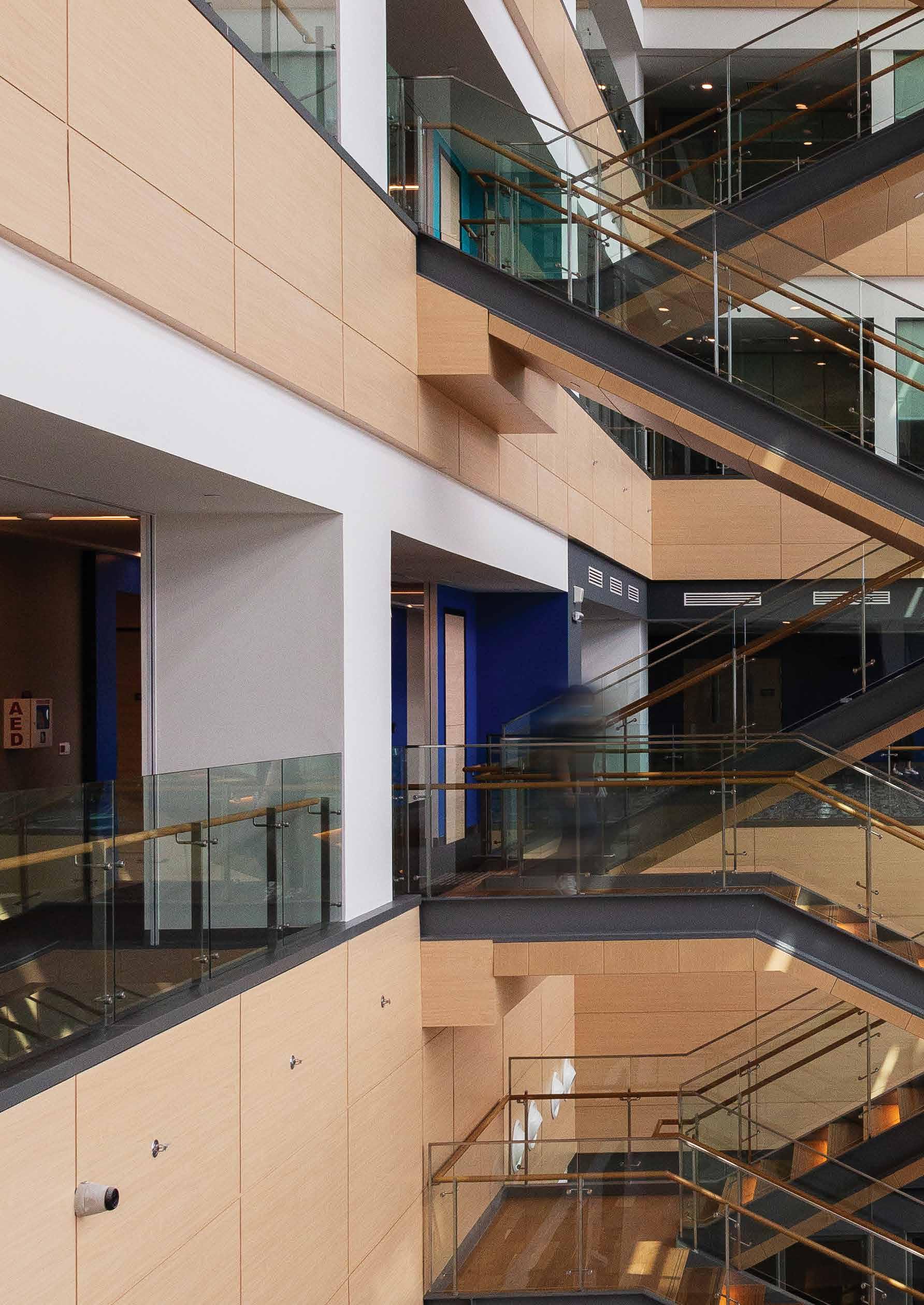
• $25 Million to Reduce Blindness
• Building Resilience through Mentoring
• CVS.AI: Keeping Your Heart Beating

CONNECTING FAMILY DOCTORS AND SPECIALIST CLINICS

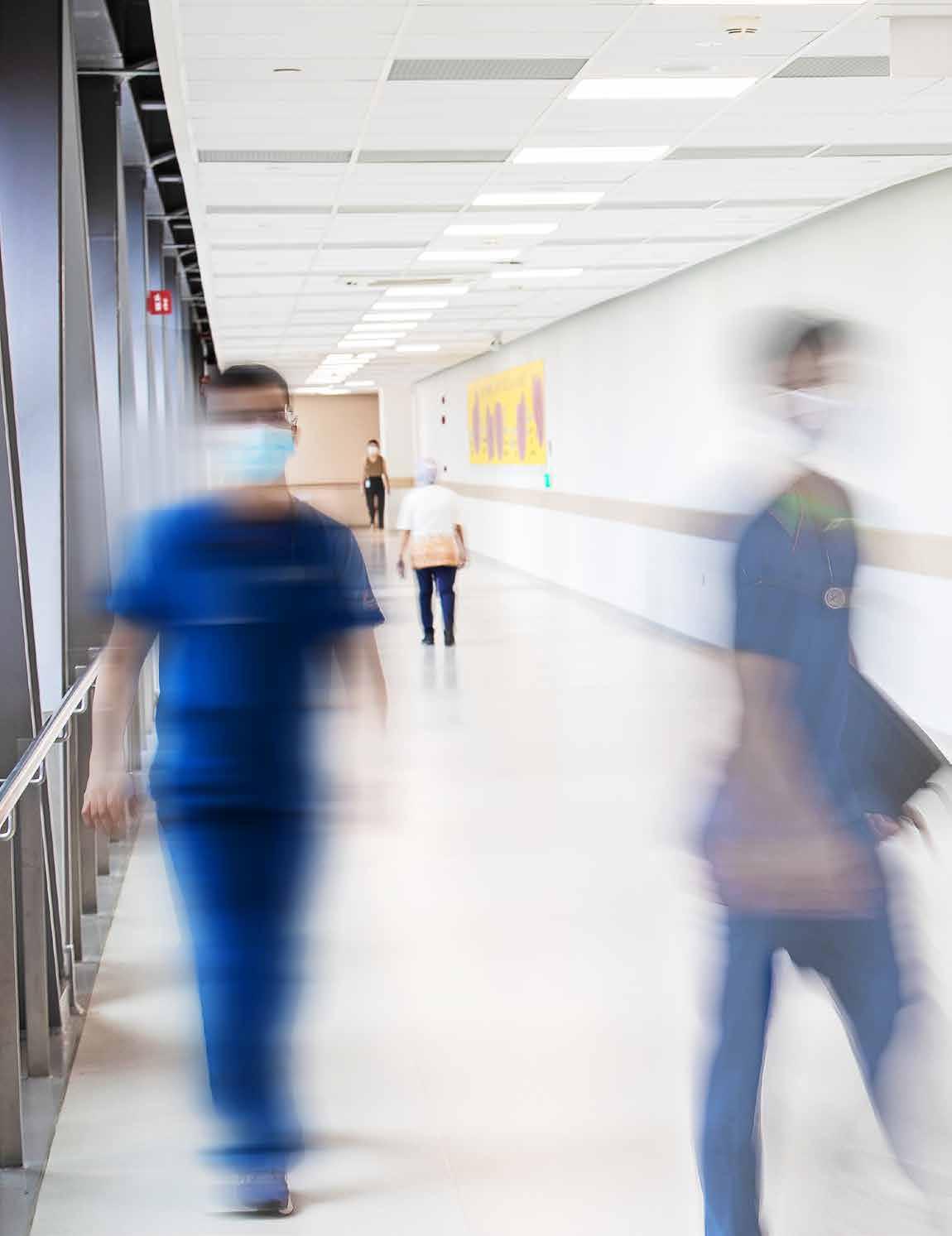
12 SingHealth Duke-NUS Academic Medical Centre
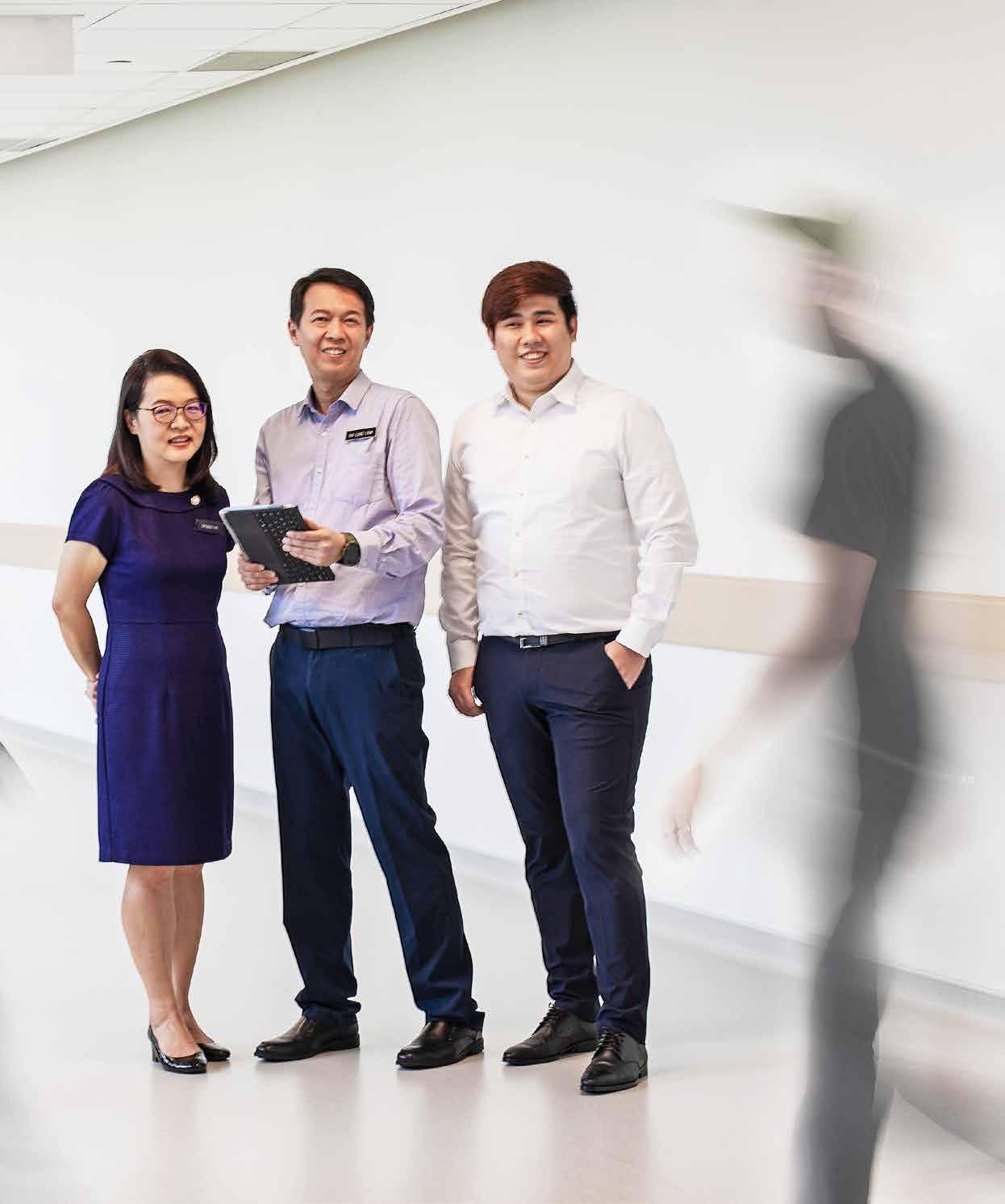
13 Annual Report 2022/2023
With Partners Buddy (PB) - a web-based platform that connects Specialist Outpatient Clinics (SOCs) and GPs - patients can expect to get their chronic medical conditions treated or managed more efficiently and comprehensively.
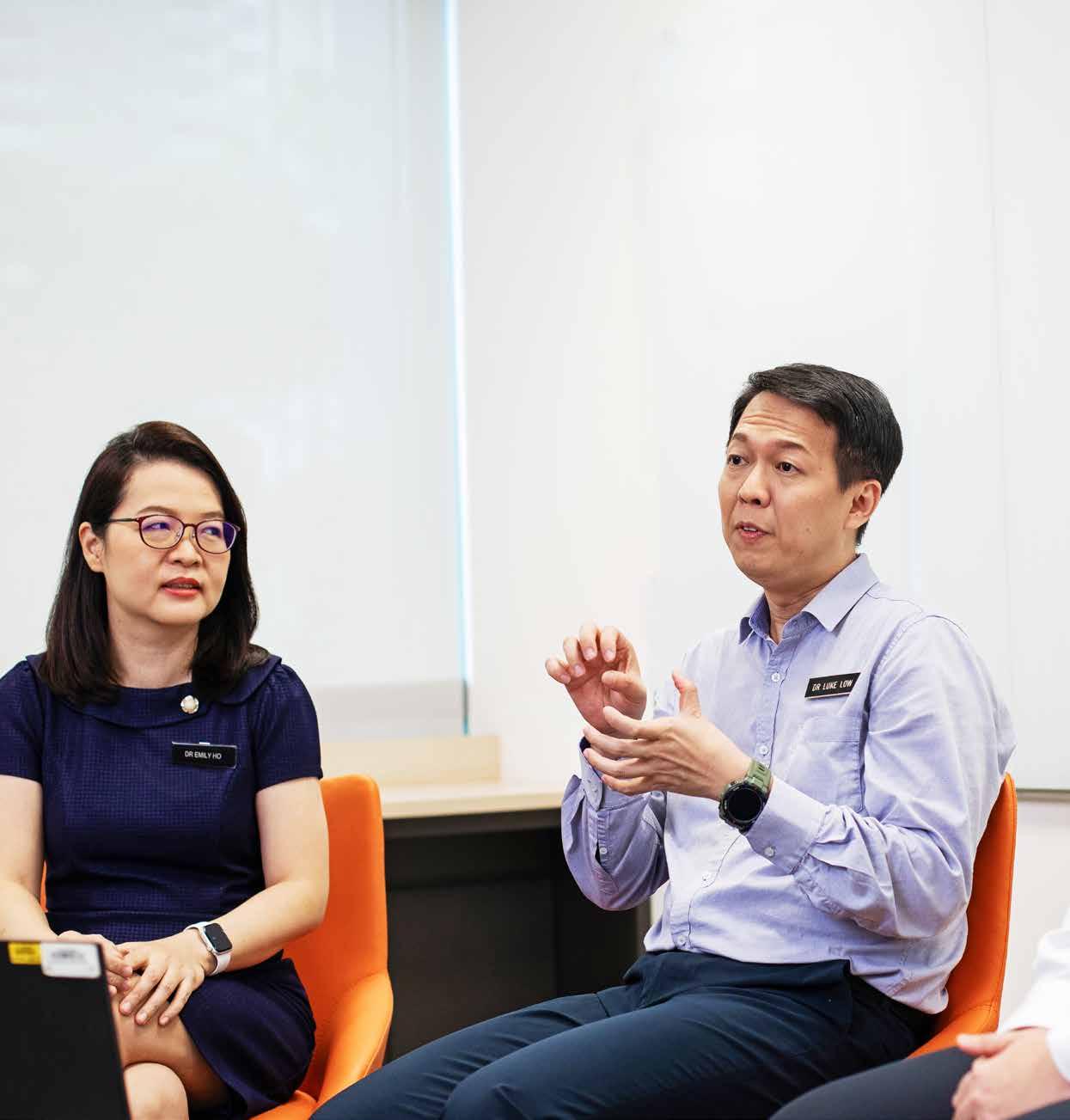
For a start, it addresses several gaps in appointment-making. “Making appointments was a tedious process that involved multiple parties,” explains Dr Luke Low, Medical Director, Sengkang Community Hospital (SKCH). “GPs did not have real-time visibility of available appointment slots at SOCs, so appointments had to be made through the call centres by phone or email. GPs also had to provide a hard-copy referral letter that patients must present during the appointment.”
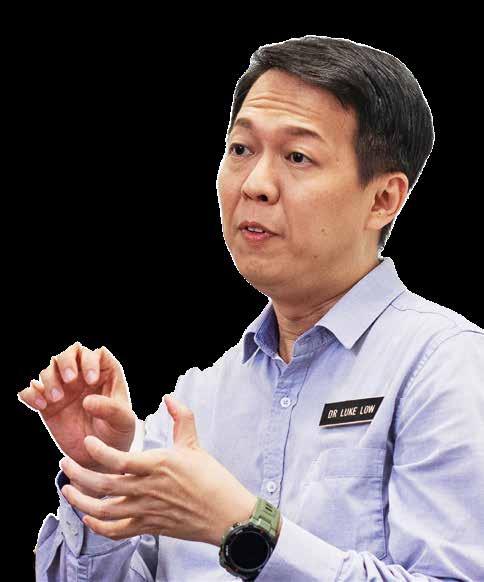
Digitising the booking of appointments not only empowers GPs, but patients can also schedule their appointments around other commitments such as work and childcare. More importantly, allowing GPs to make real-time appointments reduces the number of phone calls that Patient Service Associates at call centres have to pick up. This, in turn, frees up more time for associates to attend to patients instead of scheduling appointments.
Capturing essential documentation and communication between GPs and SOCs and preserving clinical notes into PB allows the hospital healthcare team to view them easily and quickly. Dr Emily Ho, Senior Consultant, Endocrinology, SGH, who sees patients with diabetes, says: “Pen and paper can be messy or misplaced; with an electronic referral system, however, there is no worry about loss of information or miscommunication.”
Partners Buddy digitises patient appointment referrals and shares clinical information. This strengthens the relationship among hospitals, SOCs, tertiary care services, and primary care partners such as GPs. Partners Buddy ensures the continuity of care during a patient’s journey to recovery.
Dr Luke Low
14 SingHealth Duke-NUS Academic Medical Centre
Medical Director, SKCH; Deputy Chief Executive Officer (DCEO) (Clinical Services) (Designate) and Chief Medical Informatics Officer, SingHealth Community Hospitals (SCH); Deputy Group Chief Medical Informatics Officer (Continuing Care), SingHealth
“PB also enables the specialist to update and communicate a patient’s condition and plan with the GP anytime. It promotes better team care and improves treatment outcomes,” adds Dr Ho, who is also Director, Clinical Networks, Population Health and Integrated Care Office (PHICO), SGH.
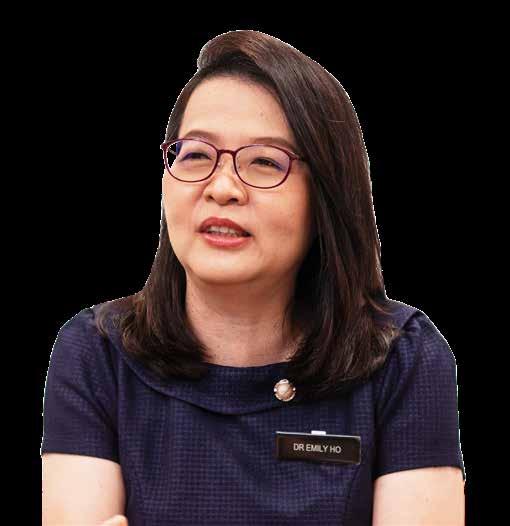
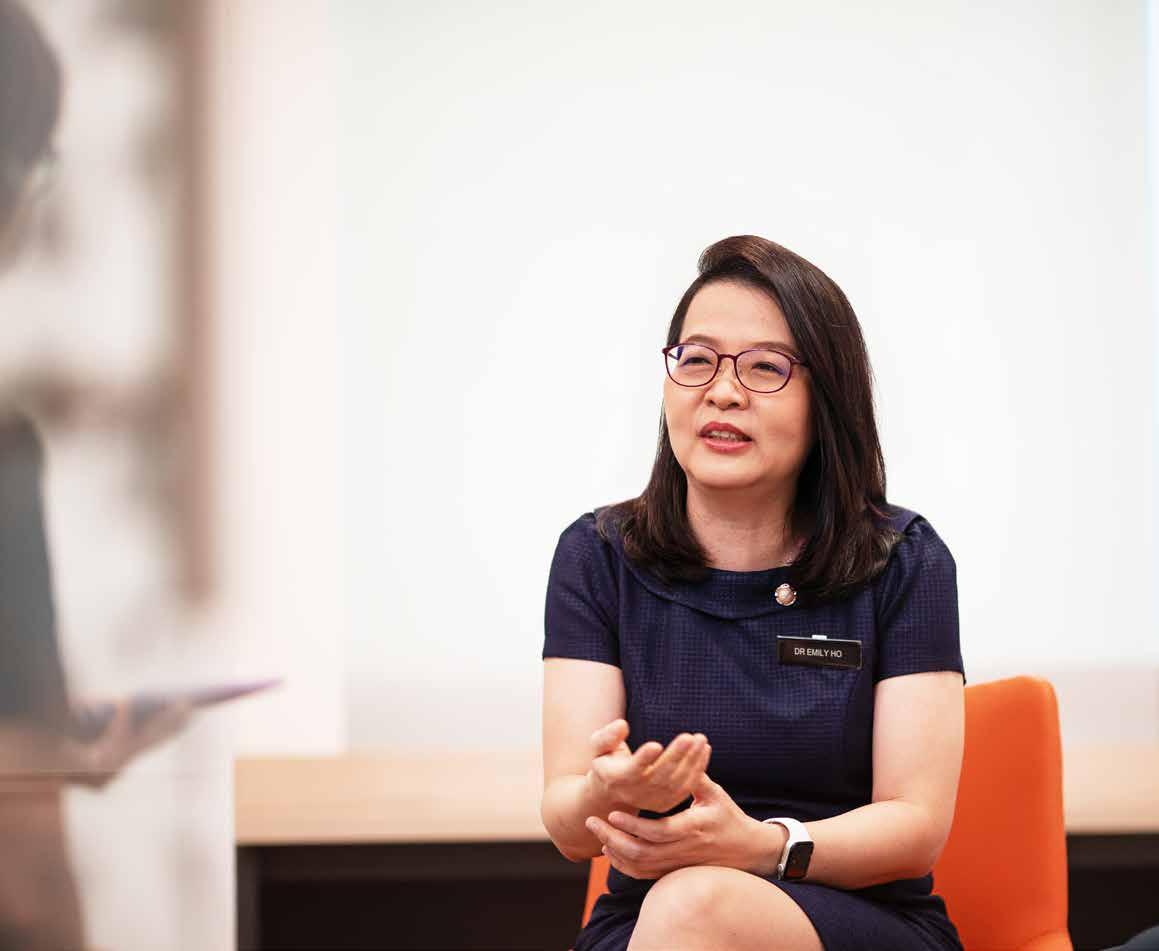
PB took two years to develop from conception to implementation. For Mr Justin Yeo, Assistant Team Lead Analyst, Synapxe, the challenge was primarily on managing and aligning different project requirements and workflows of the eight SingHealth institutions that will use the platform. “For the platform to work well, we focused on integrating these into a holistic approach,” he says.
Between March and May 2023, nearly 120 GP clinics were onboarded. Familiarising users with PB’s features was critical. “Before we started designing the platform, we spoke with GPs and SOCs to understand their existing and future needs. This was important to ensure that using PB would not disrupt their workflow but enhance it. We also made the platform intuitive and easy to use,” he says.
Initial reactions were mixed, notes Dr Low. “Some GPs are more IT-savvy so they see the value of making appointments directly through the platform. It was more challenging to sell the idea to more traditional GPs, who remain paper-based. But with Healthier SG shifting the centre of gravity towards preventive care, we see GPs playing a bigger role in the healthcare system, hence PB will help to close the loop.”
It is crucial for specialists in a tertiary hospital to forge strong partnerships with GPs, who care for patients in the community. Partners Buddy allows us to communicate seamlessly and work better together as a team to benefit the patients.
Dr Emily Ho
15 Annual Report 2022/2023
Senior Consultant, Endocrinology, SGH; Director, Clinical Networks, PHICO, SGH
For Dr Lee Tzu Hooi, a GP at Clifford Dispensary, how well PB works depends primarily on how comfortable one is with technology. “I found it relatively easy to use, but I also took a bit of time to get used to it. There were some teething issues I experienced - for example, I couldn’t find a patient’s FIN number in the system; or, I couldn’t get an available appointment - which were resolved over time,” he says.
PB does not necessarily mean patients can get an appointment the same day - essentially, it means patients can get an appointment that fits their schedules. Dr Lee describes it thus: “With this, healthcare becomes more patient-centric, unlike previously, where appointments are based on doctor’s availability.”
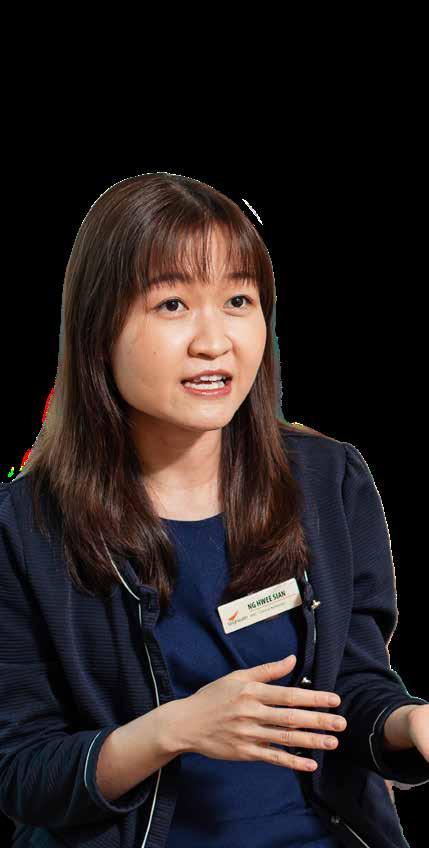


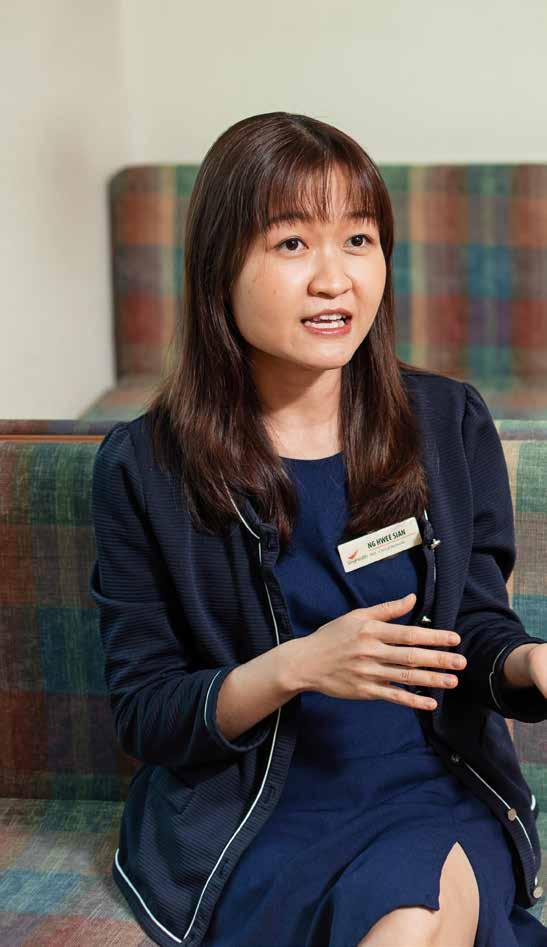
With Partners Buddy, patients and GPs can look forward to faster and more efficient booking of appointments at socs. GPs can also access and track updates through the platform.
Dr Lee Tzu Hooi
16 SingHealth Duke-NUS Academic Medical Centre
GP, Clifford Dispensary
He is excited about the upgrades: “Communication is one-way now - only specialists can reply to GPs. In future, it will be two-way so GPs can clarify instructions or observations.”

Working tirelessly to ensure that GPs and SOCs are maximising the benefits of PB is PHICO, which oversees care integration programmes that benefit patients. Ms Ng Hwee Sian, Assistant Manager, is part of the team that refers stabilised patients from SOCs to GPs for right-siting.
She highlights that “PB allows Right-Siting Officers to support the seamless transition of patients back to GPs for continued care, when their conditions are stabilised and they can be discharged from the SOCs.”
Partners Buddy allows SOCs to access GPs’ referral notes and arrange relevant scans or tests ahead of patients’ appointments. This saves patients additional hospital visits.
Ms Ng Hwee Sian Assistant Manager, PHICO, SGH
And responses from specialists have been encouraging. She explains, “Many of them have been replying to GPs on their patients’ conditions. Some of them have even offered to include their email addresses for further discussion.”
There’s more work to be done on PB. Dr Low says it is being upgraded with document sharing capabilities. Other plans include integrating it with the Community Health Assist Scheme (CHAS), Smart GP Content Management System, and Community Nursing programmes by Healthier SG.
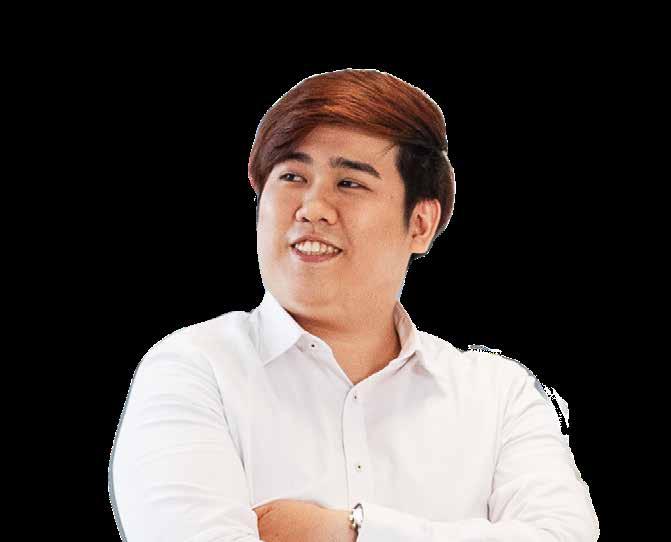
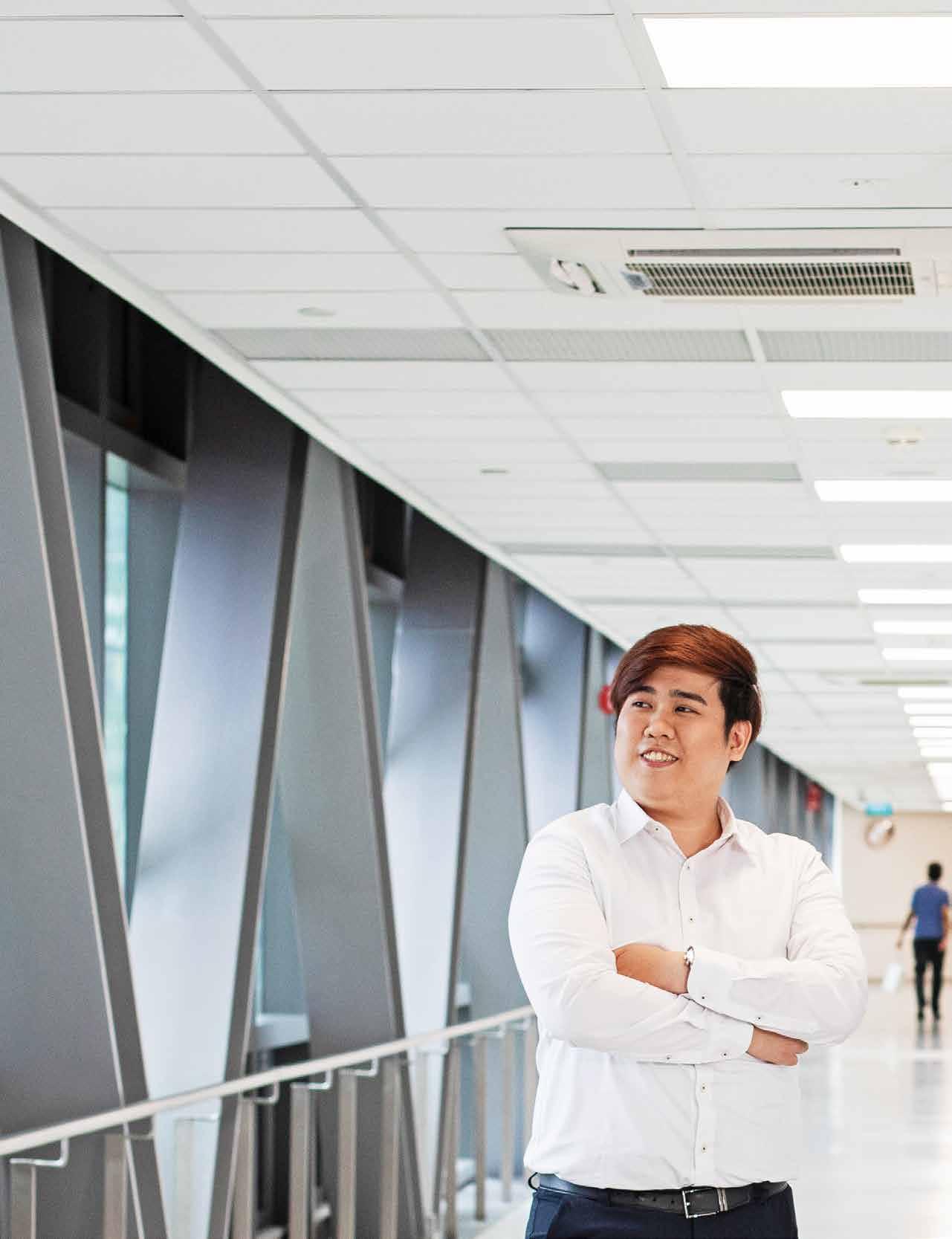
We designed Partners Buddy to be intuitive and user-friendly, after understanding their existing and future needs.
Mr Justin Yeo Assistant Team Lead Analyst, Synapxe
17 Annual Report 2022/2023
TARGETING CANCER CELLS WITH PROTON BEAM THERAPY
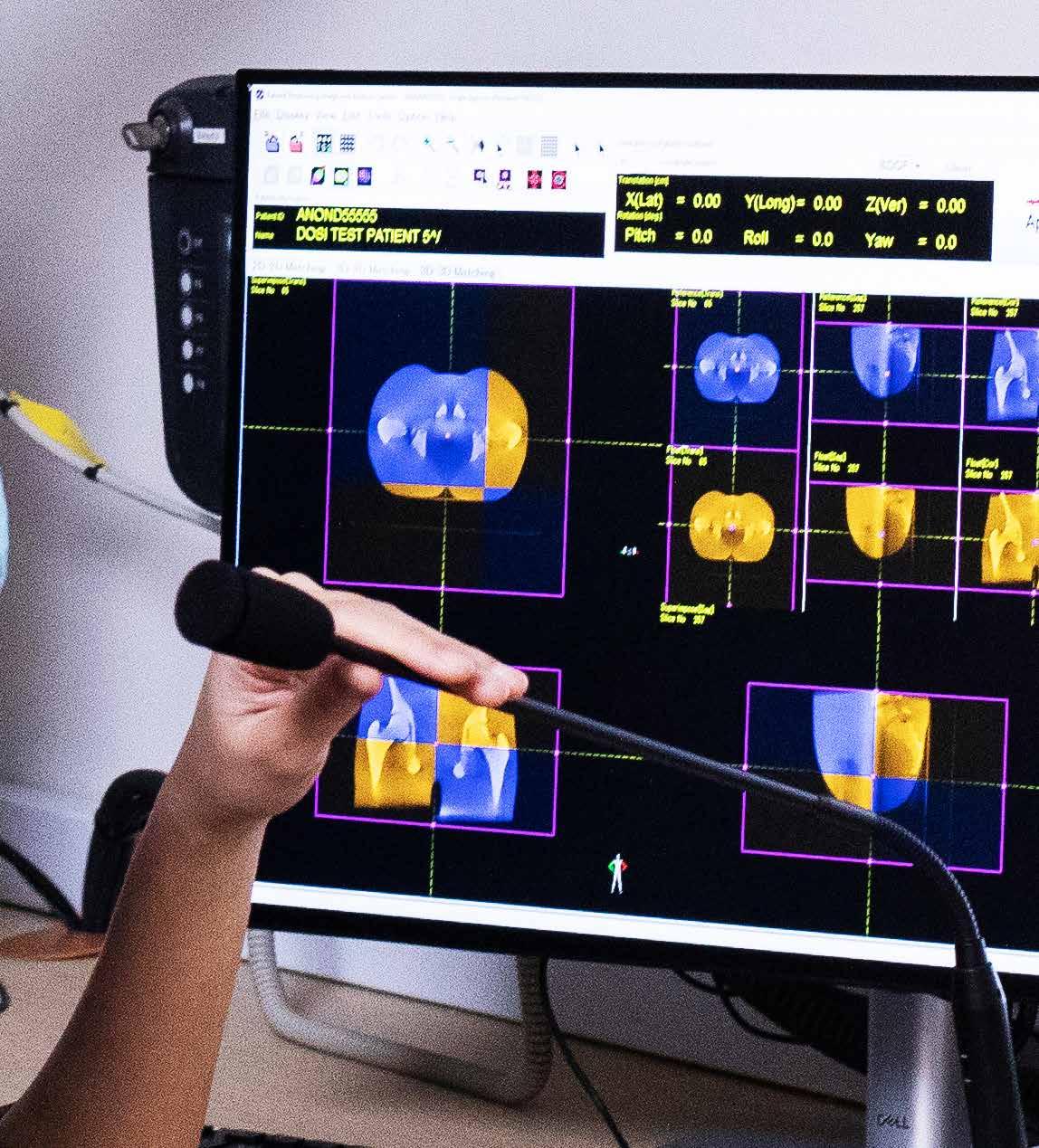
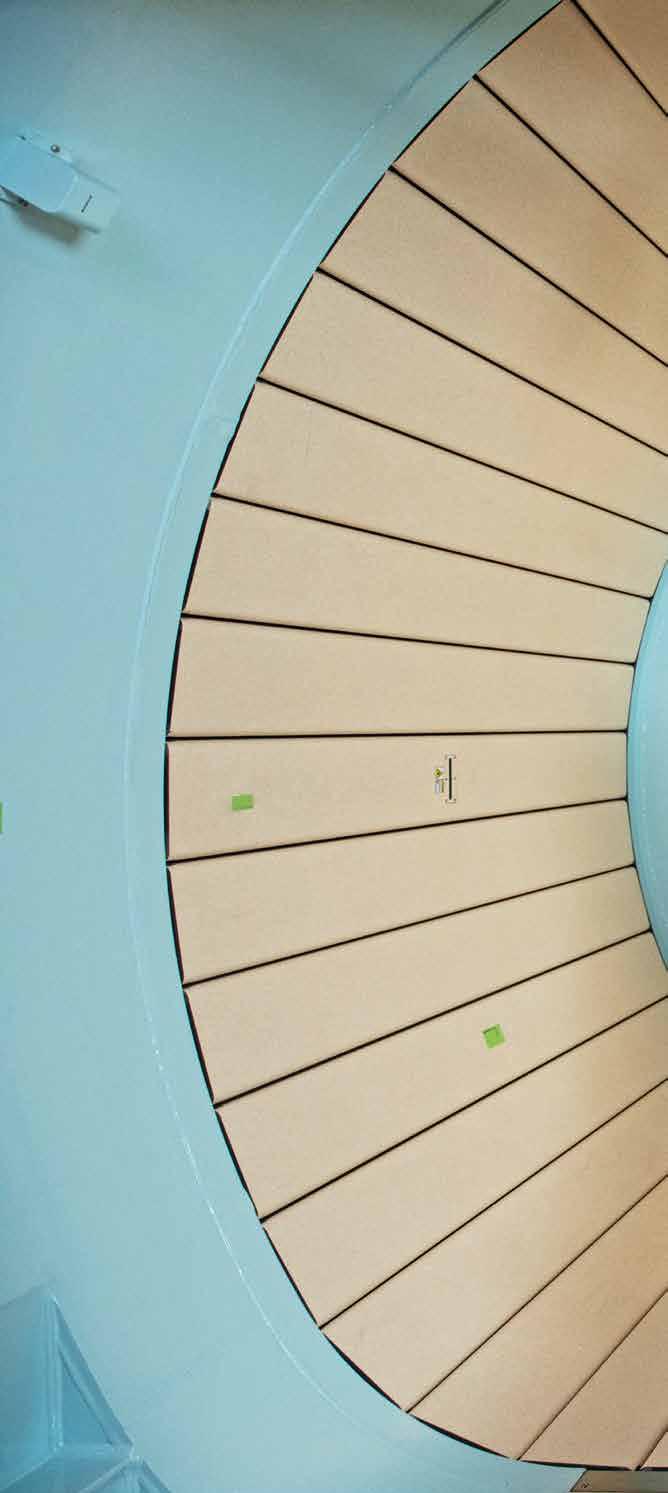
18 SingHealth Duke-NUS Academic Medical Centre
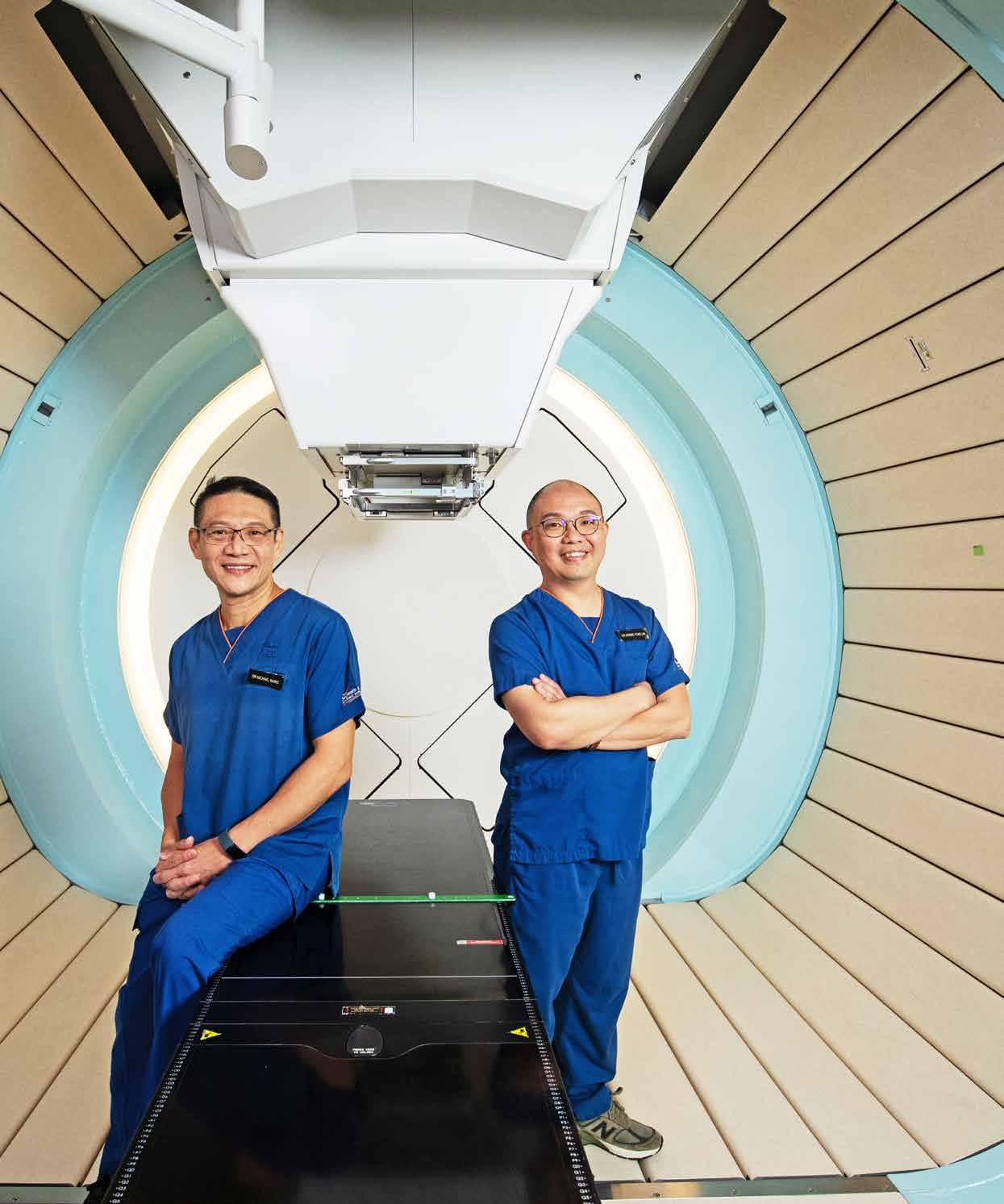
19 Annual Report 2022/2023
Cancer affects one in four people in Singapore and nearly 40 per cent of patients are aged above 70 years old. The incidence of cancer is rising with more than 80,000 new cases between 2016 and 2020, and more expected in the years ahead. Fortunately, cancer can be managed and survival rates have increased by nearly 75 per cent, thanks to early detection and new treatment options.
Leading the charge to improve cancer care for patients is NCCS, which receives more than 160,000 visits every year. It is the first and only public healthcare institution to offer proton beam therapy, an advanced radiation treatment.
Proton beam therapy targets cancer cells using high-energy, positively charged subatomic particles known as protons, explains Clinical Associate Professor Michael Wang, Lead Programme Director of Proton Therapy Project and Chairman of the Division of Radiation Oncology, NCCS.
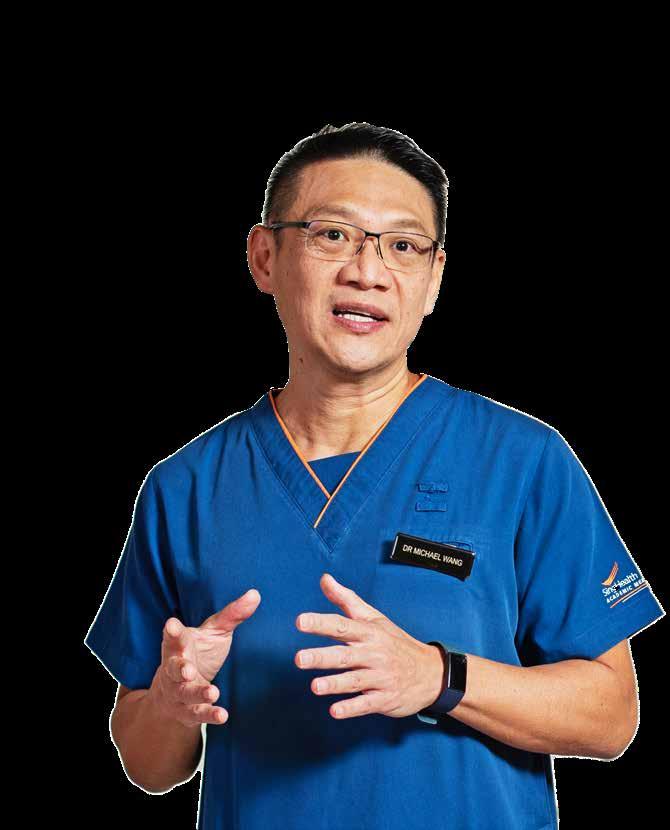
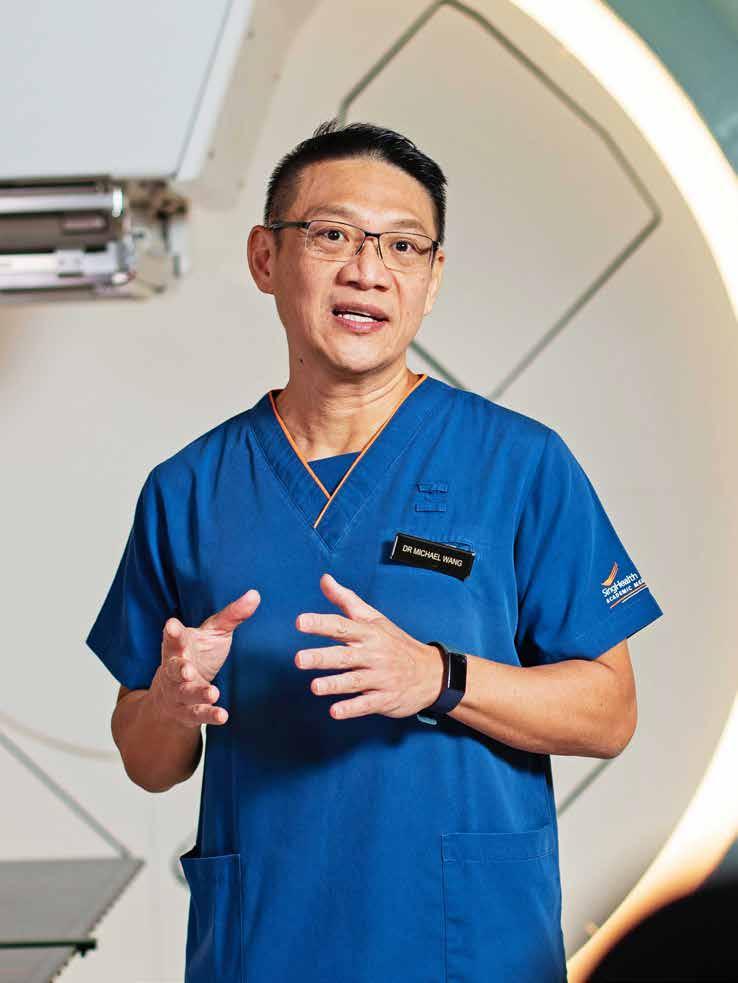
“The unique physical properties of protons allow the radiation energy of the proton particle to be precisely deposited in the tumour. As the healthy tissues surrounding the tumour receive minimal or no radiation, there is less collateral damage, hence side effects are minimised,” he continues.
In comparison, traditional radiotherapy uses X-rays (or photons) to treat tumours. X-rays penetrate the patient’s body from one end to another. During this process, some radiation may affect nearby healthy tissues, causing side effects such as dry mouth or nerve damage leading to visual impairment and in some cases, secondary cancers later in life.
Proton beam therapy is available at the Goh Cheng Liang Proton Therapy Centre, located at the basement of NCCS’ new 92,000sqm premises. Staffed by a multi-disciplinary team, the Goh Cheng Liang Proton Therapy Centre was established with a generous donation of $50 million from the Goh Foundation.
We hope to not only cure patients but also enable them to continue living a full and productive life post-treatment.
Cl Assoc Prof Michael Wang
Lead Programme Director, Proton Therapy Project; Chairman, Division of Radiation Oncology, NCCS
20 SingHealth Duke-NUS Academic Medical Centre
The Centre houses a proton facility with four full rotating treatment gantries and a fixed beam room. During treatment, the patient lies on a robotic couch as the gantry rotates 360 degrees, allowing the proton beam to be aimed directly at the cancer cells. The proton facility is the only one in Singapore with four gantries; this allows treatment to continue smoothly between one patient and another with less downtime between appointments.
“Proton beam therapy is ideal for cancers in sensitive parts of the body such as the brain, or near the eye or spinal cord, due to its high degree of precision,” says CI Assoc Prof Soong Yoke Lim, Deputy Chairman, Division of Radiation Oncology, and Director, Division of Cancer Education.
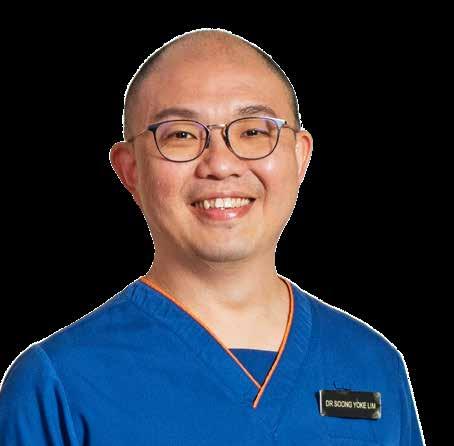
Before proton beam therapy was approved in Singapore, patients had to seek treatment overseas such as in South Korea and Taiwan.
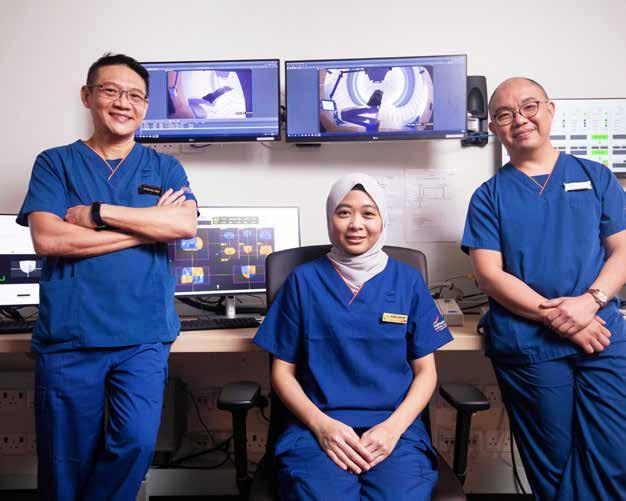
The team had to undergo training to offer this advanced new treatment. “We established strong links with reputable academic hospitals that already had proton therapy such as the Hospital of the University of Pennsylvania and Mayo Clinic. They generously hosted our staff for necessary training and provided helpful technical advice on the project,” says Cl Assoc Prof Soong.
With more patients treated at the Goh Cheng Liang Proton Therapy Centre, the data collected will help potentially extend the use of proton beam therapy to treat more cancers in the future. Moreover, with support from other
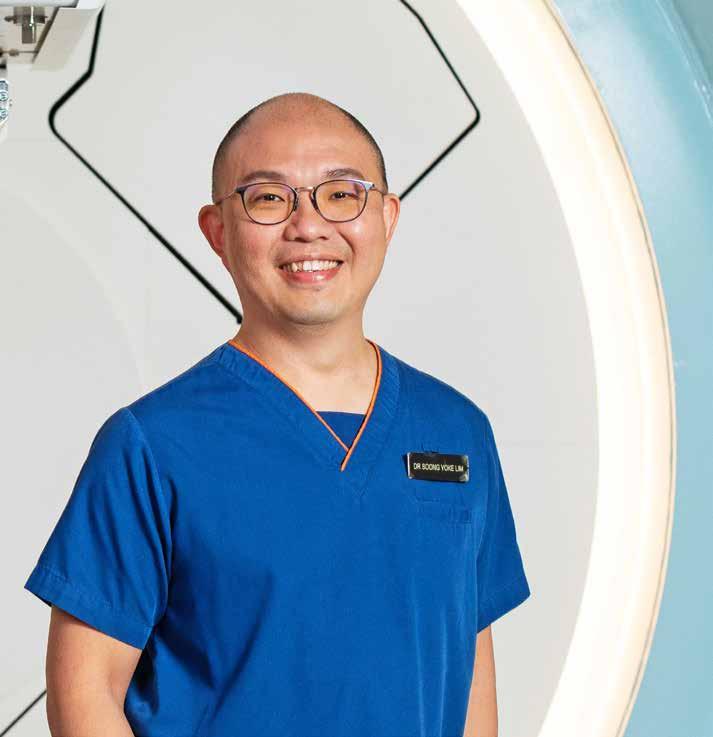
specialists across the SingHealth cluster, proton beam therapy also allows for cross- and multidisciplinary collaborations to ensure treatments are evidence-based and adhere to the latest clinical guidelines.
“Our priority is to ensure the best treatment outcomes for our patients. Proton beam therapy is an innovative technology, so we work closely with the regulators to ensure that it is offered only for approved indications,” Cl Assoc Prof Wang says. “We hope to not only cure patients but also enable them to continue living full and productive lives post-treatment.”
Cl Assoc
Director, Division of Cancer Education; Deputy Chairman, Division of Radiation Oncology, NCCS
With this facility, up to 770 patients can be treated at NCCS with proton beam therapy.
Prof Soong Yoke Lim
21 Annual Report 2022/2023
$25 MILLION TO REDUCE BLINDNESS
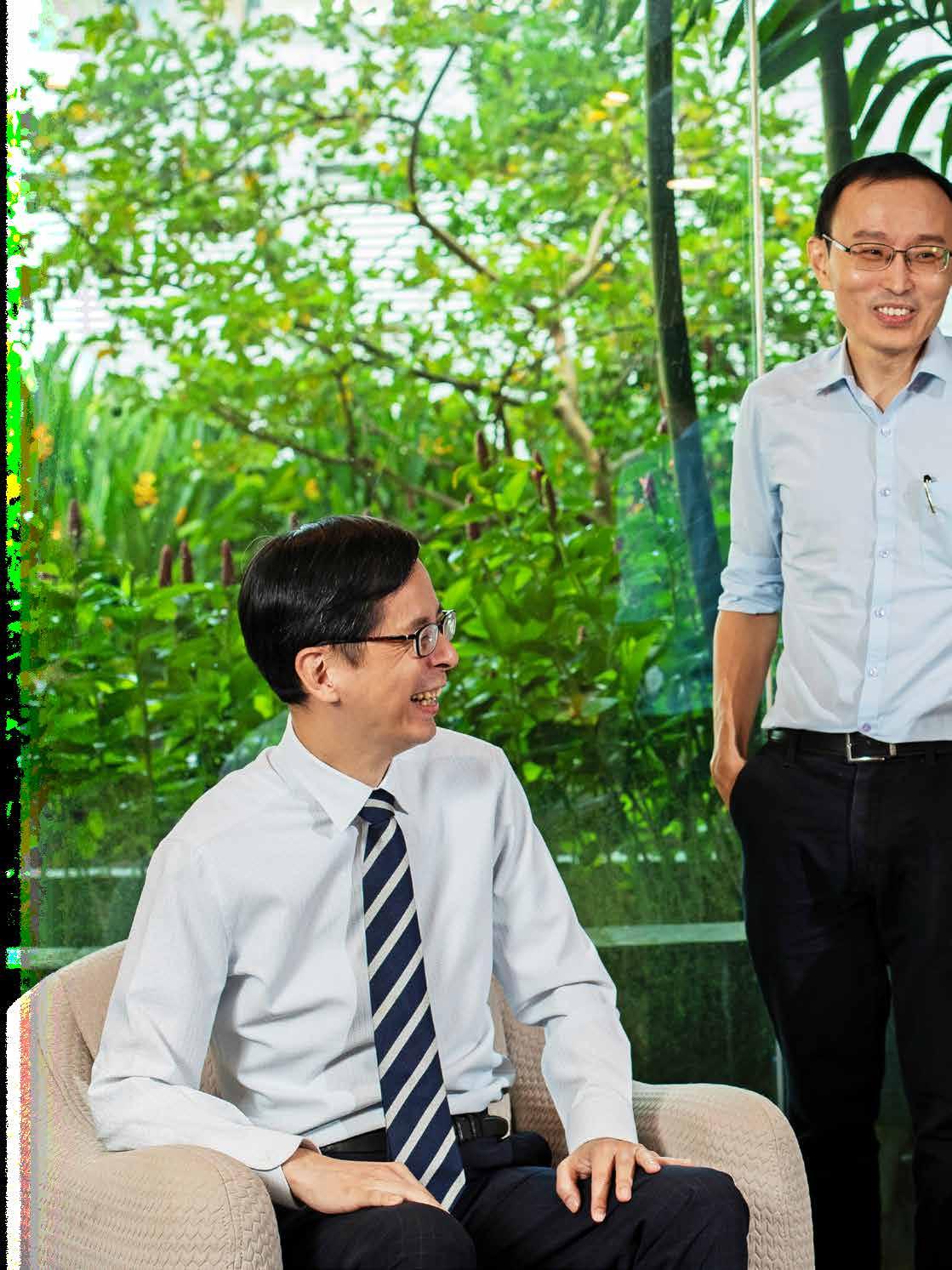
22 SingHealth Duke-NUS Academic Medical Centre

23 Annual Report 2022/2023
By 2040, more than 110 million people worldwide will have glaucoma. The condition occurs when pressure builds up in the eye, and damages the optic nerve that sends visual information to the brain. Nearly 20 per cent of patients with glaucoma eventually lose their sight.
Many people are not aware that they have glaucoma, which initially affects only peripheral vision and gradually results in tunnel vision. As such it often goes unnoticed, compared to other conditions like cataract, which usually affects the central vision. It is irreversible, unpreventable, and incurable. But it is controllable.

Prof Aung Tin, Chief Executive Officer (CEO), SNEC, is spearheading an initiative called TAckling & Reducing Glaucoma Blindness with Emerging Technologies (TARGET). This five-year programme seeks to bring down the rate of blindness caused by glaucoma in Singapore in the next 10 years. Last October, it received a $25 million grant from the MOH’s National Medical Research Council.
TARGET, which takes a multi-disciplinary, multi-pronged approach, pulls together researchers, clinicians and scientists from across SNEC, National University Health System, Duke-NUS, Agency for Science, Technology and Research (A*STAR), Nanyang Technological University, and CGH.
Prof Tina Wong, Head & Senior Consultant, Department of Glaucoma, SNEC, says the team has its sights cast on scaling its work worldwide. “We hope that our work can benefit glaucoma patients both in and outside of Singapore. It should be for everyone,” she adds.
Prof Aung especially appreciates the multi-disciplinary approach of TARGET. “We need to work together as a team to help patients improve outcomes as well as quality of life,” he says. “In order to deepen our understanding and prove our hypotheses, we require different contributions, perspectives, methods and technologies. That way, we can progress together.”
THEME 1
Understanding the Pathobiology of Glaucoma using a Precision Medicine Approach
Led by Prof Aung Tin and Adj Prof Khor Chiea Chuen
This theme identifies glaucoma risk, especially cases that cause blindness. The team uses whole-exome sequencing and functional genomics studies to examine alterations in critical proteins and how these can worsen glaucoma.
TARGET ADOPTS A UNIFIED APPROACH WITH FIVE BROAD THEMES
24 SingHealth Duke-NUS Academic Medical Centre
With SNEC and SERI ranking second in the world for glaucoma research, Singapore is an ideal place to advance glaucoma research. We hope that our research for TARGET can lead to improved patient care and cost savings for healthcare systems, not just in Singapore but also in the region and beyond.
Prof Aung Tin
CEO & Senior Consultant, SNEC; Group Director, Research (Scientific), SingHealth; Academic Chair, SingHealth Duke-NUS Ophthalmology and Visual Sciences Academic Clinical Programme (ACP)
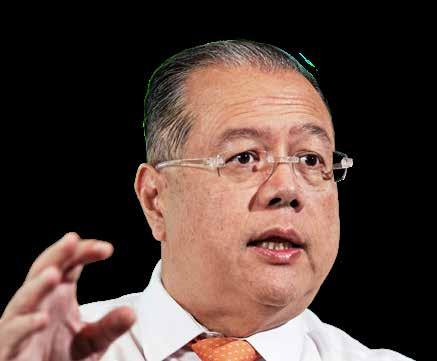
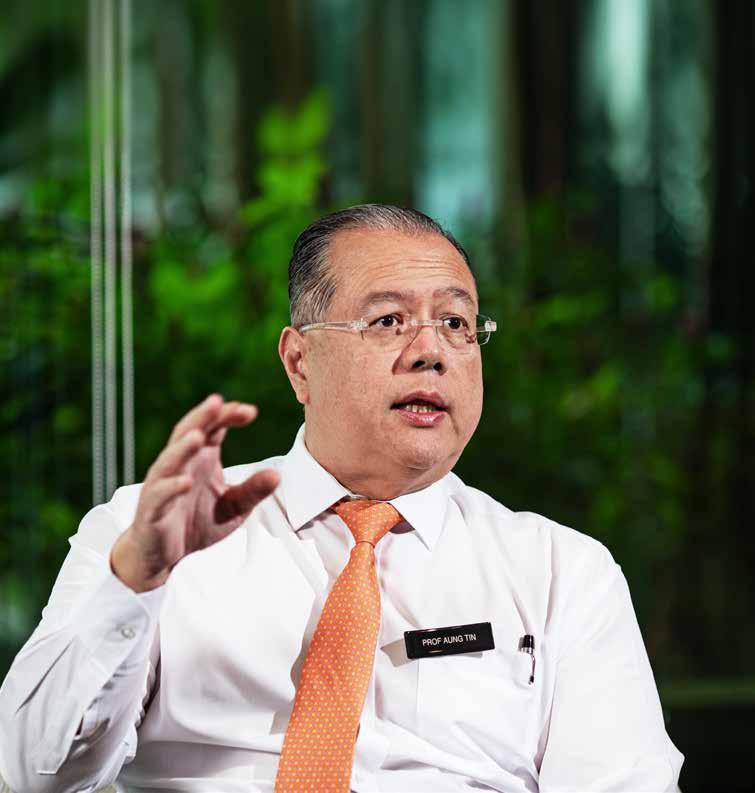
There is a strong suspicion that glaucoma is associated with genetics. So by studying DNA data from both people with glaucoma and without, we hope to be able to predict who are more susceptible and how severe. It will also enable us to develop new treatments.
Adj Prof Khor Chiea Chuen Senior Group Leader, Laboratory Of Complex Disease Genetics, Genome Institute of Singapore
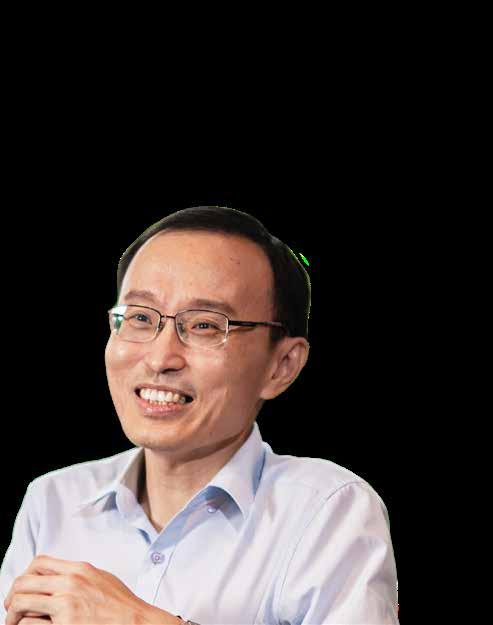
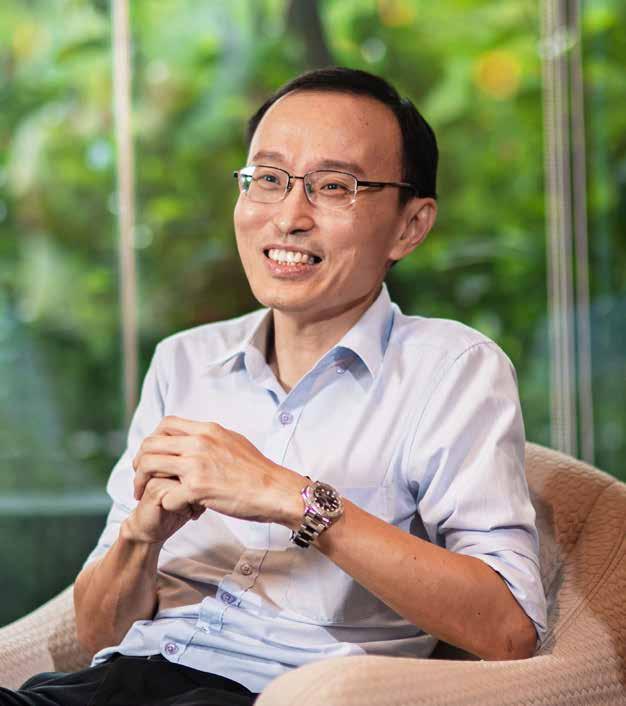
25 Annual Report 2022/2023
THEME 2
New Technologies to Screen Undiagnosed Glaucoma and Monitor the Disease in the Community

Led by Prof Cheng Ching-Yu and Dr Rachel Chong
With the purpose of developing more effective community-based screening strategies to diagnose early-stage glaucoma, the team harnesses state-of-the-art deep-learning AI to detect both angle-closure and open angle glaucoma from ocular images. By enabling non-specialists to use the technology, it also scales up screening and monitoring.
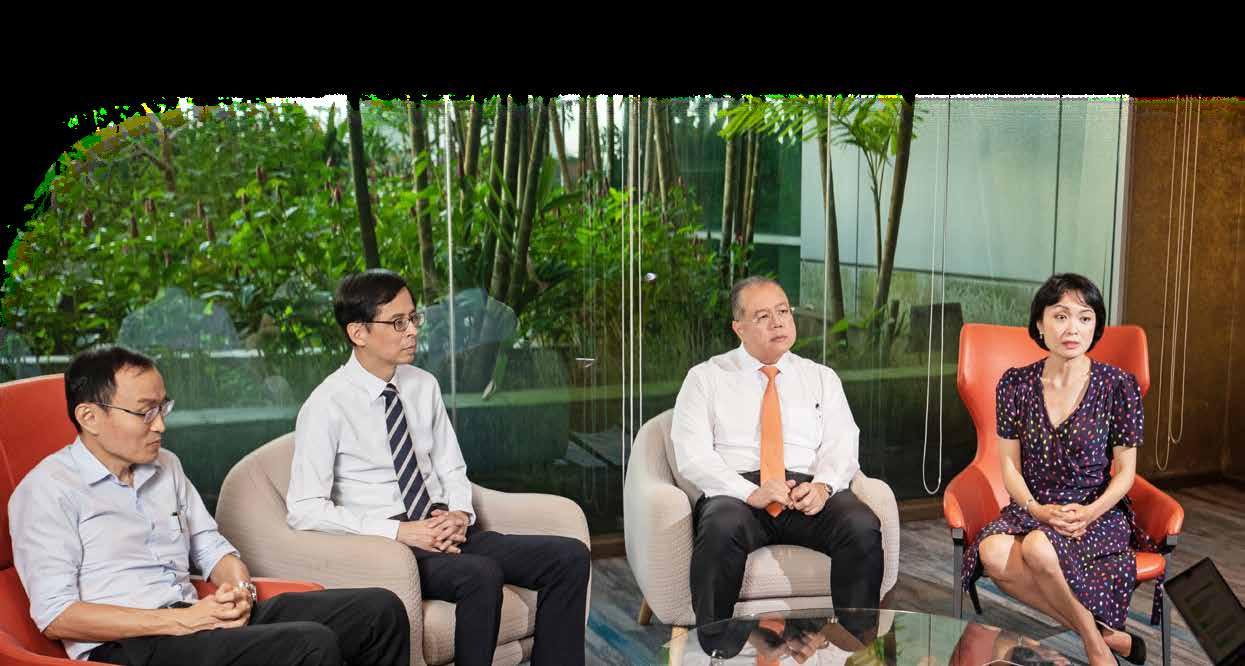
26 SingHealth Duke-NUS Academic Medical Centre
Glaucoma has few or no symptoms, hence many cases go undiagnosed until it’s too late. Using deep-learning AI to screen for angle-closure and open angle glaucoma from ocular images, we can introduce more effective screening strategies in the community.
Prof Cheng Ching-Yu Senior Clinician Scientist, Department Of Glaucoma, SNEC
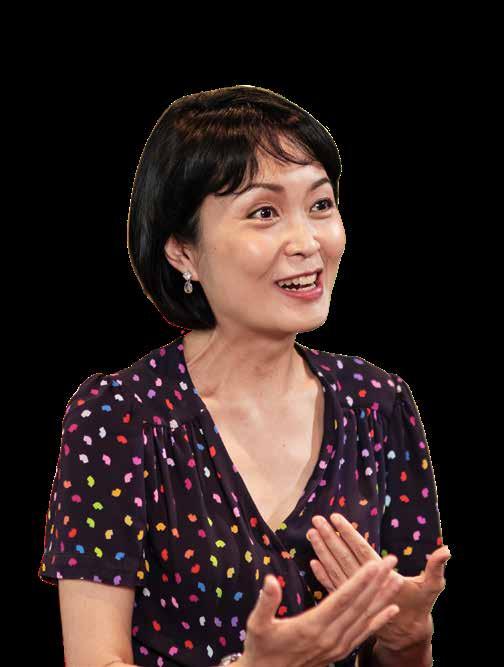
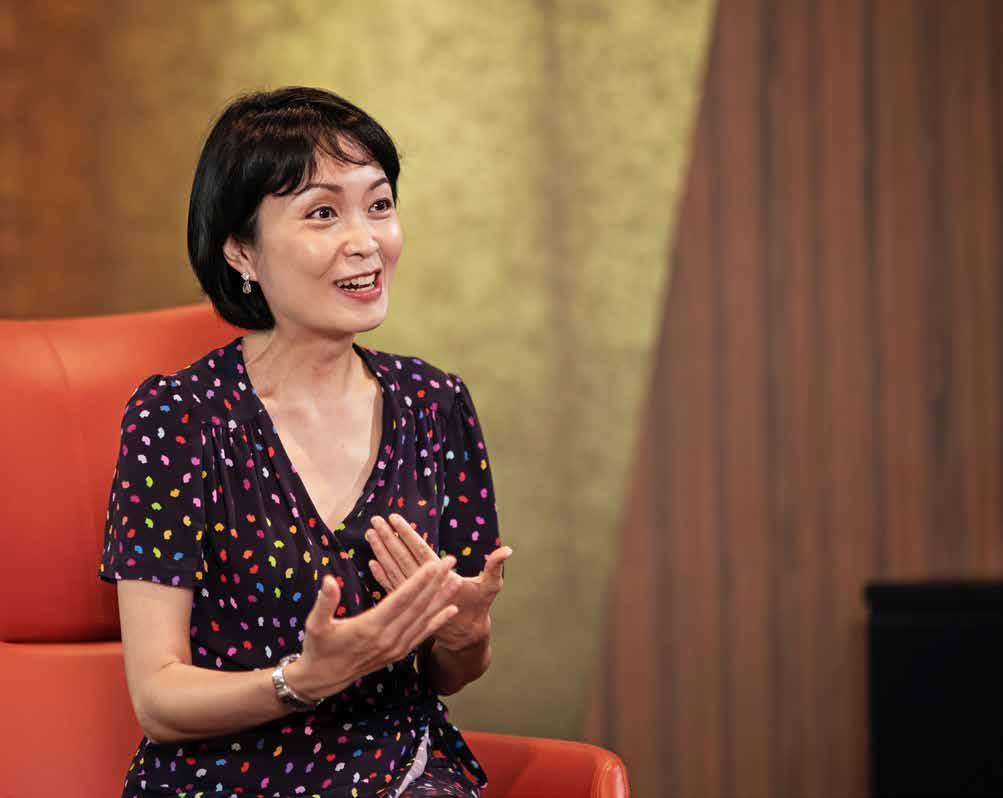

projected to affect 111.8 million people worldwide, so we are looking at using technology to make screening and diagnosis more efficient and accurate. This allows clinicians to prioritise time and attention on patients with more severe
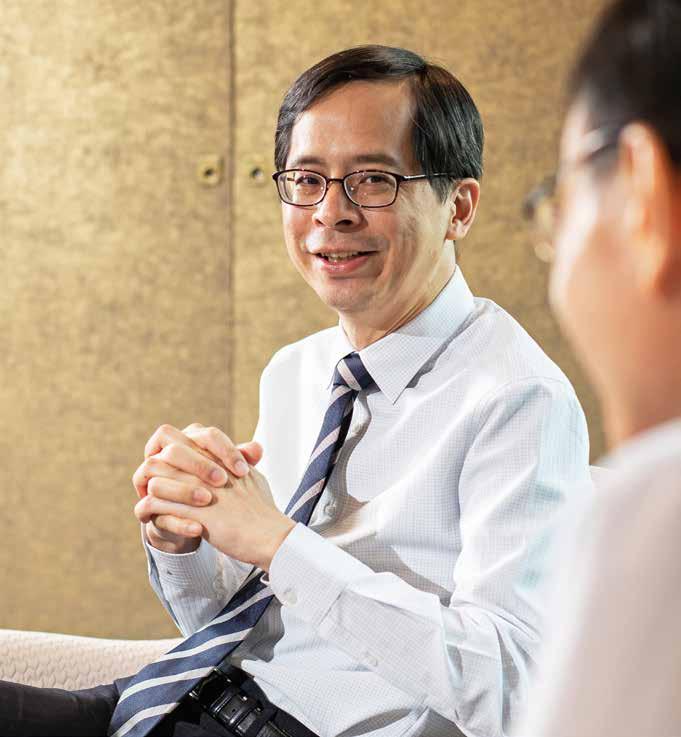
27 Annual Report 2022/2023
THEME 3

New Technologies to Better Identify Rapid Progressors


Led by Prof Leopold Schmetterer and Assoc Prof Michael Girard
Both will develop and deploy hardware and software to enhance detection of disease progression. These state-of-the-art technologies - including 3D AI, visual and biomechanical tests, “digital-twin” models (i.e. computer models of your eyes used to optimise health outcomes and treatment strategies), and next-generation imaging hardware - will help us predict which patients will go blind from glaucoma and how fast it occurs.
28 SingHealth Duke-NUS Academic Medical Centre
Whether patients lose their vision or how quickly it happens is different individually. Being able to detect disease progression allows us to identify patients with highest risk of blindness, and work with clinicians to adjust treatment options.
 Prof Leopold Schmetterer Scientific Director & Head of Ocular Imaging, Singapore Eye Research Institute (SERI)
Prof Leopold Schmetterer Scientific Director & Head of Ocular Imaging, Singapore Eye Research Institute (SERI)

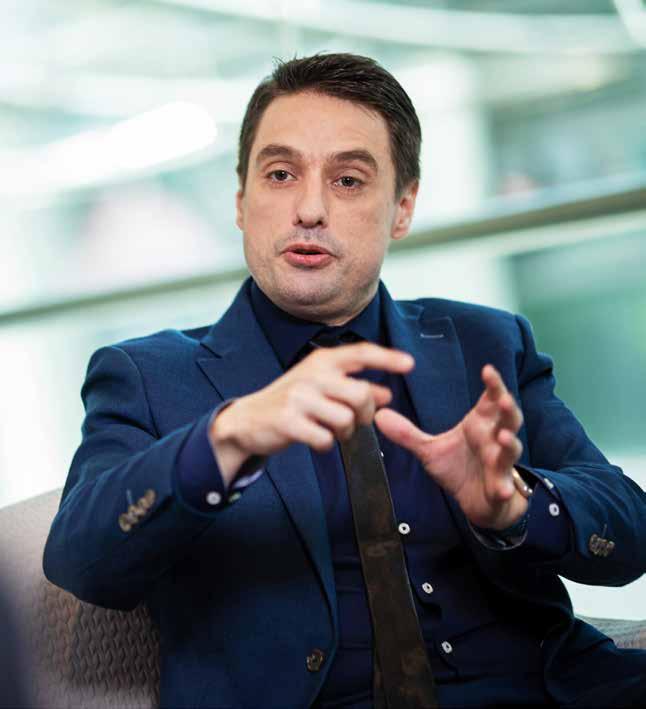
AI will allow us to understand the complex physics of the eye using large datasets such as 3D eye images from thousands of patients that will be collected over the next five years. Such information will be critical to predict progression and personalise treatment. We don’t just focus on local data but also foreign, so as to ensure that findings are applicable to diverse populations of glaucoma patients.
Assoc Prof Michael Girard
 Head, Opthalmic Engineering & Innovation Laboratory, SERI
Head, Opthalmic Engineering & Innovation Laboratory, SERI
29 Annual Report 2022/2023
New Technologies to Circumvent Poor Adherence
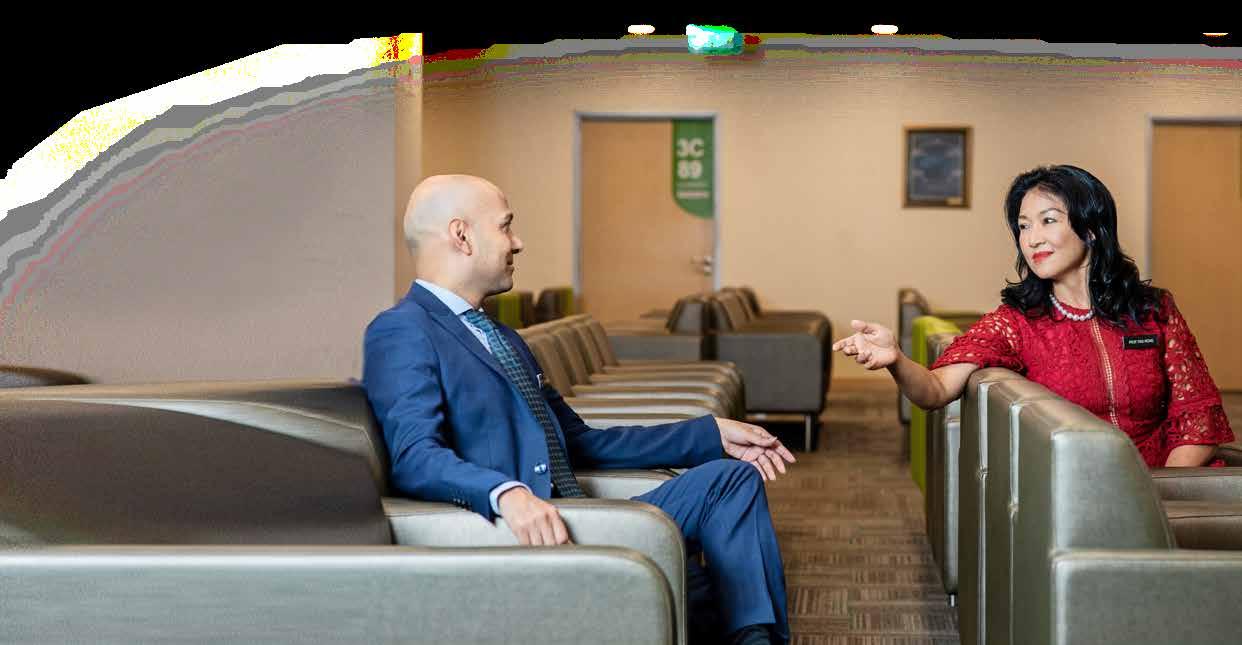

Led by Prof Tina Wong and Assoc Prof Shamira Perera
To overcome the extremely poor adherence of eye drop medications by patients - which can worsen or hasten vision loss - the researchers are working on three alternative options. The first is an eye drop medication that improves patient adherence; through a nanoparticle system, it ensures sustained delivery of drugs to reduce intraocular pressure and address glaucoma.
Micro invasive trabeculotomy (MINT), meanwhile, is a surgery that reduces intraocular pressure. By removing the openings in the trabecular meshwork (which is the tissue in the front part of the eye between the cornea and iris), it improves drainage of the aqueous humour fluid, thereby reducing pressure build-up in the eye. It requires no implant and does not damage the iris or cornea.
Finally, Directive Selective Laser Trabeculoplasty (DSLT) treats the entire circumference of the trabecular meshwork in just one second - simply by firing a laser at the problem site.
THEME
30 SingHealth Duke-NUS Academic Medical Centre
4
One of the technologies that we are working on is MINT. It is a homegrown SERI technology that minimises damage to the iris or cornea. It is safe and easy to use, and results last longer.
Assoc Prof Shamira Perera Senior Consultant, Department of Glaucoma, SNEC
It’s been reported that more than 65 per cent of glaucoma patients consistently forget to take their eye drops, and this can hasten onset of blindness. By developing alternative treatment options such as MINT, DSLT, and oral medication, our work can help free patients from the hassle of medical management and improve their quality of life.
 Prof Tina Wong Head & Senior Consultant, Department of Glaucoma, SNEC
Prof Tina Wong Head & Senior Consultant, Department of Glaucoma, SNEC
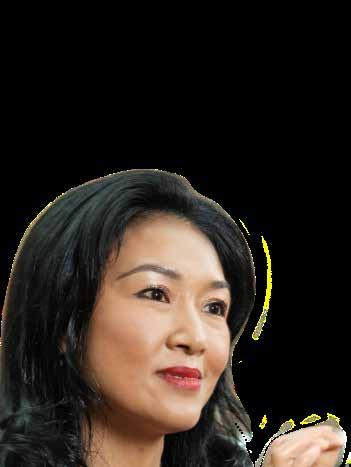
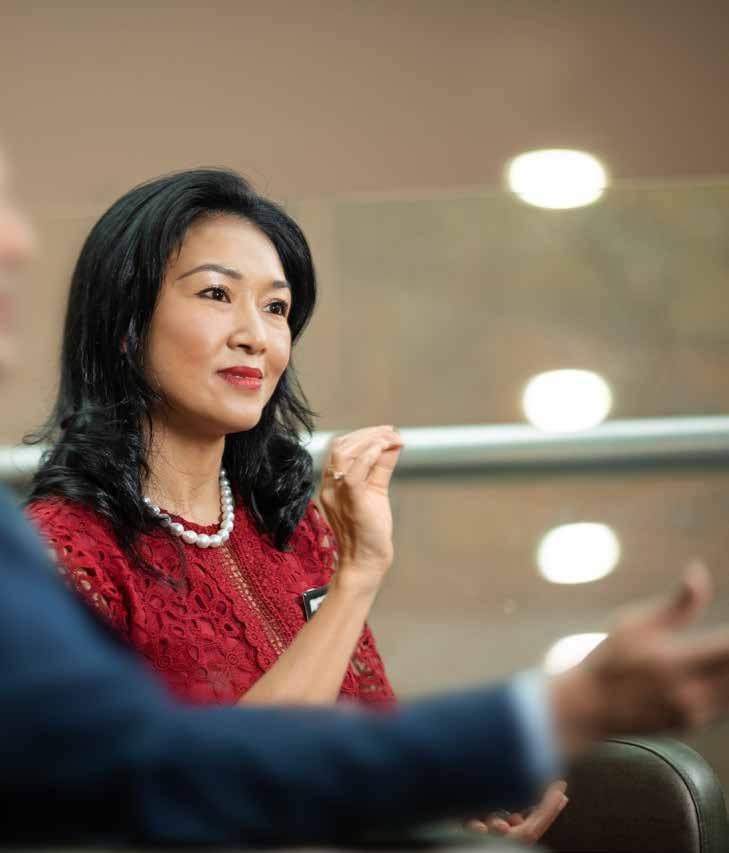
31 Annual Report 2022/2023
THEME 5
Targeting Age-Related Metabolic Insufficiency in Glaucoma with Nicotinamide (TAMING Glaucoma Trial)
Led by Assoc Prof Victor Wong and Cl Assoc Prof Rahat Husain
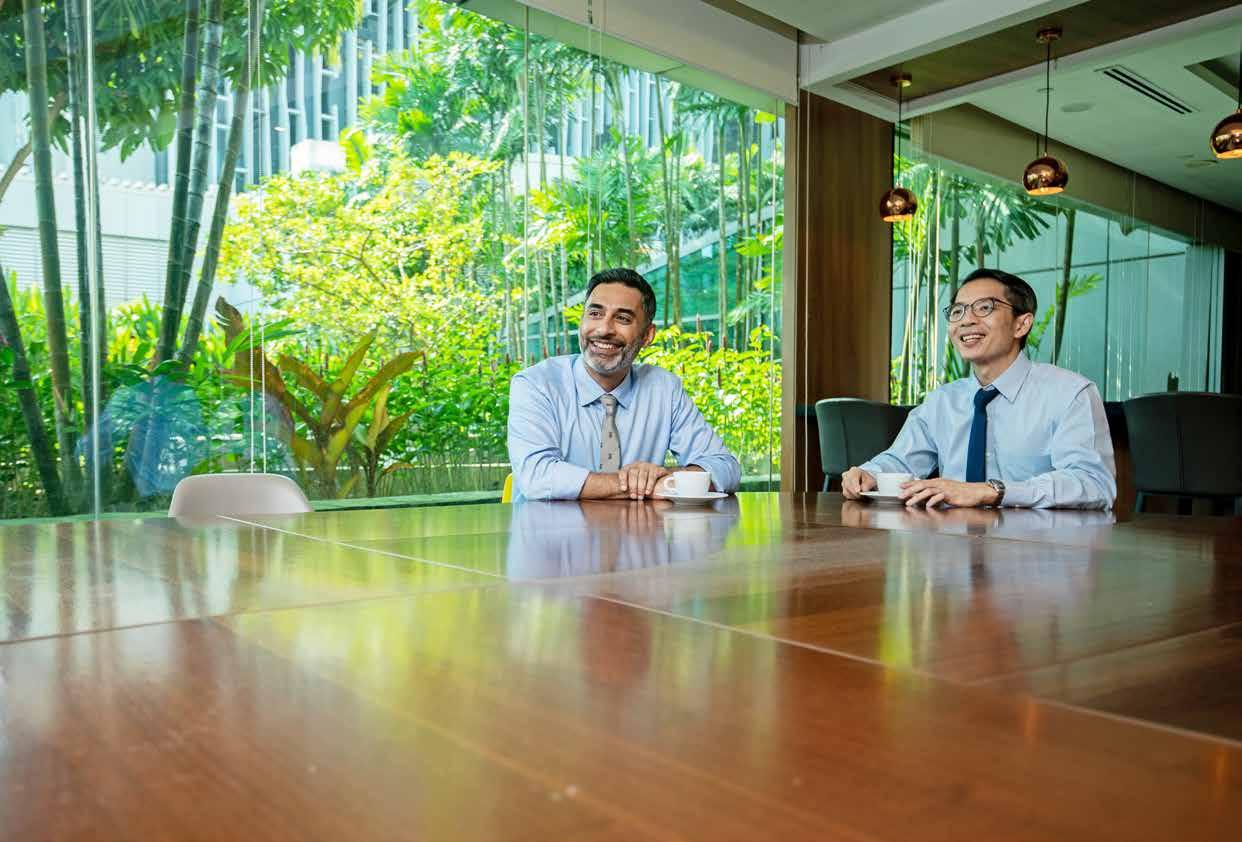
It studies how nicotinamide oral supplements can help delay glaucoma progression.

32 SingHealth Duke-NUS Academic Medical Centre
The greatest challenge is to ensure the oral medication complies with strict protocols and to prove that it can benefit glaucoma patients.
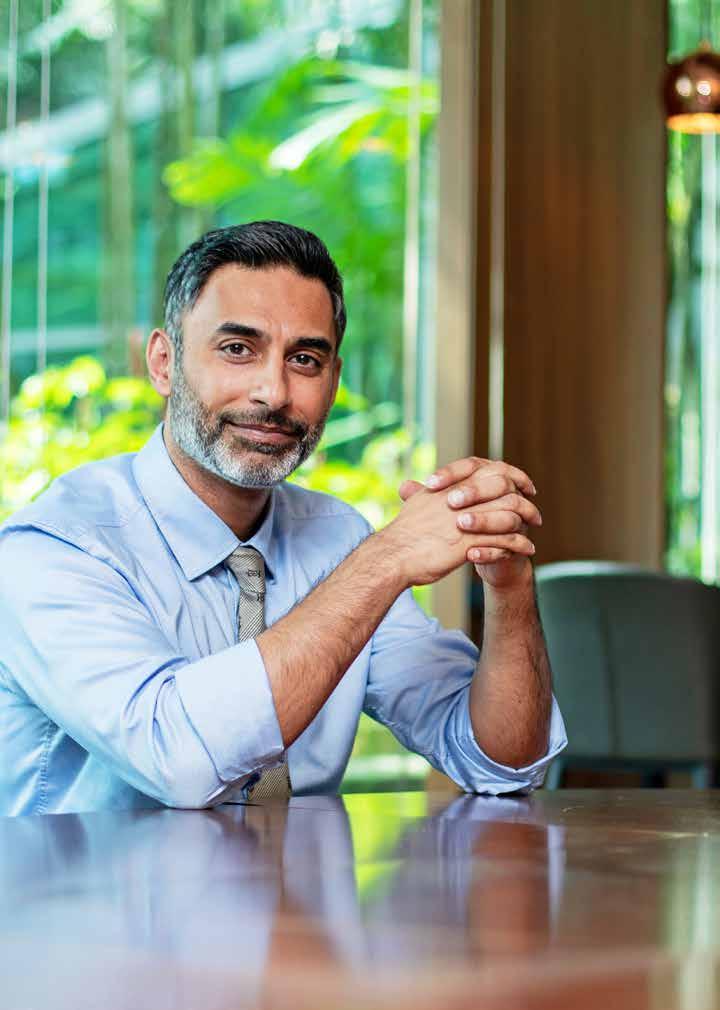
 Assoc Prof Victor Koh Head & Consultant, Department of Ophthalmology, National University Hospital (NUH)
Assoc Prof Victor Koh Head & Consultant, Department of Ophthalmology, National University Hospital (NUH)
Some elderly patients find eye drops uncomfortable or inconvenient. Oral medication may improve compliance since most of them would already be taking supplements for other conditions such as high blood pressure.
Cl Assoc Prof Rahat Husain Consultant, Department Of Glaucoma, SNEC
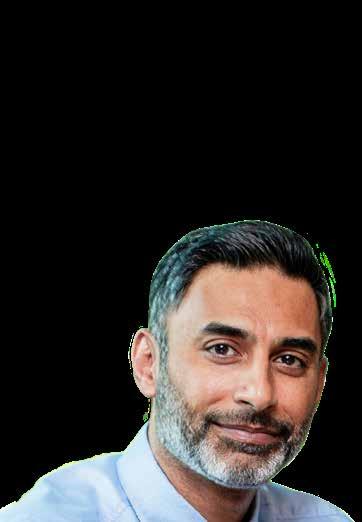
33 Annual Report 2022/2023
BUILDING RESILIENCE THROUGH MENTORING
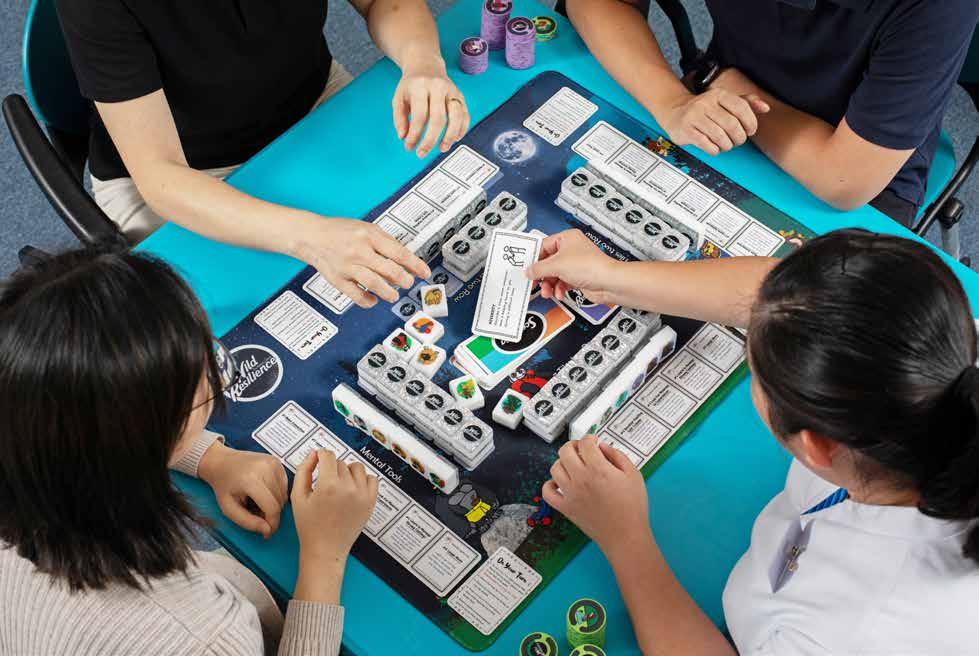
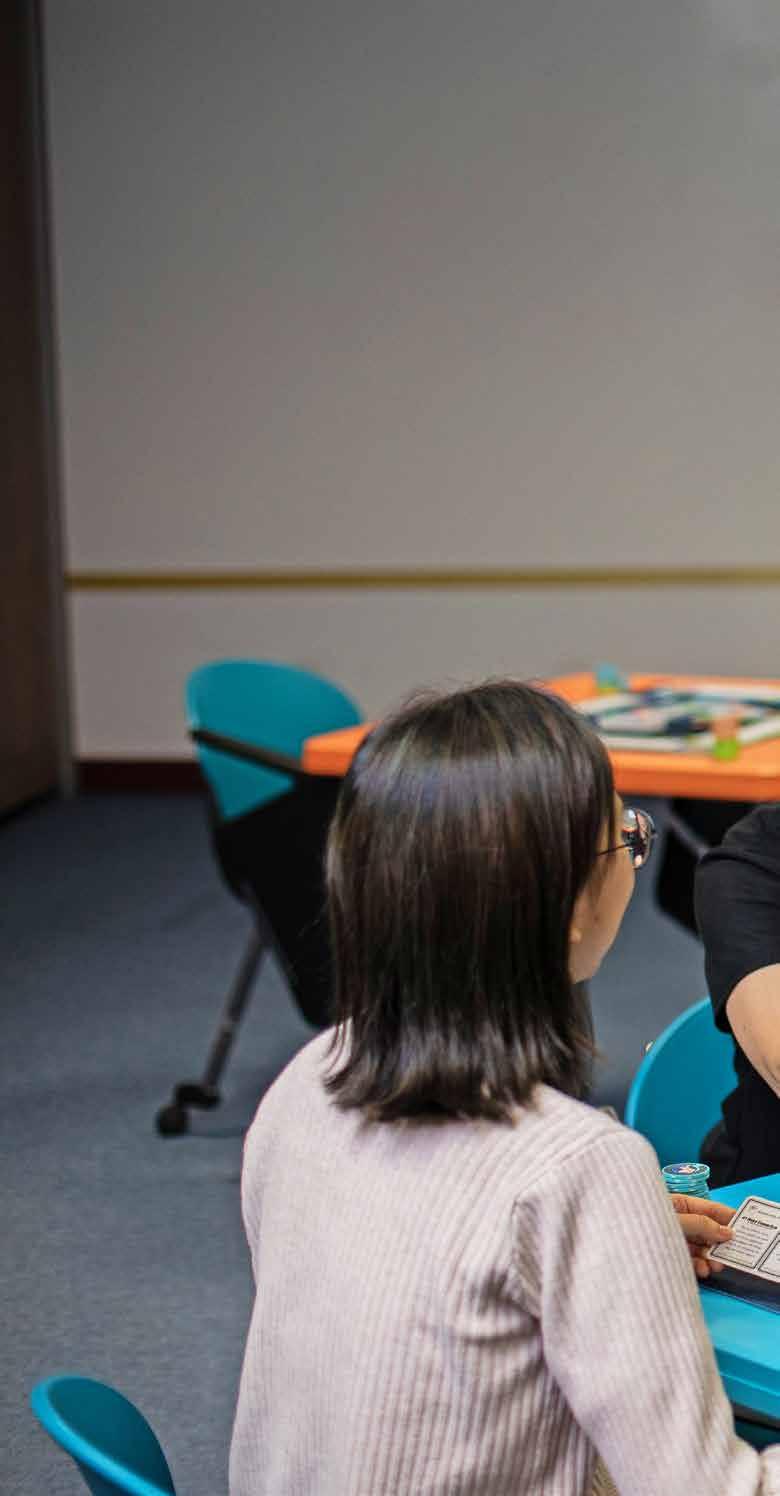
34 SingHealth Duke-NUS Academic Medical Centre
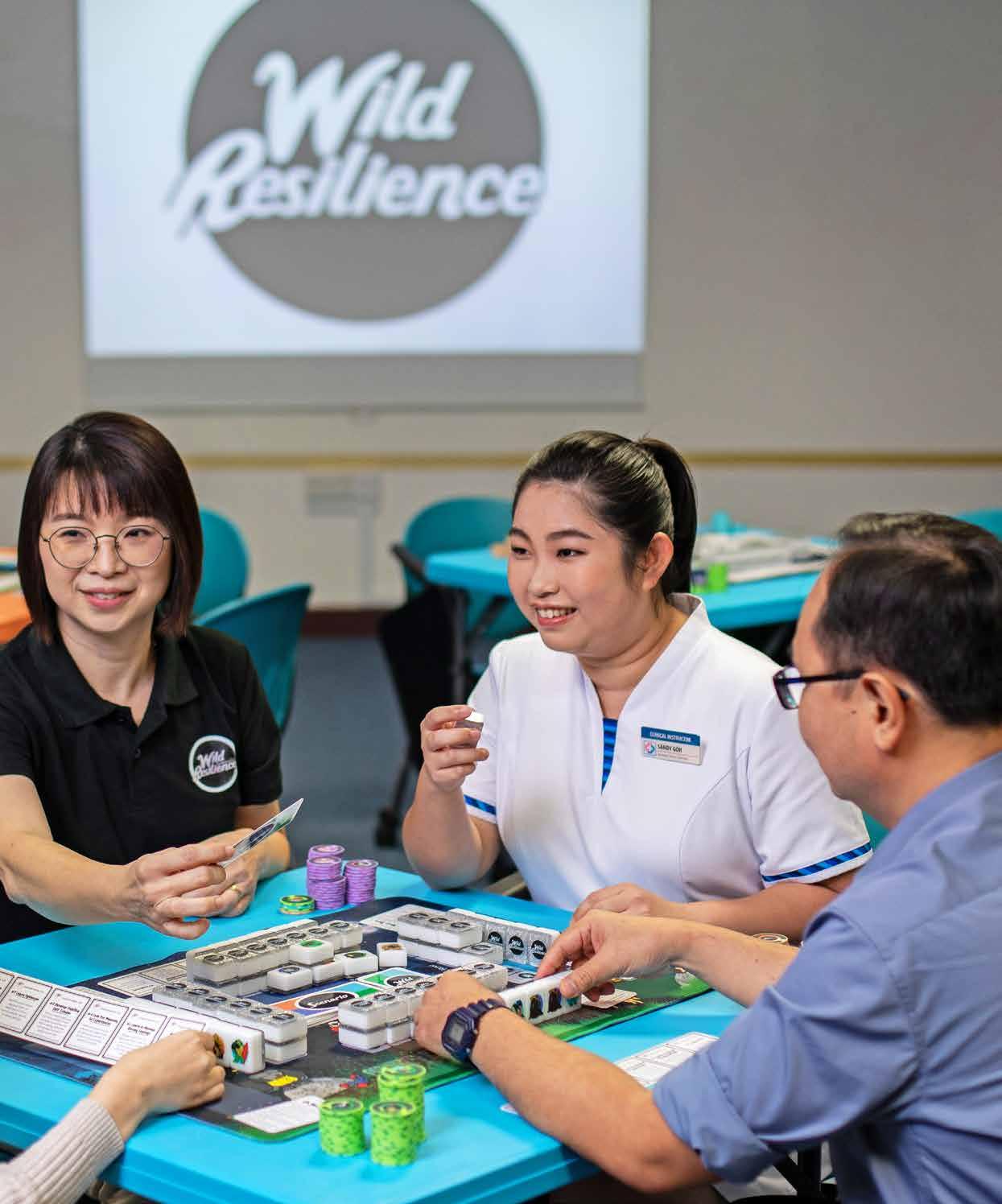
35 Annual Report 2022/2023
In healthcare, learning never stops. Apart from formal training, healthcare professionals hone their skills throughout their careers. This can be achieved through inter-professional education, peer-to-peer learning and mentoring.
Mentorship plays an especially important role in the healthcare ecosystem. With healthcare evolving rapidly since the pandemic, there is an imminent need for the workforce to adapt quickly to emerging patient needs. By connecting younger healthcare professionals with established specialists in their field for career guidance and professional development, mentorship helps to accelerate knowledge transfer and strengthen resilience in the next generation of healthcare professionals.
Ms Chua Ying Jie, a nurse educator with the Department of Advancing Nursing & Education at KKH, has spent the last four years mentoring Ms Sandy Goh, an assistant nurse clinician from the same hospital. Ying Jie, who has worked in nursing since 2007, met Sandy in 2020 during a Basic Cardiac Life Support course that the latter
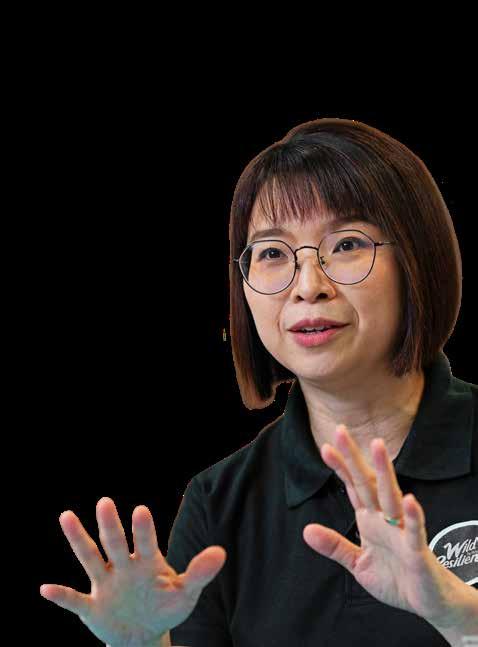

conducted. “I’d been searching for a partner to conduct a nurse preceptor course together,” says Ying Jie. “She was clear, concise, friendly and patient. I thought, she was the one!”
It marked the beginning of a mentor-mentee relationship where, as Sandy, who has worked at KKH for 13 years, puts it, “Ying Jie opened many doors for me”. Among these doors was the KKH Wild Resilience Games, a game first developed as a mobile application in 2019 but (with a $10,000 grant from the SingHealth Joyful Community Award) was expanded to include a physical game in 2022. The latter incorporates mahjong tiles, scenario cards and tokens to get players to share how they used mental resilience tools to overcome challenging situations in life.
Sandy, who was actively involved in the design of gameplay and its elements, adds, “I’ve never developed a game before! I looked to Ying Jie for advice, who also offered me a lot of freedom to experiment and try different things. I had to think out of so many boxes!”
Educator, Department of Advancing Nursing & Education, KKH
I feel a sense of responsibility to the younger nurses, to share my knowledge and skills with them.
Ms Chua Ying Jie
Nurse
36 SingHealth Duke-NUS Academic Medical Centre
The KKH Wild Resilience Games also spurred Ying Jie’s endeavours to shape Sandy into a proficient nurse educator. After successfully coaching new trainers within KKH, Sandy became the first to support training sessions for other institutions in SingHealth, and took the initiative to follow up closely on the progress of these trainers. Sandy says having a role model like Ying Jie allows her to keep learning and striving for excellence. “Among the many lessons Ying Jie taught me, the most important was to keep in mind my intention to help as many patients as possible.” The team aims to progressively introduce the game to all healthcare workers within SingHealth, and subsequently to others in Singapore and beyond.
“For example, I experienced much anxiety and even had dreams about the KKH Wild Resilience Games training sessions that I had to conduct,” she explains. “When I spoke to her about it, she advised me to focus on the goal of helping our colleagues to build resilience instead. Suddenly, I was no longer nervous. Knowing that what we do now will enhance the future of nursing and improve patients’ lives continuously motivates me.”
As a nurse educator, Ying Jie is passionate about helping to strengthen the nursing workforce at SingHealth. Training courses aside, projects
such as KKH Wild Resilience Games, which equip nurses with mental health tools to increase resilience, can promote a positive mindset.
“I feel a sense of responsibility to the younger nurses, to share my knowledge and skills with them. We work as a team. A training course for nurses can achieve better care for patients, and that drives us to do our best to deliver it well,” says Ying Jie.
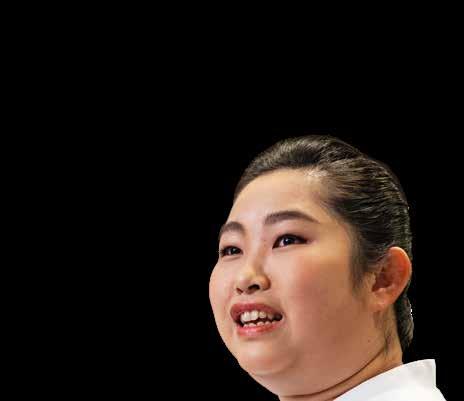

Meanwhile, Sandy has also carved out her own steps towards becoming a mentor — she is working with nursing students in the SingHealth Nursing Student Mentoring and Retention (SMART) Programme. SMART helps new nurses ease into their roles by placing them under the guidance of senior nurses. Mentors and mentees meet regularly and mentees have a safe space to ask questions, share ideas and get advice on career development.
She says, “In my own journey as a nurse at KKH, I’ve always wanted to guide and support other nurses. That’s why I was inspired to pursue nursing education; I hope to positively impact and empower future generations of nurses. For now, I still have much to learn from Ying Jie; I feel fortunate to have her as my mentor.”
Among the many lessons Ying Jie taught me, the most important was to keep in mind my intention to help as many patients as possible.
Ms Sandy Goh
Assistant Nurse Clinician, Department of Advancing Nursing & Education, KKH
37 Annual Report 2022/2023
CVS.AI: KEEPING YOUR HEART BEATING
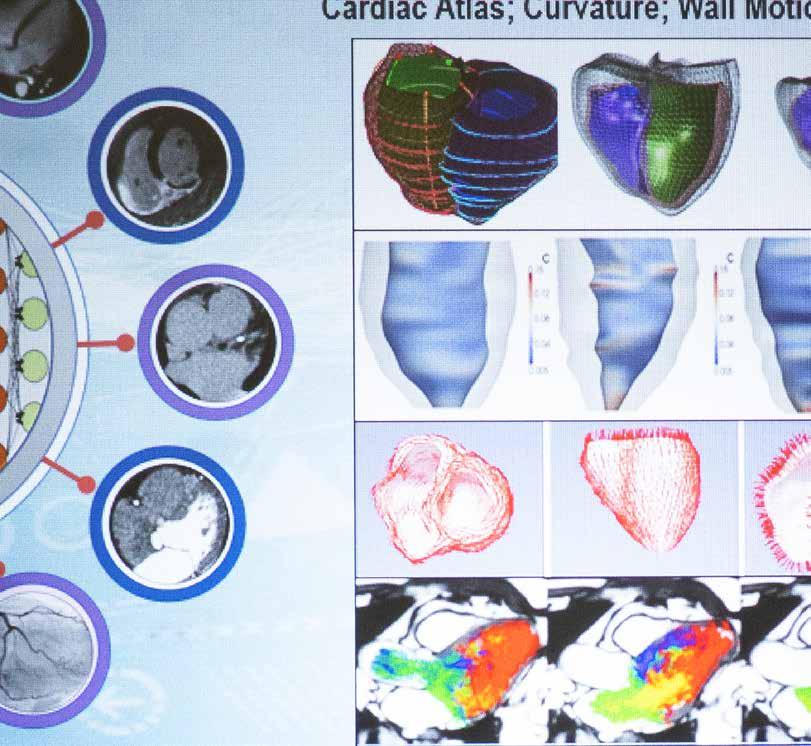
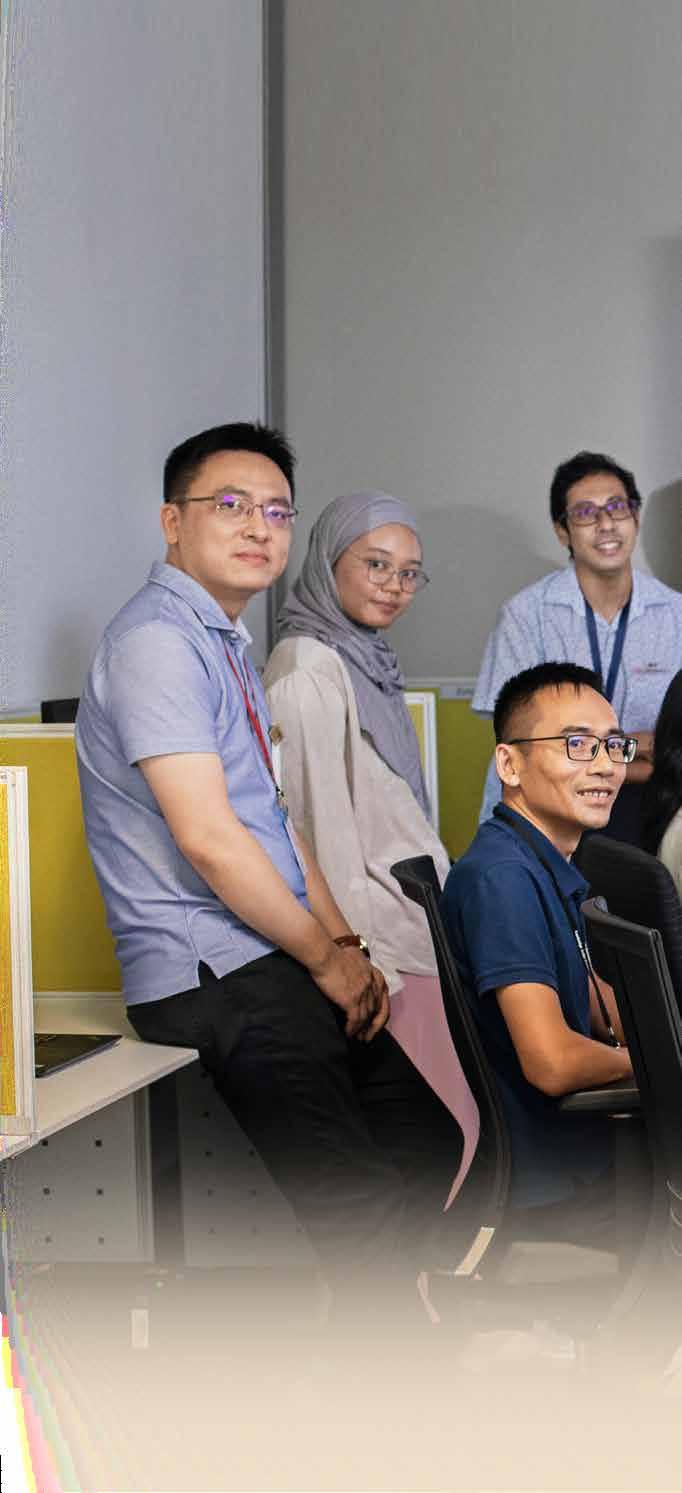
38 SingHealth Duke-NUS Academic Medical Centre
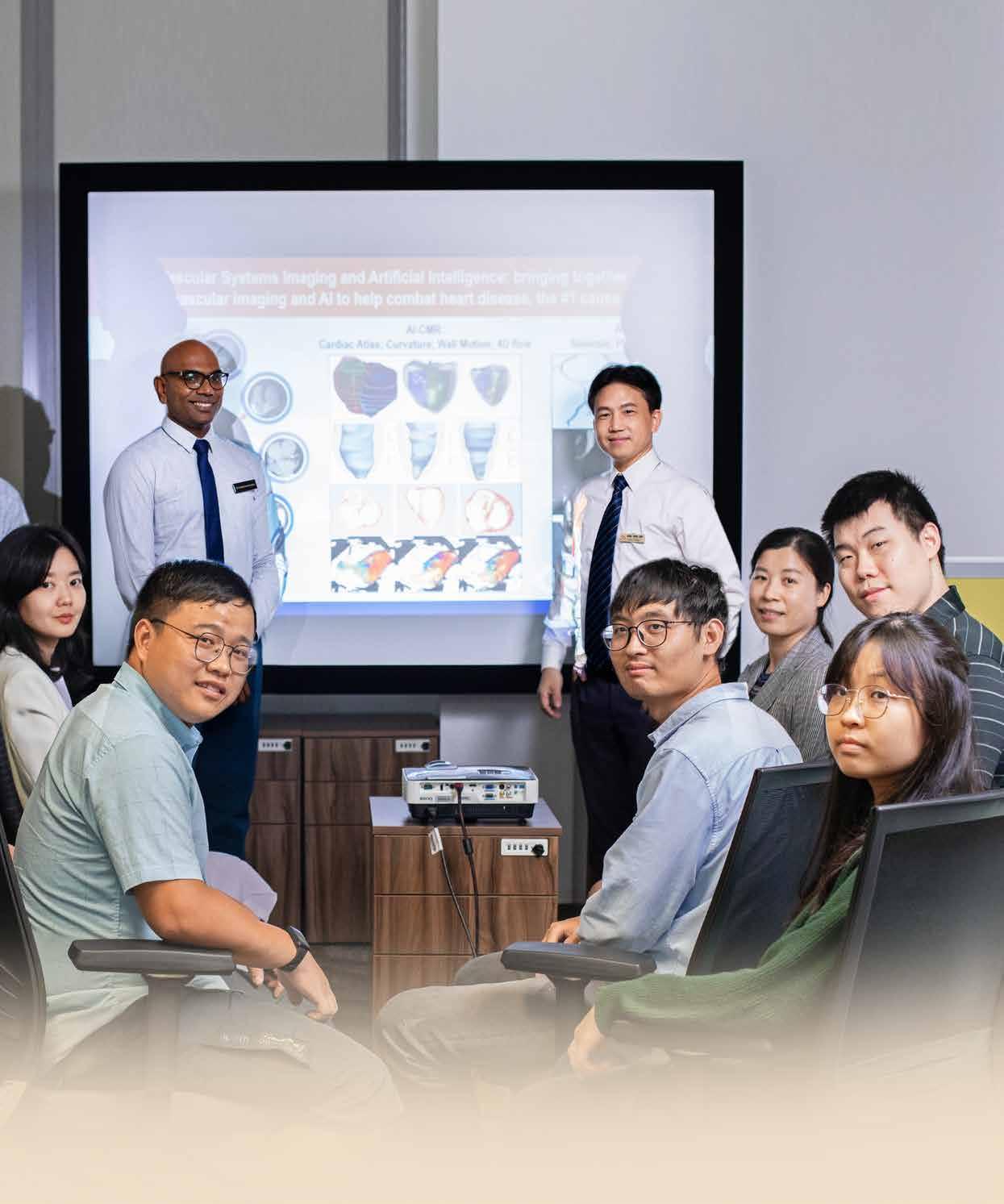
39 Annual Report 2022/2023
Cardiovascular disease (CVD) - which encompasses heart diseases and stroke - cause 21 deaths every day in Singapore. In 2021, one in three deaths here was due to CVD; globally, the illness is responsible for nearly 18 million lives lost every year.
More than 75 per cent of CVD can be prevented. The key lies in eating right, exercising adequately, protecting against stress, and most importantly getting yourself screened regularly. Hence the earlier CVD is identified, the better its treatment outcome.
In March 2022, NHCS became the first healthcare provider in Singapore and Southeast Asia to establish a Cardiovascular Systems Imaging and Artificial Intelligence (CVS.AI) lab. Helmed by Clinical Assistant Professor Lohendran Baskaran and Assoc Prof Zhong Liang, the lab’s Core Clinical Lead and Core Technical Lead respectively, CVS.AI applies AI algorithms to patient data and produces insights that will guide clinicians towards predicting and preventing CVD. Its findings will also allow clinicians to deliver healthcare that is cost-efficient and customised. All this can help Singapore navigate the challenges of cardiovascular morbidity.
NHCS has amassed a wealth of data. It receives more than 120,000 patients every year. In 2021 alone, it performed nearly 17,000 cardiac scans. These scans are taken with various methods such as Magnetic Resonance Imaging (MRI), Computerised Tomography (CT) and Nuclear
Singapore’s healthcare system is lauded as one of the world’s most efficient but we can do more to serve our patients. The precise insights CVS.AI provides will empower patients to take charge of their health and enable them to lead meaningful lives.
Assoc Prof Zhong Liang
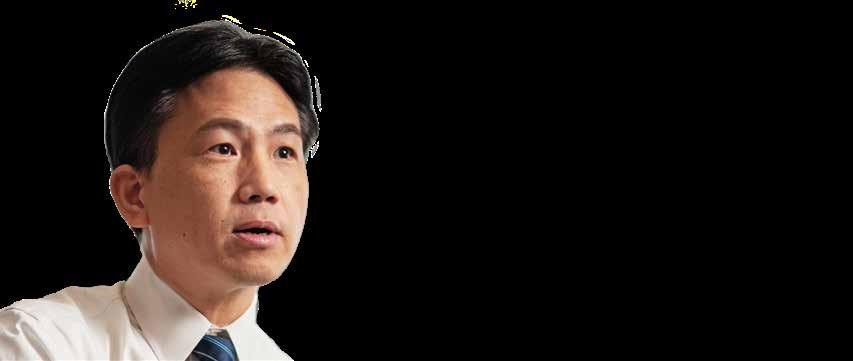
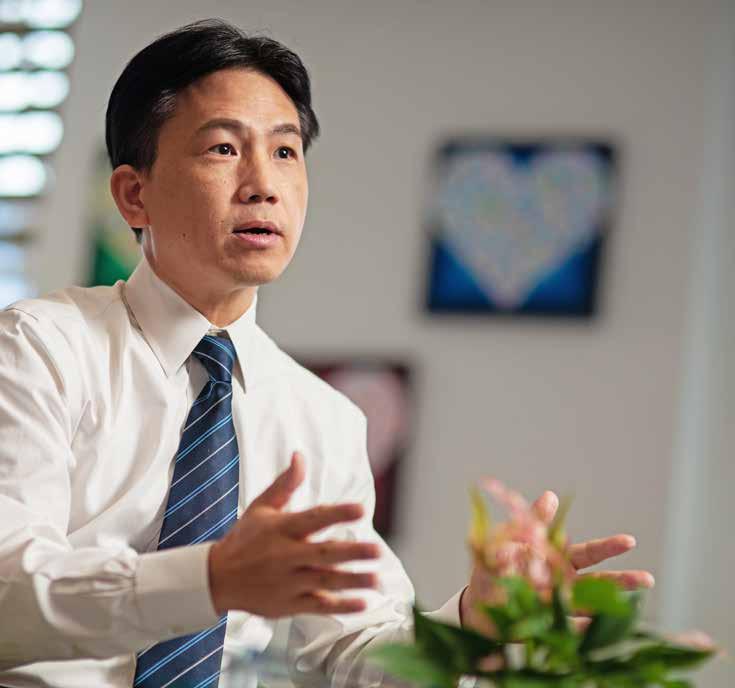
Principal Investigator, National Heart Research Institute Singapore (NHRIS), NHCS; Core Technical Lead, CVS.AI
Imaging. They allow clinicians to determine the structure and function of the heart and arteries - for example, plaque on artery walls or heart muscle damage which can occur when blood supply is impeded or blocked.
Assoc Prof Zhong says AI can make the analysis of all this data easier and faster. He explains, “It automates tedious processes and saves a lot of time. Besides extracting detailed and richer information from data, it also makes inferences based on large data sets.”
Indeed, AI can be relied upon to accomplish some humanly impossible tasks. Cl Asst Prof Lohendran says: “AI can potentially capture and make sense of complex information in a multidimensional manner that cannot be done by a human interpreter. Clinicians, therefore, can identify, predict, and prevent CVD more efficiently and more accurately. For example, a clinician usually takes up to 30 minutes to analyse a CT scan - we go through an average of 10 scans every day. If a scan requires more detailed examination, it may take another three or four hours. Our goal is to create a technology that can help people avert heart attacks before its onset by five to 10 years.”
CVS.AI is not only focused on technology, it also prioritises patient safety and data privacy. Apart from dedicated software and hardware for ingesting, cleaning, sorting and annotating imaging data, the team has also developed an AI software that identifies sections of interest in the
40 SingHealth Duke-NUS Academic Medical Centre
scans. Using this can help deepen clinicians’ understanding of CVD, and numerous projects are in the pipeline, with both international and local collaborators, to assess its findings.
Among the projects is the AI-driven national Platform for CT cOronary angiography for clinicaL and industriaL applicatiOns (APOLLO). By integrating AI with diagnostic and prognostic capabilities to provide automated anonymisation and reporting; calcium scoring; epicardial fat, coronary stenosis and plaque quantification, APOLLO can make the analysis of CT scans more efficient for clinicians. The team aims to recruit 5,000 subjects across the three largest cardiac institutions in Singapore. CT scans of these patients will be compiled into a digital archive of real-world data that can be used to assess feasibility and usability of AI in diagnosis and treatment, and ultimately contribute to successful drug development.
AI is also being explored to quantify CAD using CT scans from lung cancer screening. The fully automated, high-resolution AI model uses the coronary artery calcium score to extract and assess the risk of CAD from a lung CT scan. Doing so allows for the opportunistic and cost-effective risk assessment of two diseases that pose the largest healthcare burden (lung cancer and CAD) from a single lung cancer screening CT scan; thus facilitating large-scale improvements in preventive medicine.
Finally, there is also Artificial Intelligence in Medicine Transformation Programme (AIMx). It is a collaboration between SingHealth, Duke-NUS and A*STAR, and develops AI algorithms for the smart triaging of CVD patient. It harnesses multimodal data inputs, including clinical data, retinal images and cardiac biomarkers, to triage the severity of obstructive coronary artery diseases. Clinicians can prioritise patients with serious issues that require urgent medical attention. A three-year project, it seeks to commercialise and scale these Al algorithms both regionally and internationally, which will lead to cost and userfriendly solutions for timely diagnosis and clinical intervention.
“We have plans to upscale these algorithms developed at CVS.AI lab. Now, they are still being tested in collaboration with healthcare policy experts, institutions, and industry partners. The possibilities that AI brings to healthcare are limitless, but we must remember that AI processes information only based on what it has learnt. As such, these algorithms will still require regular updates based on data we collate,” shares Assoc Prof Zhong.
“With CVD, prevention is key,” says Cl Asst Prof Lohendran, “and this is our purpose at CVS.AI. No one wants to fall sick. Our work will empower our patients to take charge of their health, so they can live healthy and fulfilling lives.”
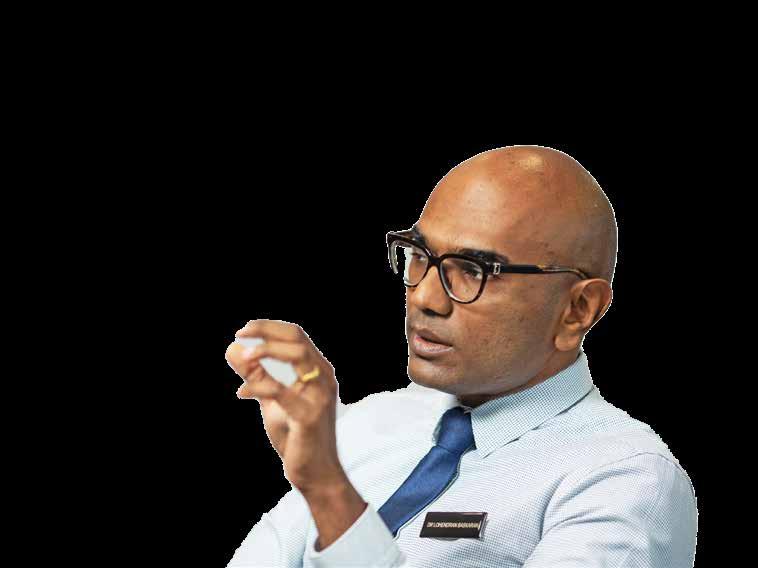
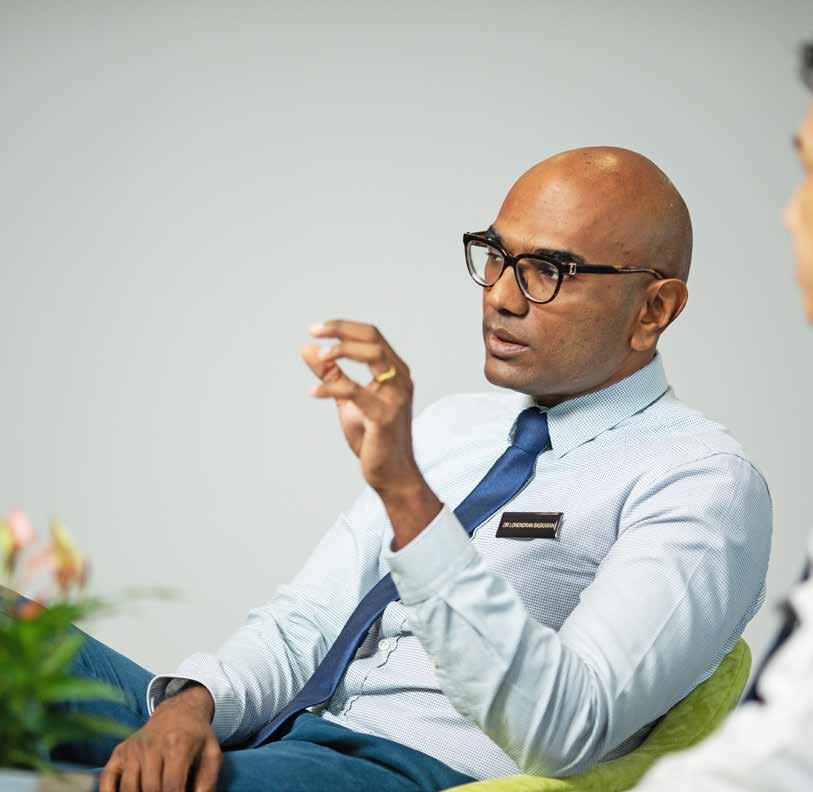 Consultant,
Consultant,
Our goal is to create a technology that can help people avert heart attacks before its onset by five to 10 years.
Cl Asst Prof Lohendran Baskaran
41 Annual Report 2022/2023
Senior
Department of Cardiology, NHCS; Core Clinical Lead, CVS.AI
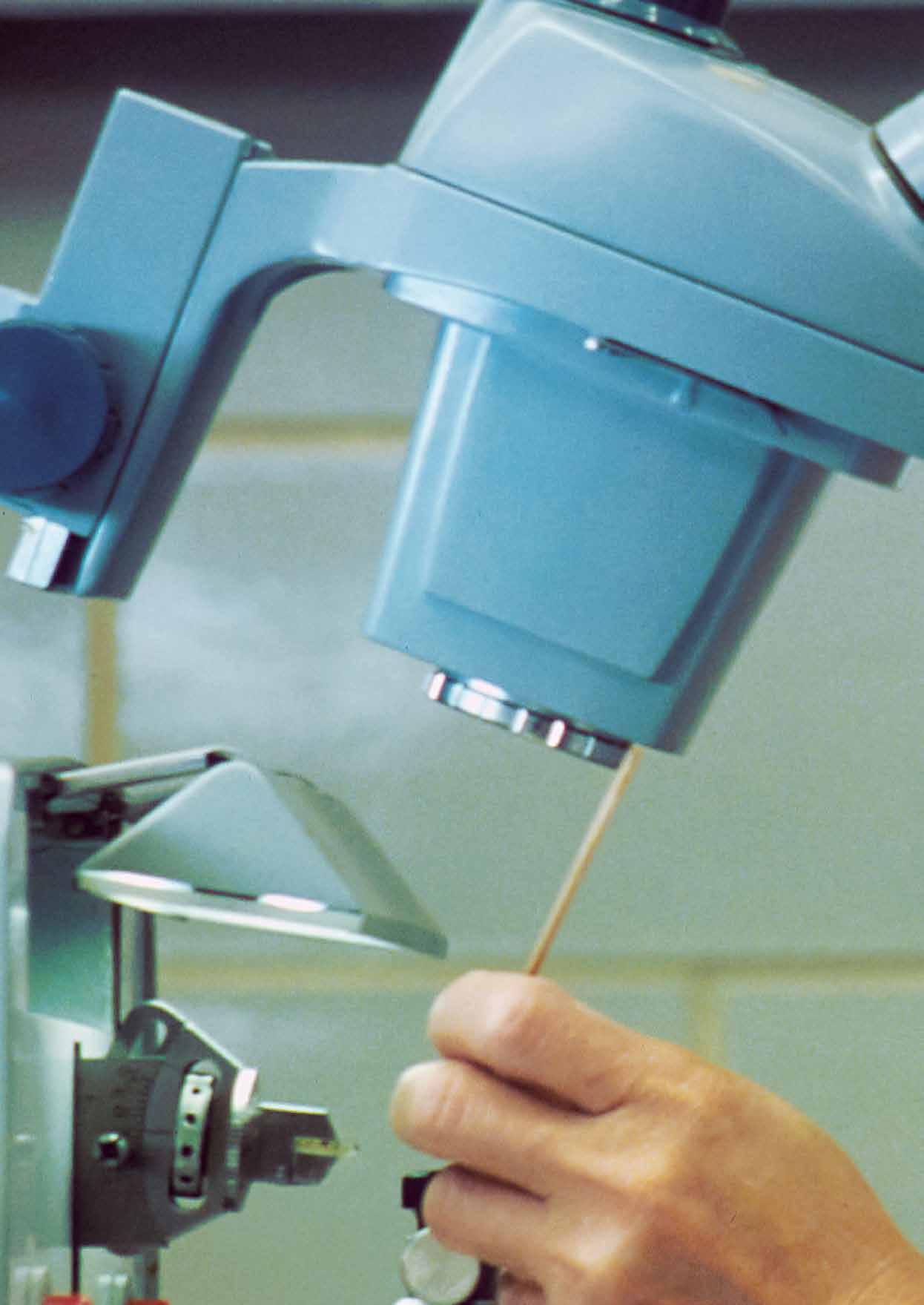
OUR IMPACT
• Improving Outcomes and Quality of Life
• Advancing Healthcare System Reliability
• Contributing to a Healthier Tomorrow through Education
• SDGHI Leads the Charge to Tackle International Health Challenges
• Research: Transforming Medicine
• Fuelling Research and Hope for Patients through Philanthropy

IMPROVING OUTCOMES AND QUALITY OF LIFE
Patients with severe heart valve disease find hope in minimally invasive treatments
Surgery to repair or replace a damaged heart valve was often not recommended for patients with severe tricuspid regurgitation. NHCS is the first in Southeast Asia to offer two minimally invasive therapies (TricValve® and TriClipTM) to help them achieve a better quality of life. Both treatments relieve symptoms and hasten recovery. After the procedure, patients can be expected to start walking in a day, and be discharged in two to four days.
No screen time for baby, only an hour for kids under seven
Singapore’s first Integrated 24-Hour Activity Guidelines for Early Childhood promotes the adoption of positive parenting practices across four key aspects: physical activity, sedentary behaviour, sleep and diet. Developed by the Integrated Platform for Research in Advancing Metabolic Health Outcomes of Women and Children (IPRAMHO) led by KKH, these guidelines aim to improve long-term health among children aged seven years and younger.
Freeing up 12 hours for nurses
Saving time can save lives. Having to check all 40 general ward patients for vital signs at intervals between one and eight hours often takes nurses away from other critical clinical duties. A wearable sensor developed by CGH, A*STAR and Respiree enables nurses to remotely track vital signs such as respiratory rate and view them at any time to
ensure early intervention. The sensor’s accuracy and feasibility were validated during trials on patients with conditions such as asthma and pneumonia and may be used in post-discharge patients requiring care in the community setting.
More cancer patients receive treatment at home
With NCCS’ Home Care programme, patients no longer need to take time off from work, spend time commuting or wait in queues for their consultations. Piloted in 2020 with the aim to provide better care and greater convenience to patients, the programme also seeks to ensure treatment compliance. Each home visit lasts about half an hour, including a pre-injection assessment of the patient’s vital signs and post-injection monitoring. To date, more than 300 patients have benefited from this programme.
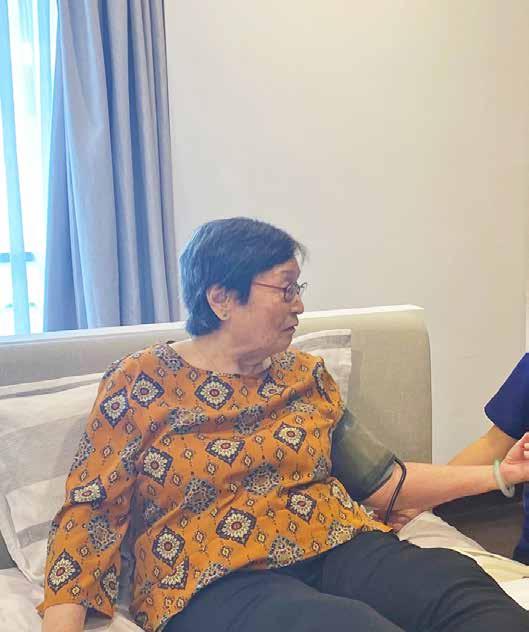
44 SingHealth Duke-NUS Academic Medical Centre
New keyhole procedure for end-stage kidney patients offers 90 per cent success rate
Chronic diseases such as diabetes and hypertension have become more prevalent, resulting in more people needing haemodialysis. Piloted by SGH in 2022, endoAVF (endovascular AVF) is a non-invasive procedure that creates a fistula in the arm, allowing blood to be extracted and cleansed during haemodialysis. Compared to conventional surgery, endoAVF has an impressive 90 per cent success rate. Performing endoAVF takes only 15 minutes and leaves no scars and patients only need to do a balloon angioplasty for maintenance every two years, as compared to three procedures a year with the traditional AVF method.
According to 53 seniors who enrolled in the pilot, their systolic BP reduced by 3 per cent on the average after a month of weekly BP self-monitoring.
Vital signs monitoring kiosks enable elderly to self-monitor blood pressure
Of the 3,800 seniors who visit the SingHealth Community Nurse Posts (CNP) at Senior Activity Centres for ailments such as high blood pressure (BP), 60 per cent do not own a BP monitor and rely on nurses to check and interpret the readings. Vital signs monitoring kiosks have been installed in 20 CNPs to enable the elderly to self-measure their BP. Every kiosk is equipped with a BP monitor and an iPad tablet computer with the Health Discovery Plus software. BP readings are indicated on the dashboard for nurses to review and are updated in SingHealth’s electronic medical records system for future follow-ups.
SingHealth Duke-NUS Sleep Centre offers hypoglossal nerve stimulation therapy to treat obstructive sleep apnoea
Obstructive Sleep Apnoea (OSA) affects one in three Singaporeans. It occurs when upper airways become blocked and causes breathing to stop and start throughout sleep. OSA affects one’s quality of life and increases the risk of developing conditions such as high blood pressure and heart disease. Hypoglossal nerve stimulation (HGNS) has benefited over 25,000 OSA patients worldwide. HGNS features an implantable pulse generator to detect breathing patterns and electrically stimulates the hypoglossal nerve to stay in sync with the breathing. The only procedure to address poor muscle tone in the upper airways, it offers 94 per cent patient satisfaction with consistent adherence of 5.7 hours of use every night.
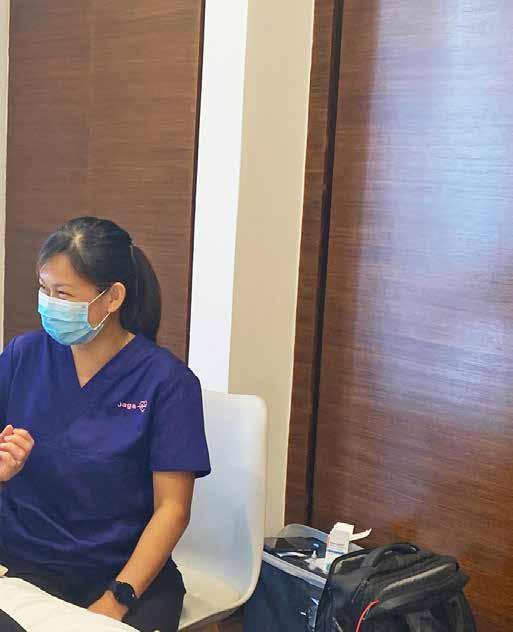 From 2011 to 2020, the number of patients on haemodialysis jumped by nearly 67 per cent.
From 2011 to 2020, the number of patients on haemodialysis jumped by nearly 67 per cent.
45 Annual Report 2022/2023
Cancer patient receiving treatment at home
SingHealth Polyclinics rolls out My Care Team
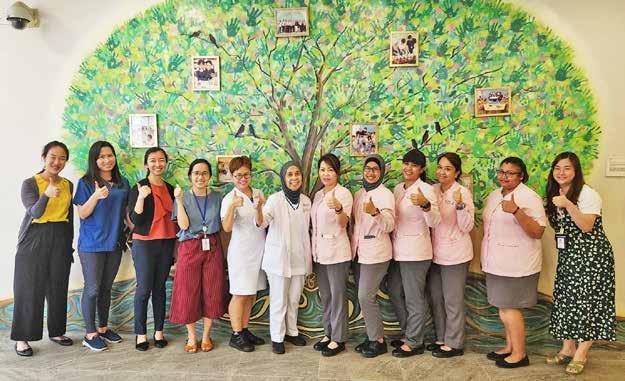
Up to 200 patients and caregivers to benefit from The Temasek Foundation Parkinson’s Disease Community Care Programme
A new pilot community care initiative has been established to provide support for patients with moderate to advanced Parkinson’s Disease. Supported by a multi-disciplinary team of specialists from the National Neuroscience Institute (NNI) and SGH, this programme includes teleconsultations and home visits by SGH community nurses who assess the physical and psycho-emotional health of patients, monitor medical or social issues that can affect their quality of life and provide timely advice between hospital appointments.
As part of the Healthier SG campaign that aims to empower Singaporeans to better manage their health through preventive care, SingHealth Polyclinics (SHP) has launched the My Care Team (MCT) initiative. This multidisciplinary, team-based care approach, which involves doctors, care managers and health pals, ensures patients’ healthcare plans are customised to their needs and health goals. MCT allows patients to build long-term relationships with healthcare providers so as to enable patients to achieve more positive health outcomes through effective management of chronic conditions.
New drug prevents vision loss, reduces burden of treatment on patients
Developed after more than 10 years of research by SNEC, Vabysmo® (faricimab) has been approved by the Health Sciences Authority to treat neovascular Age-related Macular Degeneration (nAMD) and Diabetic Macular Dema. nAMD affects nearly 20 million people globally and is the top cause of vision loss in people 60 years or older. Vabysmo® inhibits two proteins that destabilise blood vessels which leads to inflammation in the eye, causing blindness. Vabysmo® prolongs the time needed between treatments. Most patients go up to four months instead of two on other medications - which translates into greater cost savings.
Multi-disciplinary approach mitigates need for amputation, speeds up recovery
Patients with diabetes can manage their condition with more confidence at the Sengkang General Hospital’s (SKH) Diabetic Limb Salvage clinic. Here, a multi-disciplinary team of orthopaedic surgeons, plastic surgeons, infectious diseases specialists, dieticians, interventional radiologists, podiatrists and nurses tends to patients throughout the treatment journey. Results of this approach are promising; it not only mitigates loss of limbs but even reduces recovery time to three months.
We aim to improve patients’ well-being, reduce the need for unscheduled hospital admissions and ease the load on caregivers.
Assoc Prof Prakash Kumar Manharlal Senior Consultant, Department of Neurology, NNI, and programme lead
46 SingHealth Duke-NUS Academic Medical Centre
AI in tele-dentistry programme improves oral care for vulnerable seniors
Seniors in Singapore have relatively poor oral health - a 2017 study found that 31 per cent have lost their teeth - which can affect their overall health. Jointly initiated by the National Dental Centre Singapore (NDCS) and Temasek Foundation, Tele-Dentistry Oral Care for Seniors (T-DOCS) ensures preventive care for seniors who are homebound or have mobility issues, and provides regular oral health screenings to enable early detection of oral diseases. Their intra-oral scans and medical records are uploaded to an e-system where dentists can access, evaluate and advise on follow-up treatment. T-DOCS, which will run for two years, aims to reach more than 500 seniors including those in day care centres and special needs centres.
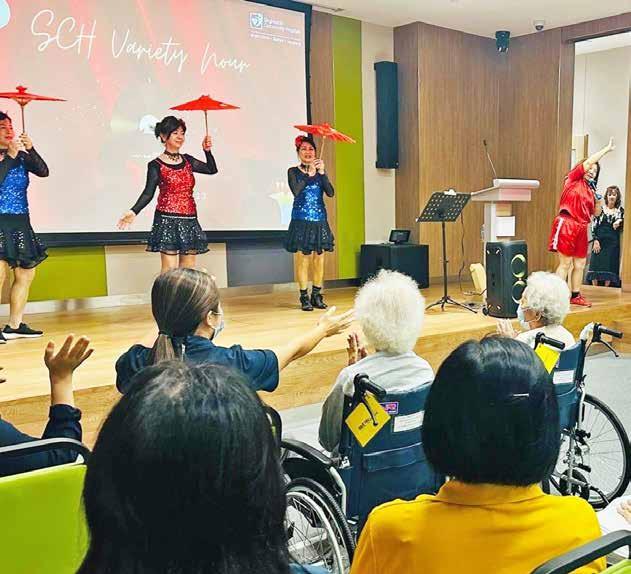
Assoc Prof Lee Kheng Hock
Deputy Chief Executive Officer (DCEO) (Education and Community Partnerships), SCH
The inaugural Asia-Pacific Social Prescribing Conference organised by SCH sought to promote understanding of the impact of social prescribing through knowledge sharing and competency building. It brought together more than 20 overseas and local experts, and was attended by nearly 1,000 people. The conference also marked the official launch of SCH Office of Learning (SCHOOL), which trains health, social and community care workers who will help boost social prescribing efforts.
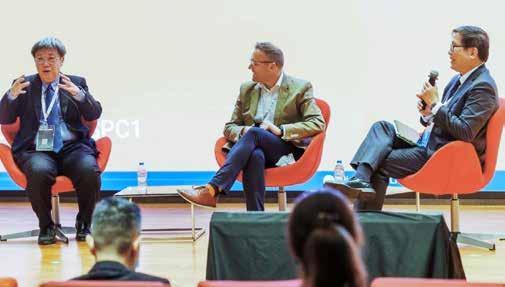
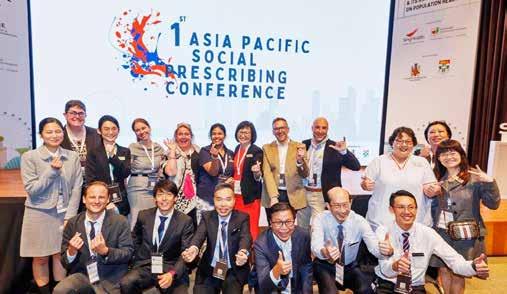
Social Prescribing connects people to assets within their community, to improve their social determinants of health.
SCH organised Asia-Pacific’s first Social Prescribing Conference where global and local experts exchanged insights on its impact on community health
Exchange of ideas and practices on social prescribing around the world at Asia-Pacific’s first Social Prescribing Conference
47 Annual Report 2022/2023
Social prescribing for patients in the hospital
ADVANCING HEALTHCARE SYSTEM RELIABILITY
The SingHealth Duke-NUS Institute for Patient Safety & Quality (IPSQ) aims to advance the reliability of healthcare systems by fostering the culture of safety. Patient safety is a top priority and IPSQ recognises the interconnectedness of enhancing patient safety and quality culture, promoting staff well-being, and engaging patients as partners in the improvement process. IPSQ achieves these objectives through its various strategic initiatives.
Sustaining patient safety capabilities and capacities
Patient safety is paramount in healthcare. It requires a skilled workforce committed to ensuring safe and effective care. IPSQ is dedicated to building a team of healthcare professionals who can sustain patient safety and continuously improve care quality.
The AM-EPIC Healthcare Quality Improvement (QI) programme aims to equip learners with concepts and tools to achieve tangible
outcomes in their QI projects. 1,052 healthcare professionals from SingHealth have graduated from the programme and successfully completed a Healthcare QI project - these graduates serve as champions in promoting a culture of continuous learning and improvement. This reflects the programme’s success in equipping learners with the necessary skills to drive positive change in healthcare.
As part of the MOH’s overarching strategic goal to build high-reliability healthcare systems in Public Healthcare Institutions through its Ensure
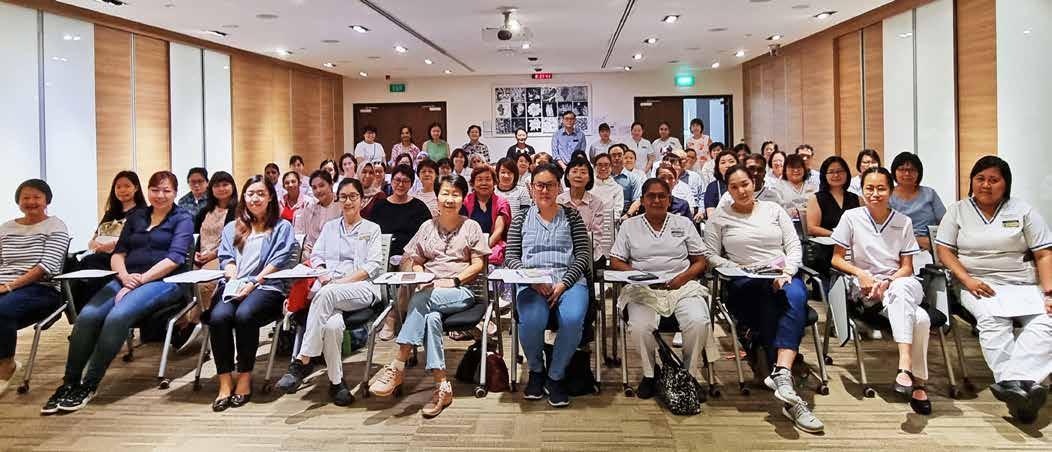
Cross Institution Infection Control Auditors’ Hand Hygiene Training 48 SingHealth Duke-NUS Academic Medical Centre
Safer Systems Framework, 10 participants from SingHealth were identified for the IHI Improvement Coach (IC) Programme and have completed the course. Another eight were appointed to the IHI Improvement Advisor (IA) Programme. These IAs and ICs are significant to IPSQ’s capacity-building efforts to improve patient safety.
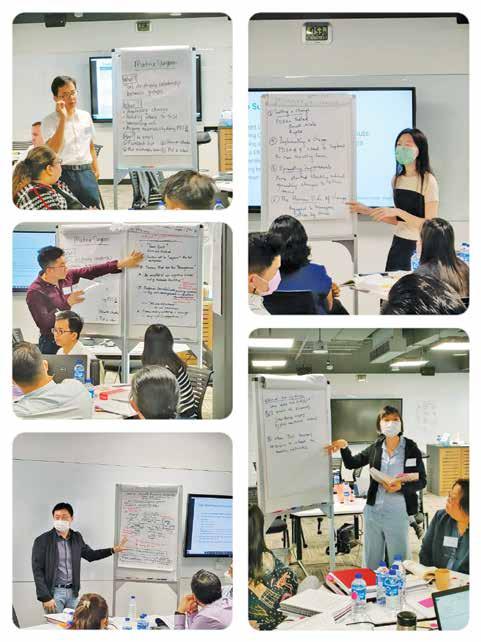
To ensure sustained change, 35 individuals were nominated and empowered as Change Leaders in SingHealth. The first cohort completed its training in March 2023. These Change Leaders play a crucial role in promoting a culture of continuous improvement, driving positive change, and delivering better outcomes for patients, staff and the organisation.
In May 2022, after a two-year hiatus due to COVID-19, the Cross Institution Infection Control (CIIC) Audits resumed with the engagement and refresher training of CIIC Auditors. To formalise the training and competency roadmap for CIIC Auditors and ensure consistent and high audit standards, the CIIC Auditor’s e-Learning modules were launched in February 2023. These modules covered both soft and technical skills, and equipped CIIC Auditors with necessary knowledge and skills to conduct CIIC Audits effectively. This, along with on-the-job training, workshops, and competency assessments, has helped to enhance the competency of CIIC Auditors, and achieve consistent and high audit standards across institutions.
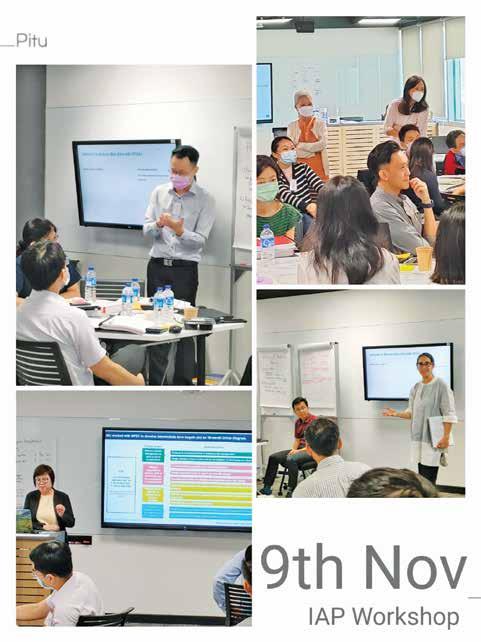
49 Annual Report 2022/2023
Achieving excellence and joy at work through interprofessional continuing education programmes
To promote a vibrant learning community, IPSQ partnered with domain experts to co-curate programmes aimed at fostering joy at work for patient safety. One of IPSQ’s Interprofessional Continuing Education Programmes, THRIVE*, won the 2022 AM.EI** Golden Apple Award for Programme Excellence, which honours healthcare educators who demonstrate excellence in teaching by engaging and inspiring learners.
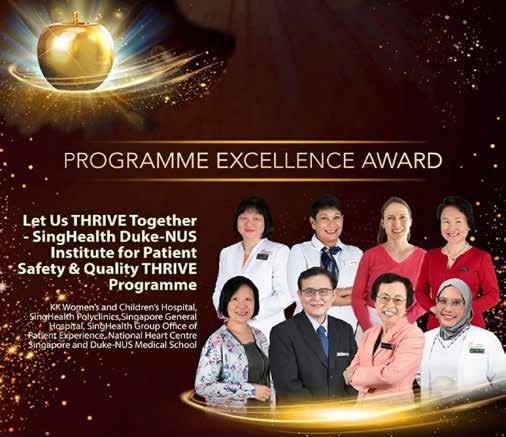
IPSQ also won the following awards for their projects:
1. 2022 SingHealth Allied Health Innovation Challenge – AHIP-GEM# Award and AHIP-Dare to Reimagine Award
2. 2022 Singapore Healthcare Management Poster Award – Operations
3. 2022 Singapore Health & Biomedical Congress – Best Poster Award (Gold)
* THRIVE: Transforming Healthcare through Resilience, Innovation, Values and Excellence
** AM.EI: Academic Medicine Education Institute
# AHIP-GEM: Allied Health Innovation Practice - Ground-up and Emerging
In August 2022, IPSQ piloted TeamJOY™, a programme to equip leaders with communication and relationship-building skills to engender an environment of trust and a culture of openness. The goal is to achieve both physical and psychological wellness and drive joy at work. This was followed by TeamCHOICE™ in November 2022. Besides
Graduate programmes in patient safety and healthcare quality (PSHQ)
Academic programmes fulfil IPSQ’s mission to develop healthcare professionals, competent to drive patient safety and advance the field through formal education, research and innovation. These graduate programmes, conferred by Duke-NUS and NUS, reflect SingHealth’s commitment in prioritising patient safety in Singapore and Asia.

For more information, visit Academic
inculcating an understanding of safe and unsafe choices, it also taught ways to eradicate human errors and to promote a just culture. IPSQ seeks to empower staff to make positive changes at their workplace to forge a stronger culture of respect, kindness and understanding for one another.
To refine organisational strategies to drive joy at work in SingHealth required a better understanding and assessment of workplace climate and behaviours. For this purpose, the second Resilience in Academic Medicine (RAM survey) was launched In March 2023.
IPSQ published a study on “Prevalence of burnout among healthcare professionals in Singapore” in Annals in July 2022 in improving joy at work.
For more information, visit Publications
50 SingHealth Duke-NUS Academic Medical Centre
Building a Comunity of Learning Inter-professionally In Patient Safety (CLIPS)

CLIPS was formed in March 2023 and received its first teaching enhancement grant from the National University of Singapore. The grant allows IPSQ to engage in focused and sustained discussions of topics related to academic teaching and evaluation of the graduate programmes in PSHQ.
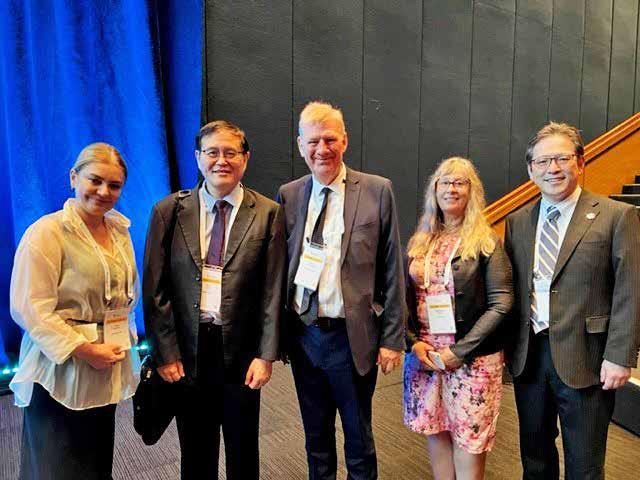
IPSQ also piloted another initiative in March 2023 under CLIPS known as the DISCO Café. Its structured facilitation approach brings together colleagues from across SingHealth institutions, SingHealth Patient Advocacy Network (SPAN) members and domain experts to collaborate on projects and cross-pollinate ideas. To enhance the robustness of CLIPS, podcasts are used to promote shared learning and facilitate the exchange of ideas among healthcare professionals. IPSQ’s inaugural podcast, “What is a Quality Improver?”, featured Improvement Advisor, Dr Teo Li-Ming.
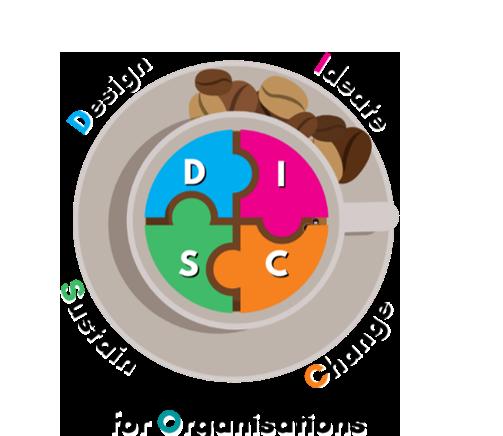
Besides podcasts, learning also took place via IPSQ webinars. These attracted 11,106 participants, and featured speakers from inter-professional project teams both within and outside SingHealth institutions to share on project-based applications and good practices, and how they overcame challenges.
Global Action for Leaders & Learning Organisations on Patient Safety (GALLOPS)
GALLOPS aims to advance the Global Patient Safety Action Plan in the region. From 7 to 11 November 2022, patient safety and quality leaders attended Part Two of GALLOPS, which was held physically in Singapore (Part One was conducted as a webinar). It drew 90 participants from across 12 countries in the region. Speakers from the World Health Organization (WHO), as well as Japan, Korea, Thailand and Singapore shared best practices and how they overcame their challenges. For more information, visit About GALLOPS
51 Annual Report 2022/2023
Participated as panel speaker with WHO Patient Safety Flagship at The International Society for Quality in Health Care (ISQua) Conference in Brisbane on 17-20 October 2022
IPSQ continues to establish partnerships with regional healthcare institutions:
• Ministry of Health, Maldives, in September 2022: To develop its healthcare accreditation standards, and to train a core pool of assessors to support Maldives in evaluating opportunities for improvement.
• Riphah Institute of Healthcare Improvement & Safety, Pakistan, in March 2023: Signed a Memorandum of Understanding to promote sharing and learning in the field of patient safety.
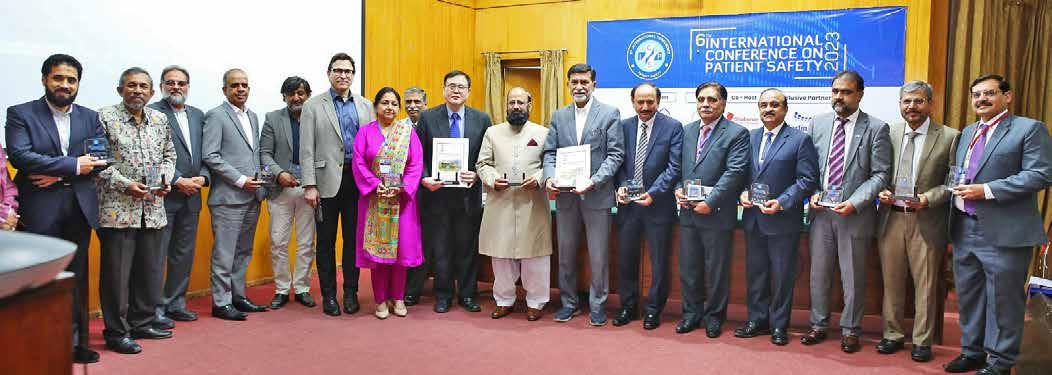
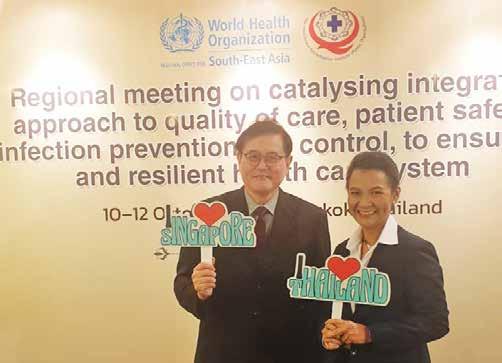
IPSQ was invited to speak at various international events including the 23rd Healthcare Accreditation Institute of Thailand National Forum on “Building Safety Culture in the Healthcare System” in March 2023.
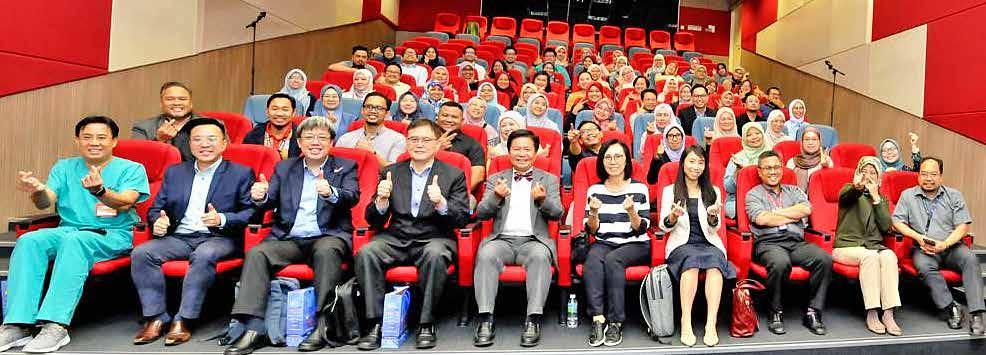
52 SingHealth Duke-NUS Academic Medical Centre
Speaking invitation at Lahore 6th International Conference on Patient Safety on “Engaging Patients and Families to Co-design Safety in your Healthcare Facility” in March 2023
At the World Health Organization South-East Asia’s “Regional Meeting on Catalysing Integrated Approach to Quality of Care, Patient Safety, Infection Prevention and Control to Ensure Safe and Resilient Health Care System” in October 2022
Raising academic standards for patient safety & healthcare quality
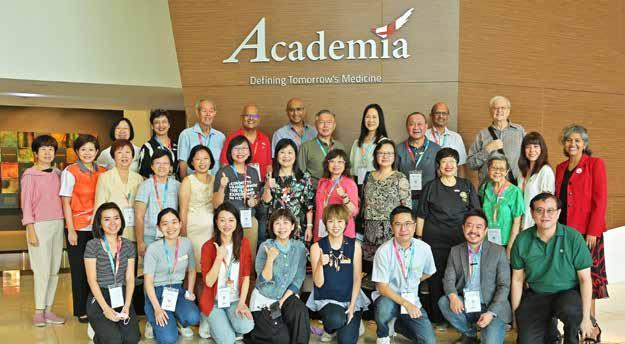
The Journal of Patient Safety and Healthcare Quality (JPSHQ) was published in collaboration with the Healthcare Quality Society of Singapore. JPSHQ is a culmination of efforts by members in the healthcare community who seek to raise academic standards of PSHQ in Asia and beyond. JPSHQ published two issues in 2022, which attracted a total of 21 and 25 submissions respectively. In December 2022, experts from the region were invited to be part of the International Editorial Board, which was established with members from Japan, Thailand, India, Indonesia, Cambodia, Sri Lanka, Maldives, Malaysia and Mauritius.
For more information, visit JPSHQ Current Issue | Healthcare Quality Society of Singapore
Published at the SingHealth Duke-NUS Quality & Innovation Day 2023, the IPSQ Patient Safety & Quality Archives (PSQA) aimed to achieve a systematic compilation of academic posters and abstracts for valuable learnings. It provides a stage for staff to showcase their patient safety and quality improvement projects across SingHealth, and has since released four volumes. A total of 247 projects have been consolidated digitally and archived academically in PSQA Volume Four.
Partnering patients and caregivers for patient centric healthcare & co-creation

Since its inception in 2017, SPAN has grown into an active and involved group that drives patient partnership - with more than 50 advocates, and 140 engagements and projects. Besides improvement projects, SPAN also developed and conducted customised training for healthcare teams, for example, the SingHealth Residency Nurse Leadership Programme on “Creating Best Patient Experience”.
In October 2022, SPAN organised the first Singapore Patient Advocate Connection (SPACe), which was attended by Guest of Honour Ms Rahayu Mahzam, Senior Parliamentary Secretary, MOH. With support from IPSQ and
Group Office of Patient Experience, SPACe brings together patients, caregivers and healthcare professionals to share insightful stories and best practices, and raise awareness on the importance of partnership between patients and healthcare teams in improving care quality.
Achieving academic knowledge through education and mentorship programme with Duke Global Health Institute
In 2022, IPSQ participated in a faculty mentorship programme to mentor global health postgraduate students from Duke Durham and Duke Kunshan. During their internship with IPSQ, the students worked on “Patient Awareness, Involvement and Learning Needs in Health Technology Assessment: Results of an International Survey” and “Patient Safety Practices in Asia-Pacific Countries: A Survey based on Strategic Objectives of the Global Patient Safety Action Plan Framework by the World Health Organization”.
53 Annual Report 2022/2023
Members of SPAN and IPSQ at IHI Forum in December 2022, where they shared how the SPAN model helped to build a strong patient advocacy network for the healthcare system.
CONTRIBUTING TO A HEALTHIER TOMORROW THROUGH EDUCATION
Healthcare educators nurture the next generation of healthcare professionals. Their commitment to excellence fosters a healthier tomorrow.
Emerging from the pandemic stronger & better: Academic Medicine Advisory Council Meeting 2022
The fifth AMAC meeting, which took place from 25 to 28 October at SingHealth Duke-NUS AMC, had several objectives. Besides reviewing the AMC’s progress, it also sought to enable the exchange of best practices and insights, and to provide recommendations for the future.
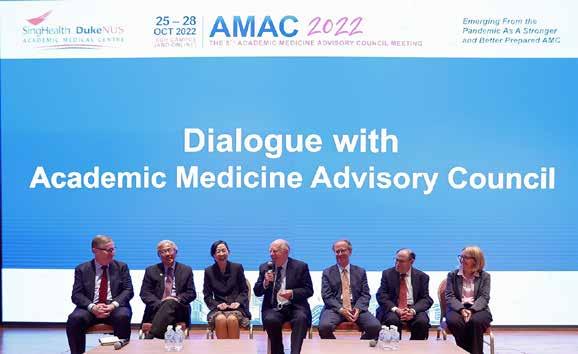
Welcoming AMAC members and participants in the opening address were Prof Thomas Coffman, Dean of Duke-NUS, and Prof Ivy Ng, GCEO, SingHealth. There were three themes: health in an ageing population, healthcare innovation and the importance of interdisciplinary partnerships. The ensuing dialogues and tea sessions focused primarily on these.
The AMAC panel also took the opportunity to introduce three new members: Prof Gillian Harvey, Flinders University; Prof Margaret Chan, Founding Dean of Vanke School of Public Health, Tsinghua University; and Prof Victor Dzau, President of the National Academy of Medicine.
Other members of the panel include AMAC Chairman, Emeritus Regius Prof Sir Keith Peters (University of Cambridge); Prof Arthur Rubenstein (University of Pennsylvania); and Prof Sam Hawgood (University of California San Francisco). They delivered keynote lectures during the “Academic Hour with AMAC” sessions, sharing insights into population health and interdisciplinary collaboration, as well as strategies on innovation and implementation.
Prof Chan, who was the former head of WHO, spoke on the importance of a coordinated response to address non-communicable diseases on a global scale. During Sir Peters’ presentation on the panel’s findings, he congratulated the AMC on its progress and highlighted remarkable improvements made based on previous recommendations. Finally, Prof Coffman expressed his appreciation to the council for their recommendations, emphasising their significant contribution in shaping AMC’s path.
Prof Ng also extended her thanks to the Duke-NUS and SingHealth Governing Boards, as well as the co-chairs of AMAC 2022 Organising Committee: Clinical Associate Prof Adrian Koh, Prof Nicholas Graves, and Cl Assoc Prof Chow Wan Cheng.
SingHealth Duke-NUS AMC is looking to implement the council’s recommendations, before the next meeting in 2025.
54 SingHealth Duke-NUS Academic Medical Centre
Education Excellence
Recognising excellence in healthcare education
AMEI Golden Apple Awards recognises outstanding educators in SingHealth and Duke-NUS for their teaching excellence. For helping to raise healthcare education standards with their passion, dedication and innovation, 61 were honoured in 2022.

GENERATIVITY AWARD FOR EDUCATORS
Professor Ian Yeo Yew San Senior Consultant, Medical and Surgical Retina Department, SNEC
Professor Lalit Kumar Radha Krishna Senior Consultant, Division of Supportive & Palliative Care, NCCS
Associate Professor Tan Lay Kok Head & Senior Consultant, Maternal Fetal Medicine, Obstetrics & Gynaecology, KKH
Ms Teh Nguan Kheng
Assistant Director, Nursing (Education), SGH
OUTSTANDING EDUCATOR AWARD
Clinical Associate Professor Mok Yee Hui Head & Senior Consultant, Children’s Intensive Care Unit, KKH
Ms Ooi Seow Yin Karen Senior Nurse Educator, SingHealth Alice Lee Institute of Advanced Nursing, SGH
OUTSTANDING YOUNG EDUCATOR AWARD
Ms Cheng Qianhui Senior Executive, Neuroradiology, NNI
Dr Gabriel Yee Wenjun Associate Consultant, Post-Acute & Continuing Care, SCH
Ms Kathlyn Wang Yuting Nurse Educator, SingHealth Alice Lee Institute of Advanced Nursing, SGH
Dr Song Yi Lin Consultant, Orthodontics, NDCS
Mr Tay Yi Xiang Principal Radiographer (Education), SGH
PROGRAMME EXCELLENCE AWARD
CHEER Programme by SingHealth Academy College of Allied Health (CAH) and SingHealth Group Allied Health (GAH)
Disaster Medical Responder’s Course (DMRC) by CGH, KKH, Khoo Teck Puat Hospital, Ng Teng Fong General Hospital, National University Hospital, SGH, SKH, Tan Tock Seng Hospital, Woodlands Health Campus & the SingHealth Duke-NUS Institute of Medical Simulation (SIMS)
ICU Prone Positioning Training Programme by SGH
Let Us THRIVE Together – SingHealth Duke-NUS Institute for Patient Safety & Quality THRIVE Programme by KKH, SHP, SGH, Group Office of Patient Experience, NHCS & Duke-NUS
55 Annual Report 2022/2023
Re-invigorating healthcare education: connecting hearts, cultivating minds
On 16 and 17 September 2022, the first hybrid SingHealth Duke-NUS Education Conference successfully reconnected over 900 delegates through fellowship and learning. Thought leaders, experienced and budding educators, and learners from various health professions refocused their purpose and passion in healthcare education across more than 40 education sessions, as they shared ideas and teaching practices and learning insights for better patient outcomes. The conference also recognised 31 educators and teams during an oral presentation and e-poster competition, which received more than 70 education research and stories from the world over.
Celebrating oral health excellence
On 25 June 2022, the virtual Singapore Oral Health Congress was attended by more than 350 delegates including oral health specialists, general oral health practitioners, oral health therapists, students and researchers. Held as part of NDCS’ 25th anniversary celebrations, the Congress celebrated the development of NDCS as Singapore’s flagship specialty centre for oral care. It also aimed to enable the exchange of clinical knowledge and inspire collaboration among professionals in oral healthcare.
Equipping oral health professionals with skills in clinical endodontics
Ten general dental practitioners graduated from SingHealth Academy College of Clinical Dentistry’s inaugural Certificate Course in Clinical Endodontics. This four-month course educates and equips oral health practitioners with knowledge and skills to perform endodontics diagnosis and treatments confidently and accurately.

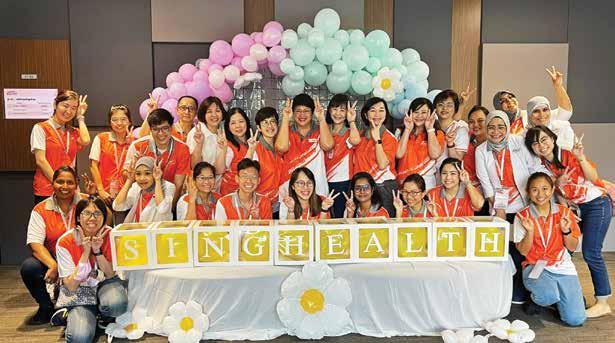
Shaping nursing care for the future
SingHealth Academy College of Clinical Nursing introduced monthly in-service sessions in 2022 where nurses could share knowledge and skills on nursing care. These sessions aim to leverage good nursing practices across different SingHealth institutions, and improve the delivery of patient care. Each session was attended by 430 nurses on the average.
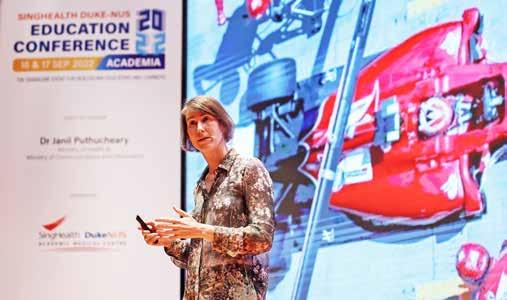
56 SingHealth Duke-NUS Academic Medical Centre
Nurturing budding nursing leaders
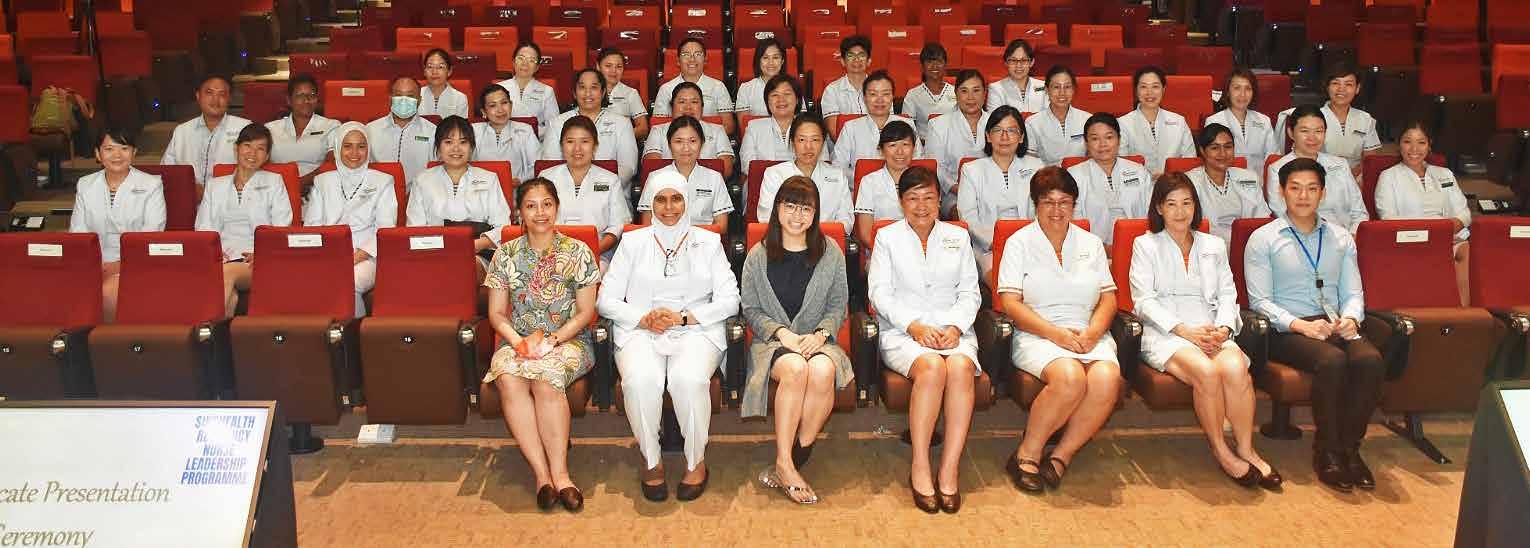
Forty nurse clinicians, educators and managers graduated from the inaugural SingHealth Residency Nurse Leadership Programme. A customised modular curriculum that develops
Nurturing the next generation of healthcare administrators
More than 80 Singapore Management University (SMU) students have benefitted from the SMU-SingHealth Health Economics Management (HEM) internship programme since its launch in 2019. Among those who have graduated, three are full-time administrators with SingHealth and
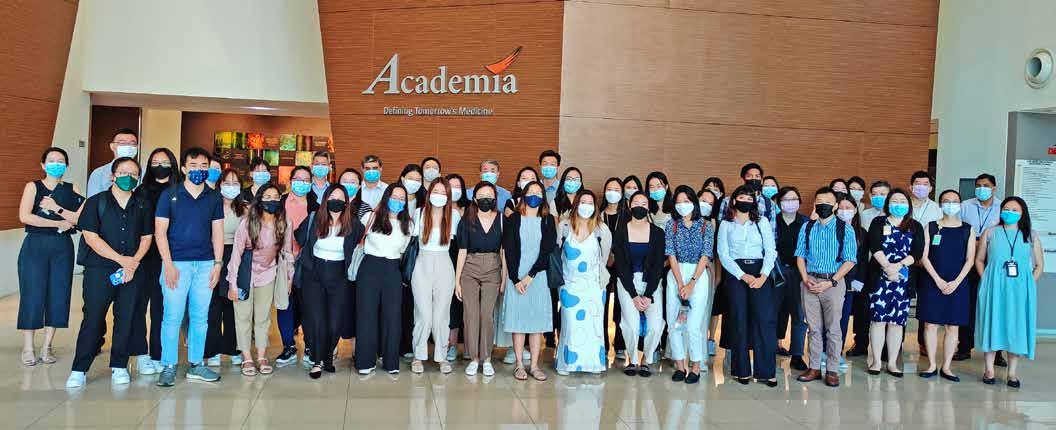
and fulfils the learning needs of young nursing leaders, it focuses on three components of Self (Self-discovery); Relationships (Relationships & Connectedness), and Leadership (Essentials of a Leader & Organisational Management).
one is undergoing the SingHealth Healthcare Management Executive (HME) programme. HEM endeavours to develop new healthcare administrators by equipping them with knowledge in public healthcare administration and offering a wide range of internship opportunities across institutions in areas such as strategic planning and management, risk management, and finance.
57 Annual Report 2022/2023
Developing tomorrow’s healthcare leaders
In November 2022, the SMU-SingHealth Graduate Diploma in Healthcare Management and Leadership* programme welcomed its 15th cohort of healthcare leaders. It equips them with essential knowledge and competencies in public healthcare
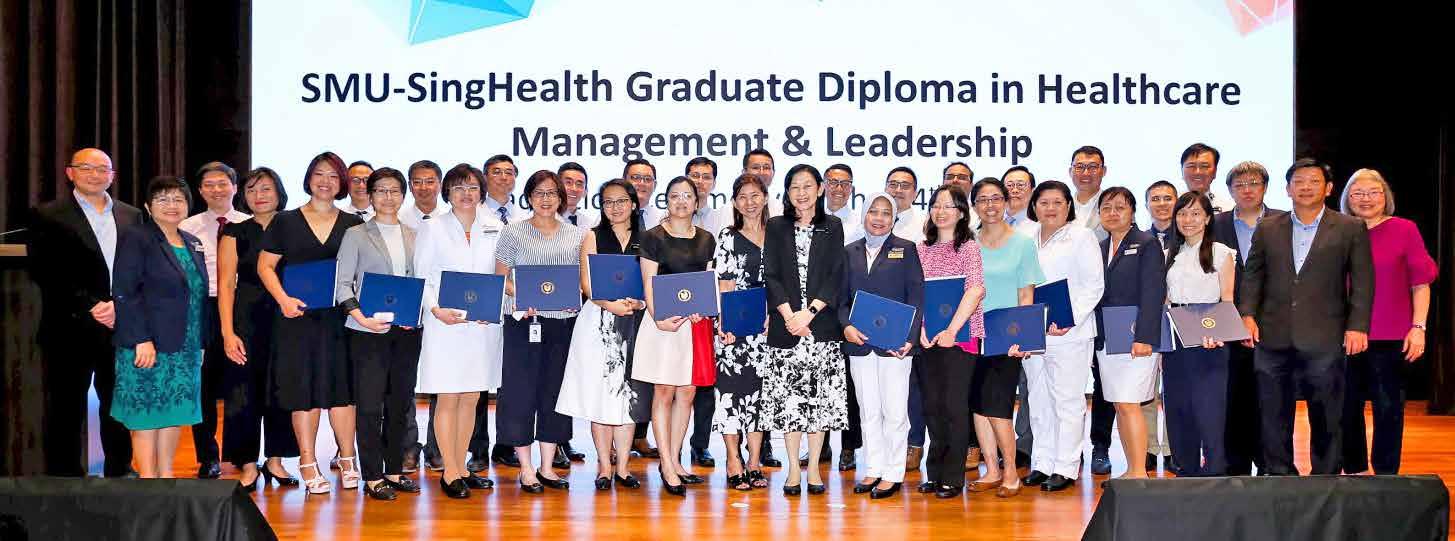
Transitioning to MOH’s new accreditation model
SingHealth Residency migrated 33 Residency programmes, comprising more than 2,500 Faculty, Residents and administrators to MedHub, a new Residency Management System that seeks to strengthen the evaluations and better capture training and assessment data of its Residents. Together with the adoption of Singapore Specialist Training Standards, it is part of SingHealth Residency’s efforts to ensure a smooth transition of its ACGME-I programmes to MOH’s new accreditation model.
Equipping leaders to shape singapore’s healthcare
The ‘Resident Plus’ initiative is a series of developmental programmes that equips residents with essential knowledge and skills to become future leaders, who will help steer the evolution
management and business leadership. The programme, which continued online through the pandemic, has nurtured more than 340 competent and committed healthcare leaders.
*organised by SingHealth in partnership with SMU and facilitated by SingHealth Academy College of Healthcare Administration and Leadership
of healthcare system. In its continuing efforts to support Residents, SingHealth Residency underwent several changes in 2022, such as:
• Further enhancement of its SingHealth Residency Leadership Programme with three new modules that were trained and facilitated in-house by SingHealth faculty and alumni.
• The pioneer batch of 11 Resident-Educators graduated from Junior Educator Development Initiative – a nine-month mentoring programme that enables Residents to network and be mentored by senior educators.
• Designed to nurture and attract young research talents to join SingHealth Residency after their graduation, the preceptorship programme was successfully re-initiated after a year’s hiatus. It was held virtually for Duke-NUS Doctor of Medicine (MD) and Doctor of Philosophy (PhD) students across 11 ACP.
58 SingHealth Duke-NUS Academic Medical Centre
Strengthening education and research collaborations for better patient care
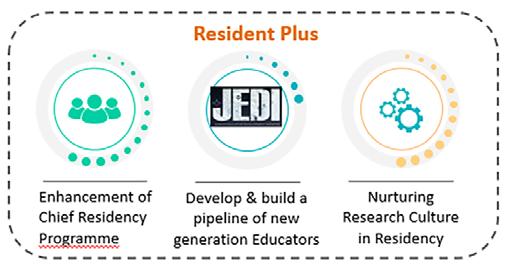
Held from November 2021 to April 2022, the virtual Global Health Programme* equipped 14 radiation therapists, nurses and radiation oncologists from Calmette Hospital, Cambodia, with basic and advanced knowledge and skills in evidence-based clinical practice. Topics included patient safety, quality assurance and site-specific treatment management. The programme is part of SingHealth’s efforts to strengthen its strategic partnership with healthcare providers in the ASEAN region to foster education and research collaborations for better patient care.
*launched by NCCS Division of Radiation Oncology; endorsed by SingHealth Academy CAH, and supported by SingHealth International Collaboration Office and GAH.

Embracing, engaging & excelling in change to improve patient care
From 13 to 15 October 2022, nearly 900 delegates from Singapore and the region attended the second Singapore Allied Health Conference. Held virtually, the event was themed “Embrace, Engage, Excel in Change” and focused on areas such as leadership; preventive and population health; innovation and digital strategies; and mental wellness and resilience. An extensive programme of pre-conference workshops, plenary lectures and panel discussions allowed allied health professionals to exchange knowledge and best practices. This will inspire growth and progress and enable the community to cater to patients’ evolving needs.
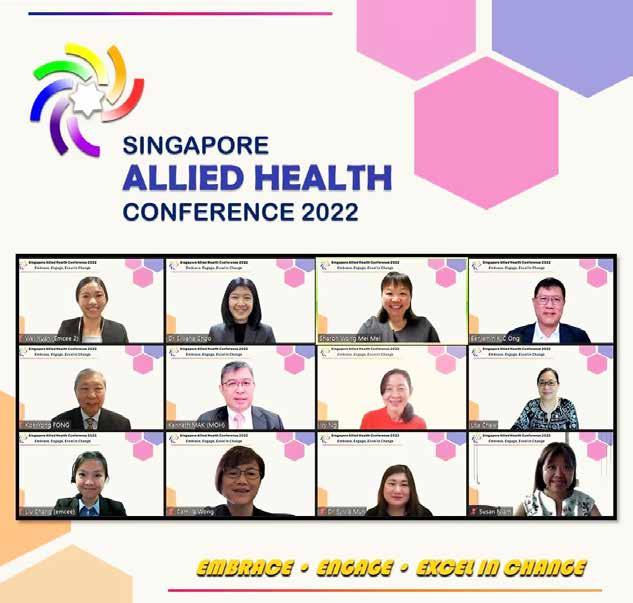
59 Annual Report 2022/2023
Technology Enhanced Learning & Innovation
Transforming the healthcare simulation spectrum: now, next & beyond
Held from 19 to 21 October 2022, the S3 Conference gathered more than 450 healthcare simulation experts and educators at the Academia to share
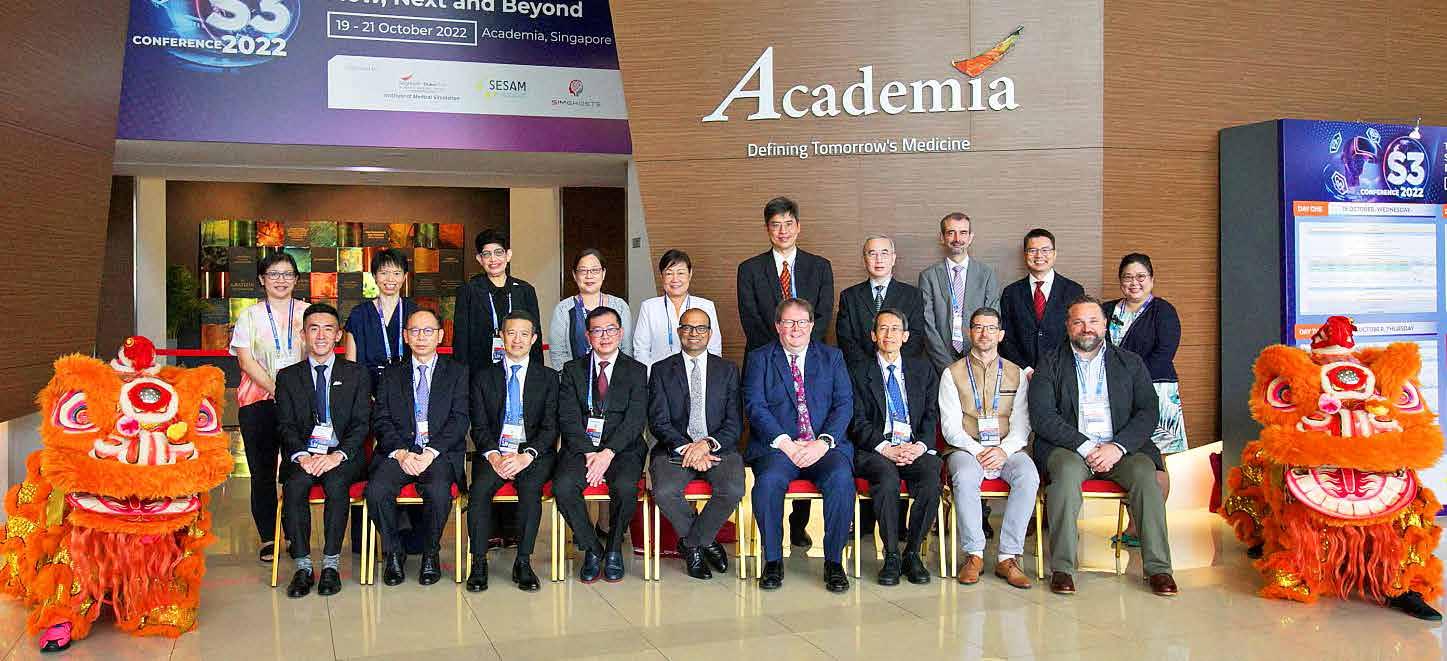
Developing capabilities in healthcare simulation
To meet the growing demand for simulation in healthcare education, SIMS continually introduces new courses to equip educators with knowledge and skill sets to harness its potential. One such programme is the Fundamentals of Instructional Series Game Design and Development, which has trained more than 100 participants since its launch in September 2021. Collaborations with strategic partners are also in the pipeline to develop more technology and enhanced learning workshops. These will enable healthcare professionals to better understand the value of serious games and how they can deploy digital tools in their training programmes.
ideas and best practices across a wide range of topics in healthcare simulation. Conference workshops and lectures helped to ignite ideas and foster collaborations that will enable the community to push past boundaries in healthcare simulation and enhance patient care delivery.
Enhancing digital capabilities & professionalism of healthcare learners
On 7 September 2022, more than 100 oral health professionals and education leaders gathered virtually for the Oral Health Academic Clinical Programme (ORH ACP) Education Day. Designed as a vibrant interdisciplinary sharing of experiences, it enhances digital capabilities and professionals in healthcare learners. Outstanding oral health educators were also recognised during the ORH ACP Excellence in Teaching Awards.
60 SingHealth Duke-NUS Academic Medical Centre
Reimagining the future of learning
The SingHealth Virtual Classroom system was launched in 2022 at Academia to meet the evolving healthcare education needs of its educators and learners. With a wide range of interactive features that enable meaningful social interactions and enrich learning, the system supports both virtual and hybrid classroom settings. Up to 48 learners can enjoy a rich and engaging experience in a virtual learning environment at the same time.
Fostering Well-Being
Improving workplace communication for better patient care
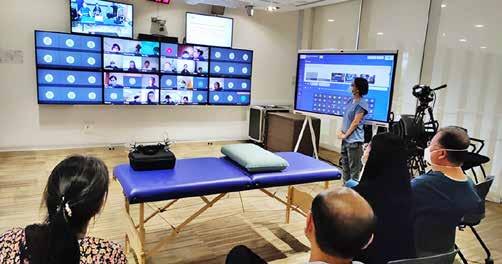
As part of the Senior Academic Clinician Development programme jointly organised by SingHealth Academy College of Clinical Medicine and Duke-NUS Appointments and Development Department, the pilot run of the Team Communications workshop launched in May 2022. Besides improving communication and patient care, the workshop also strives to enhance clinicians’ well-being in the AMC. It was attended by 18 clinicians, many of whom felt that the interactions during the workshop helped to successfully break down the hierarchical barrier between senior and junior clinicians.
Developing education needs of future health professionals
Close to 160 senior management, Allied Health educators and administrators attended the inaugural SingHealth Academy CAH Education Town Hall on 15 August 2022. Apart from CAH’s education achievements, guest speakers also
shared new education developments such as the AMEI Educator Development Framework as well as effective teaching tips and practices for junior educators. Held virtually, the event culminated in a panel discussion with senior management addressing current issues faced by Allied Health educators, and shedding insights on resources and support to enhance education needs of health professionals.
New master’s programme focuses on translating research into real-world solutions
Duke-NUS, in collaboration with Eureka Institute, launched the Master of International Translational Medicine (MITM) programme. The first and only course of its kind in Singapore, this interdisciplinary programme aims to bridge the gap between laboratory research and realworld solutions, and offers academic and industry professionals the opportunity to develop faster and better medical treatments. This is key to keeping Singapore’s medical research scene at the forefront.
MITM is the latest addition to its researchintensive offerings, which cover bench work, clinical research, and translational medicine. The programme develops compassionate and informed clinician scientists who are well-versed in conducting research.
Duke-NUS continually enhances its programmes through global partnerships. MITM was launched in collaboration with Eureka Institute, an Italian non-profit that initiates global collaborative translational medicine programmes. This partnership allows students in MITM to leverage leading industry experts from the Eureka network, providing them with valuable insights and expertise.
MITM connects legislative and regulatory experts with medical researchers to facilitate the process of introducing newly developed drugs into the market. By offering a deep-dive into understanding and evaluating research studies, the programme equips students with the knowledge and insight to develop effective patient-based solutions.
61 Annual Report 2022/2023
Duke-NUS welcomes its 16th cohort of medical students aspiring to become tomorrow’s clinicians
On 19 August, Duke-NUS’ latest cohort of 72 medical students completed a rite of passage White Coat Ceremony. The Class of 2026 is also the first to benefit from the school’s recent curriculum change, which introduces social prescribing into the first-year curriculum of its MD programme. MD trains doctors to direct patients to the community to improve their health and lifestyles, in line with MOH’s directive to prioritise population health through community support.
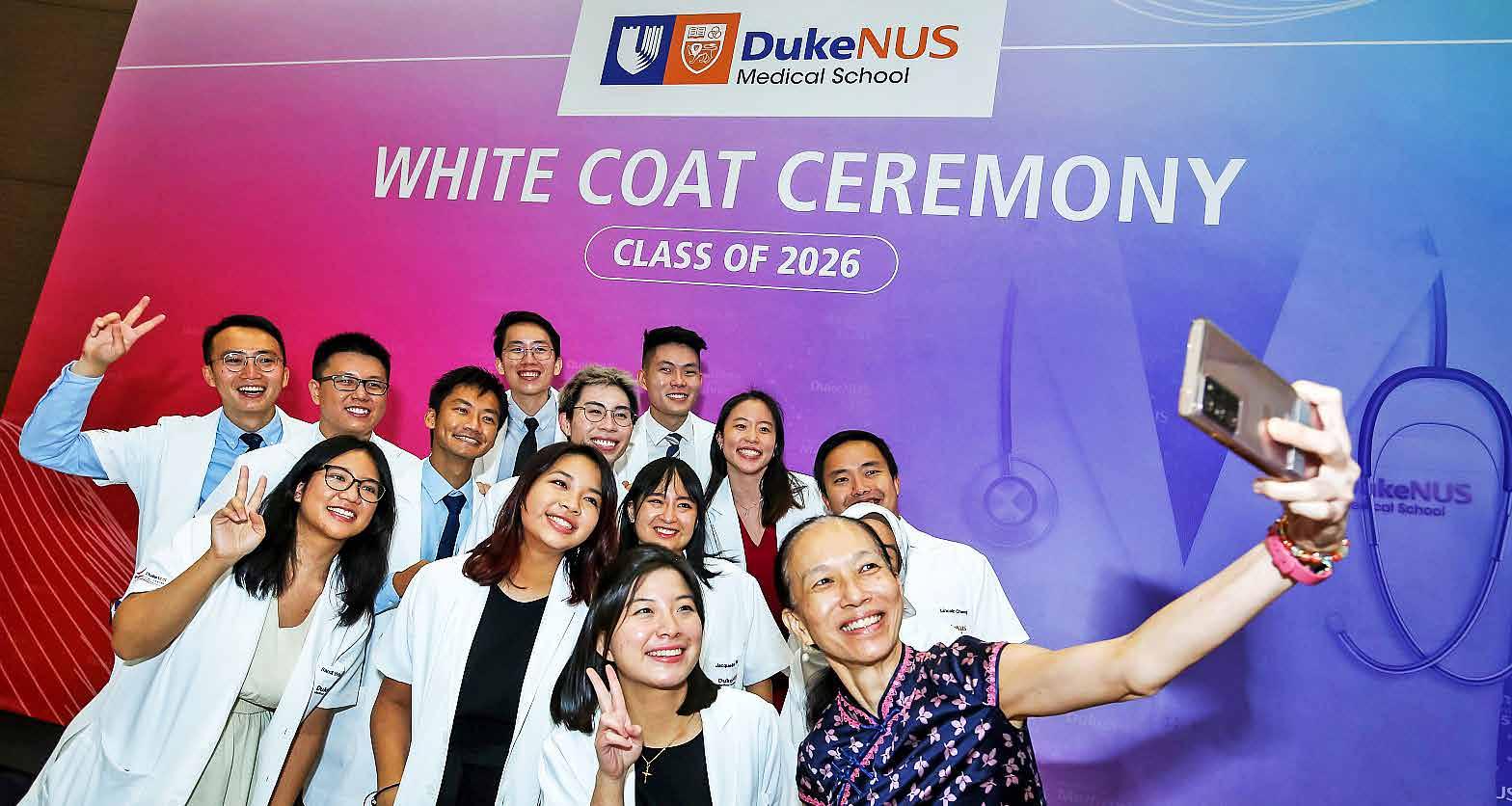
At the White Coat Ceremony, the students were proudly decked out in their personalised white coats—a symbol of the medical profession—and recited the Hippocratic Oath. They were joined by their families, as well as the school management, faculty, current students, alumni and staff.
Founded on Duke-NUS’ ‘Clinicians First, Clinicians Plus’ approach, the four-year MD programme nurtures students into competent clinicians who contribute meaningfully to the healthcare system as scientists, educators, innovators and leaders. Through the school’s strategic partnership with SingHealth, students can receive world-class training in a rich, multidisciplinary ecosystem provided by Singapore’s largest public healthcare group.
Duke-NUS inducts second cohort of outstanding clinicians into its prestigious hall of master academic clinicians
At a hybrid ceremony held on 25 February 2022, eight exceptional clinicians were inducted into Duke-NUS’s prestigious Hall of Master Academic Clinicians, the school’s highest recognition for
outstanding clinical faculty. This is the second cohort of clinical faculty to be inducted into the Hall; the first was in January 2021.
The inductees represent seven of 15 SingHealth Duke-NUS ACPs, which were established for each clinical specialty to facilitate residency training for Duke-NUS students upon graduation. They came from SGH, SKH, KKH, NDCS, NHCS and SHP.
62 SingHealth Duke-NUS Academic Medical Centre
The ceremony was attended by Mr Goh Yew Lin, Chairman of the Governing Board, Duke-NUS Medical School; Mr Cheng Wai Keung, Chairman, SingHealth; and senior leaders of both Duke-NUS and SingHealth. They were joined by members from across the SingHealth Duke-NUS AMC.
The Hall of Master Academic Clinicians honours outstanding clinicians who train and mentor medical students and young clinicians, and pursue academic excellence to improve the lives of patients in Singapore and beyond. The Hall is one of several ways Duke-NUS recognises its clinical faculty.
New programme to nurture the next generation of clinician-innovators at Duke-NUS
Hosted at Duke-NUS, the new Health Innovator Programme is an immersive experience for thirdyear medical students, who will partner with peers from the NUS’ engineering and business programmes, and be mentored by clinicians and industry partners. This inaugural cohort comprises nine students who will focus on innovations in women’s health.
The programme brings together stakeholders from the innovation ecosystem, including innovation champions like Professor Dean Ho from NUS, representatives from industry such as Enterprise Singapore and startups like Vivo Surgical as well as clinician mentors from SingHealth.
Speaking during a panel discussion, four students from the inaugural cohort shared about their projects, their motivation for participation, and challenges they had to overcome. With topics ranging from in-vitro fertilisation to fibroid surgery and prenatal ultrasound technology, students will be assigned to explore solutions and develop prototypes before presenting their projects at a Shark Tank-style presentation.
Duke-NUS graduates future-ready clinicians to make an impact in healthcare and biomedicine ecosystem

On 28 May 2022, Duke-NUS celebrated the graduation of the Class of 2022, which comprised 66 students. The first in-person ceremony after two years was attended by Guest of Honour Mr Chan Chun Sing, Minister for Education, as well as graduates, their families and invited guests.
In line with Duke-NUS’ “Clinician First, Clinician Plus” educational approach, the 53 MD graduates were selected through a stringent admissions process. It requires them to excel in the Medical College Admissions Test administered by the Association of American Medical Colleges.
Having students from different backgrounds— some were previously trained in law, finance and engineering—enables Duke-NUS to nurture multifaceted clinicians with an innate ability to grow into clinician-scientists, innovators, educators, entrepreneurs and leaders who can offer innovative solutions and deliver world-class patient care.
The event also recognised graduates who excelled academically and for their community service and leadership abilities. These awards included Singapore Medical Association’s Lee Foundation Achievement Prize and Academy of Medicine’s Singapore Medal for Outstanding Leadership.
63 Annual Report 2022/2023
SDGHI LEADS THE CHARGE TO TACKLE INTERNATIONAL HEALTH CHALLENGES
The SingHealth Duke-NUS Global Health Institute (SDGHI) is an enabling platform for global health activities across the SingHealth Duke-NUS AMC. It seeks to advance health and well-being in Southeast Asia and beyond. Its strategies focus on addressing pressing health challenges and developing future leaders in global health through innovative solutions, programmes and partnerships.
Driving the One Health agenda / cross-sectoral and multilateral cooperation on the One Health front
SDGHI was selected to host the seventh World One Health Congress, the world’s premier Congress to advance the One Health agenda.
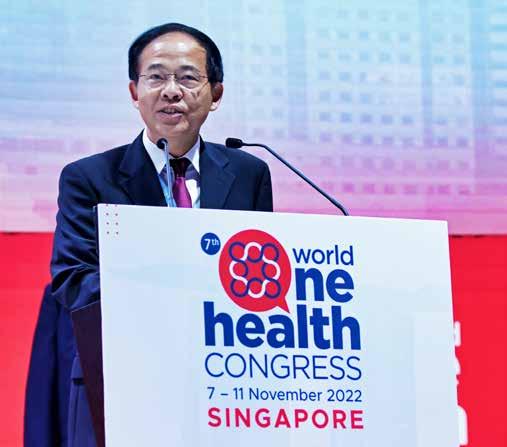
Themed “Integrating Science, Policy and Clinical Practice: A One Health Imperative Post-COVID-19”, the Congress emphasised the importance of the human-animal-ecosystem interface as it relates to health, society, and the economy.
Held in November 2022 against the backdrop of the COVID-19 pandemic, the Congress was attended by more than 2,200 attendees from 74 countries and brought together experts from the academic world, civil society, governments, the private sector and multilateral organisations. This not only provided a rich platform for expanding networks and knowledge exchange, but also raised the profile of SDGHI through local and international media coverage.
The long-standing global One Health movement, which is based on the principle of the interdependence of human, animal and environmental health, was brought to the forefront. The pandemic provided a tangible example of how instability at the human-animal-ecosystem interface caused by the rapid pace of globalisation, population movement, animal trade and biodiversity loss can have serious negative effects on health, society, and the economy, and the need for collective action to address this.
Mdm Halimah Yacob, President of the Republic of Singapore was the Guest of Honour and other distinguished guests in attendance included; Dr Tedros Adhanom Ghebreyesus, DirectorGeneral of WHO; Dr Maria Van Kerkhove, COVID-19 Technical Lead of WHO; and Dr Monique Eloit, Director General of World Organisation for Animal Health.
64 SingHealth Duke-NUS Academic Medical Centre
Enhancing regional health security / Duke-NUS centre for outbreak preparedness
SDGHI harnesses the strengths and expertise of SingHealth and Duke-NUS to address health challenges across Asia and beyond. SDGHI has implemented cross-cutting enabling platforms such as The Duke-NUS Centre for Outbreak Preparedness (COP). Launched on 10 June 2022, the event was graced by Deputy Prime Minister Heng Swee Keat.

COP serves as a collaborating centre that aims to further strengthen regional research capacity and cooperation and preparedness against future pandemics and public health threats. Leveraging Duke-NUS’ close ties with its parent universities— Duke University and NUS—the Centre also works closely with key local and regional partners and government entities.
South and Southeast Asia have been identified as hotspots for increased infectious disease outbreaks due to the population density, environmental change, shifts in human-animal interaction and increasing human mobility. In view of this, COP works with partners in the region to improve laboratory capacity to study pathogens with pandemic potential, enhance methods for early detection, accelerate innovations in
diagnostics, vaccine and therapeutics research and development, and support health systems capacity for managing outbreaks.
Together with partners and stakeholders, COP manages the Asia Pathogen Genomics Initiative (APGI), a Duke-NUS initiative with the Bill & Melinda Gates Foundation, which will expand genomic sequencing capacity across countries in South and Southeast Asia.
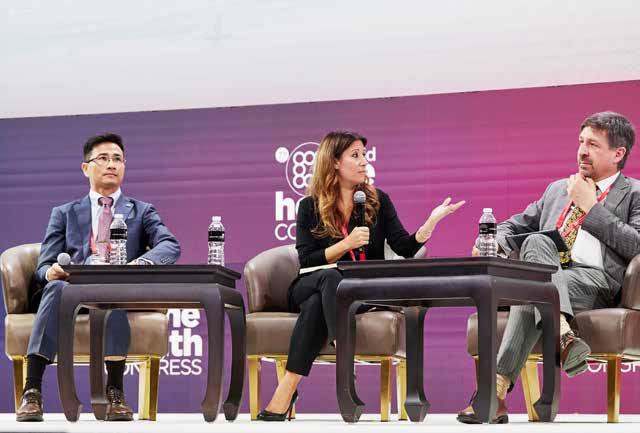
65 Annual Report 2022/2023
Building a collaborative global health ecosystem
SDGHI has been actively involved in the organisation and support of activities within the AMC that aim to expand the collaborative network of global health professionals in the region.
These include the Inaugural Asian Surgery Network Symposium held in February 2023, where regional surgical leaders and representatives came together to share key insights into their diverse experiences managing the impact of COVID-19 on their healthcare systems.
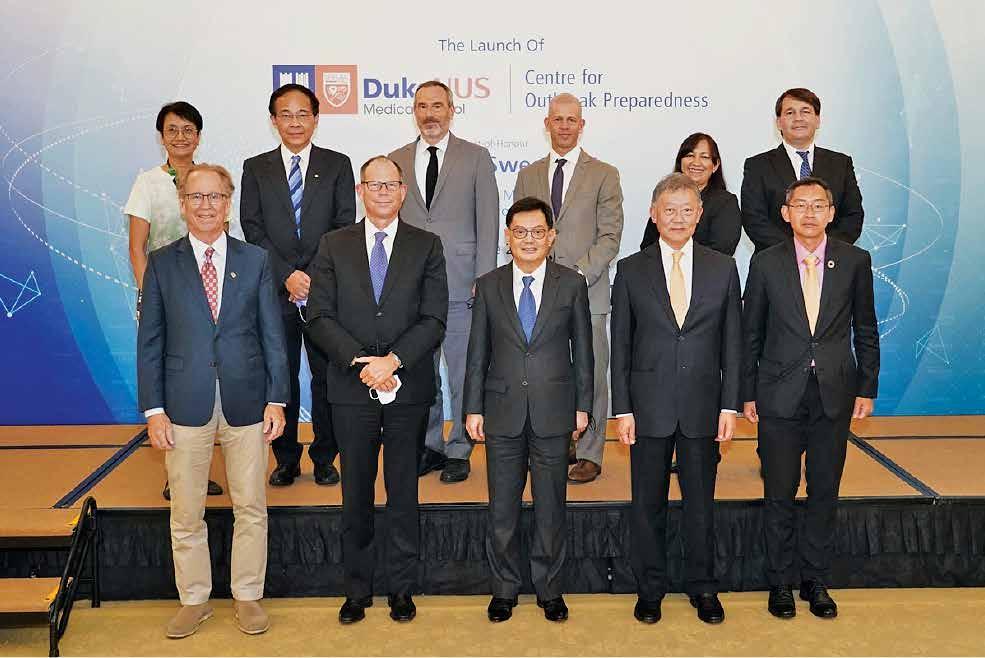
With country borders reopening, the SingHealth International Collaboration Office and SDGHI teams were also able to reconnect with key partners in the region this past year. In particular, they hosted delegations from the University of Sumatera Utara, and the University of Jaffna to not only deepen collaboration, but also lay the foundation for the Global Health Regional Collaborating Centres (RCC) in Medan and Jaffna respectively. These RCCs aim to enable, catalyse and optimise global health programmes in the region and will be operationalised in FY2023.
With the objective of building a collaborative Global Health ecosystem within the AMC, SDGHI drives various initiatives to encourage and enable research, education, and capability-building.
66 SingHealth Duke-NUS Academic Medical Centre
KEY ACTIVITIES, PROGRAMMES AND FUNDING SUPPORT
ACROSS THESE AREAS IN THE PAST YEAR INCLUDE:
Global Health Grants awarded
ACP Programme Funding: 6 - $289,000
SDGHI Pilot Grants: 2 - $100,000
Participants in Global Health educational programmes
Publications affiliated with SDGHI:
27
Global Health Fellows Programme Scholarships Awarded – 3
Global Health PhD Scholars Track – 3
Introduction to Global Health Module Participants: 25
No. of funders across multilateral (7), philanthropic (3), private (11) and public agencies
(5): 26
Amount raised: $5,528,594
Percentage of Funding for SDGHI Initiatives by Sector:
BY CATEGORIES
24% 24% 11%
41% 67 Annual Report 2022/2023
Multilateral Private Companies Philanthropies Public Agnecies
RESEARCH: TRANSFORMING MEDICINE
Our quest to continually expand knowledge about diseases can improve patient outcomes, inform clinical practice and reduce healthcare costs.
Better prediction of treatment outcomes for natural-killer/T cell lymphoma tumour patients
A set of 13 genes identified through the sequencing of 260 tumour samples has shown to better predict treatment outcomes for patients with natural-killer/T cell lymphoma tumours. Published in the American Journal of Hematology in September 2022, the study found that patients with poorer prognosis carry one or more of these gene mutations. These findings could significantly improve current prognostic models based solely on clinical parameters by identifying patients not responding well to chemotherapy and radiotherapy, enabling better disease management. This joint study was led by SingHealth Duke-NUS AMC researchers, including Professor Patrick Tan, Senior ViceDean, Office of Research, Duke-NUS and Senior Scientific Advisor, SingHealth; Prof Teh Bin Tean, Director, SingHealth Duke-NUS Institute of Biodiversity Medicine and DCEO (Research), NCCS; Prof Steven Rozen, Duke-NUS; and Associate Professor Ong Choon Kiat, Principal Investigator, Lymphoma Genomic Translational Research Laboratory, NCCS.
New insights into molecular pathways in gastric cancer
In a study published in Cancer Discovery in March 2022, Prof Patrick Tan led the assembly of the world’s largest and highest-resolution single-cell atlas of gastric cancer, a leading cause of global cancer death. The atlas provided novel insights into how molecular pathways drive gastric cancer growth, how tumours differ among patients, and how the disease can be better treated. Prof Tan’s other research - based on a large Phase III clinical trial of patients - identified gene activity that predicts their response to treatment with a chemotherapy drug known as paclitaxel. This was reported in Gut in April 2022.
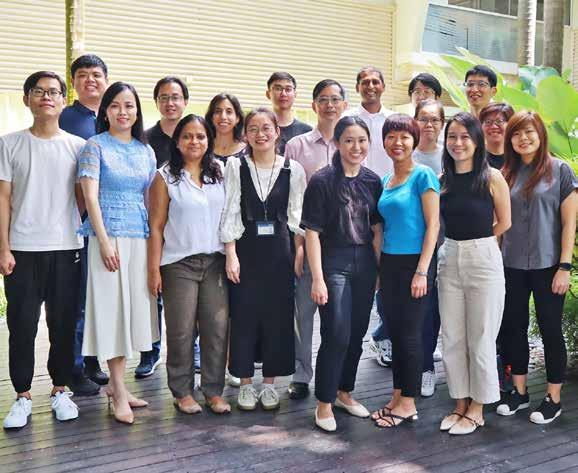
68 SingHealth Duke-NUS Academic Medical Centre
Singapore clinician-scientist part of international team that wins british heart foundation challenge to save youths from heart disease
An international team of researchers, including Prof Stuart Cook, Tanoto Foundation Professor of Cardiovascular Medicine, SingHealth Duke-NUS AMC; and Distinguished Clinician Scientist and Senior Consultant, Department of Cardiology,
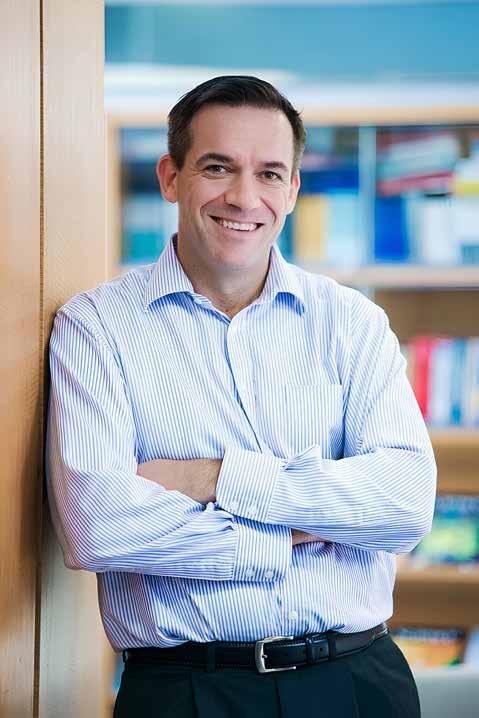
Targeting IL-11 in a novel therapeutic approach against Alport Syndrome
A new treatment strategy that inhibits Interleukin-11 (IL-11), a cell-signalling protein, offers fresh hope to patients of Alport Syndrome. Assistant Professor Anissa Widjaja’s study, published in Journal of the American Society of Nephrology in February 2022, revealed that administering anti-IL-11 therapies in the form of an antibody drug can reduce severity of Alport Syndrome. This drug also curbs kidney injury, inflammation and scarring, and improves kidney function in preclinical models. More importantly, combining anti-IL-11 therapies and angiotensinconverting enzyme inhibitors (ACEi) - the current standard of care for Alport Syndrome - increased lifespan by more than 400 per cent compared to treatment with just ACEi. Asst Prof Widjaja and her team are investigating if anti-IL-11 therapies can promote tissue regeneration and reverse kidney failure.

NHCS, was awarded £30 million (approximately S$50 million) at the British Heart Foundation’s (BHF) Big Beat Challenge. It is the largest award in BHF’s 60-year history.
The team, named CureHeart, which comprises scientists from UK and US, aims to develop effective cures for inherited heart muscle diseases. Prof Cook’s work in Singapore is particularly relevant, given the differences in genetic makeup between Asians and other ethnic groups and their impact on prevalence and course of several cardiovascular disorders.
Cureheart will pioneer ultra-precise gene therapy technologies that silence or edit faulty genes that cause cardiovascular diseases. Specifically, by using preclinical models, it explores how Interleukin-11 contributes to pro-inflammatory responses in genetic heart muscle disease and develop antibody therapies to target this protein. This can help to identify new diagnostic and therapeutic targets for patients genetically predisposed to cardiovascular diseases, and provide hope for patients and their families.
69 Annual Report 2022/2023
A cluster-randomised trial by clinicians from SHP and scientists from Duke-NUS have reported that a low-cost, multi-pronged intervention and nurseled motivational interviews can improve the blood pressure control of patients with hypertension. Published in PLoS Medicine in June 2022, these
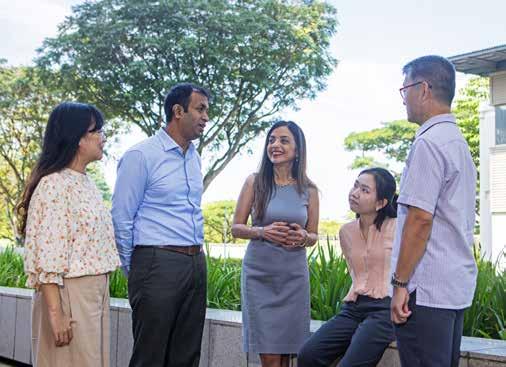
findings, which were from two years of follow-up, indicated that the intervention not only increased patient adherence in the use of antihypertensive medications, but also reduced their risk of cardiovascular disease. The multi-component “SingHypertension” intervention led by Prof Tazeen H Jafar, Duke-NUS and Visiting Consultant, Renal Medicine, SGH, addressed common barriers patients and physicians faced in attaining optimal BP control. It proffered a clinical risk-based treatment strategy comprising: a) trained physicians prescribing combination antihypertensive medications and b) nurses motivating patients through conversations and telephonic follow-ups. SingHypertension can be easily adapted into the existing primary care system at a low cost. It has the potential for rapid scalability in Singapore or other Asian countries with high-risk populations and hypertension-related cardiovascular disease burden in primary care. Discussions with health departments and advisory committees are ongoing to scale up the intervention across local primary care clinics.
Using vitamins B to treat advanced non-alcoholic fatty liver disease
In a study published in Journal of Hepatology in November 2022, Duke-NUS scientists uncovered the mechanisms that lead to non-alcoholic steatohepatitis (NASH), an advanced form of non-alcoholic fatty liver disease that involves fat build-up in the liver. Co-authored by Prof Paul M Yen, Senior Research Fellow Dr Madhulika Tripathi, and Asst Prof Brijesh Kumar Singh, the study also suggested that NASH pathogenesis can be reversed with vitamin B12 and folic acid supplementation, offering promise of their application as first-line therapies for the prevention and treatment of NASH. All this can significantly reduce healthcare costs associated with the disease.
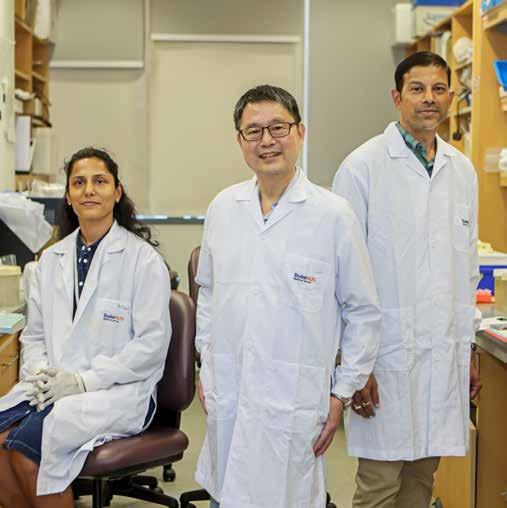
Highly scalable multi-pronged intervention reduces hypertensionlinked morbidity and mortality
70 SingHealth Duke-NUS Academic Medical Centre
Scientists’ work on out-of-hospital cardiac arrests among top global emergency medicine studies
A study on increasing out-of-hospital cardiac arrest (OHCA) survival rates, led by Assoc Prof Marcus Ong, is among Global Emergency Medicine Literature Review Group’s compilation published in Academic Emergency Medicine in August 2022. It was among 23 chosen from more than 44,000 articles that fulfilled the Review Group’s stringent criteria for clarity, study design, global importance and relevance, and likely impact on the global practice of emergency medicine. Significantly, this study by Assoc Prof Ong, who is Senior Consultant, Emergency Medicine, SGH, also reveals that women are less likely than men to receive cardiopulmonary resuscitation (CPR) in public. The data, collated from more than 56,000 OHCA cases across nine Asian communities between 2009 and 2018, will allow the team to understand why gender deters life-saving medical care and how to tailor public bystander CPR training programmes to different ethnic and cultural backgrounds.
Duke-NUS scientists identify gene that controls scarring in damaged hearts
A study led by Assoc Prof Enrico Petretto unravelled the role of the WWP2 gene in promoting fibrosis and scar tissue formation in the heart. Published in Nature Communications, it showed that targeting this gene could delay scarring and progression to heart failure, and improve cardiac function.
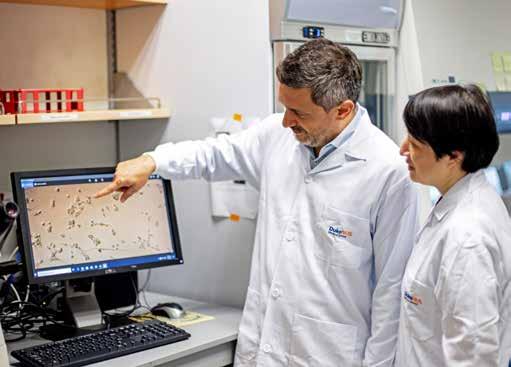
The study focused on the transfer of signals between macrophages (immune cells that clear foreign material in the body) and fibroblasts (cells that produce scar tissue) in the early stages of fibrosis. When expressed in a specific cardiac macrophage, WWP2 increases scarring by “irritating” fibroblasts to cause excessive scarring during the early phases of common heart diseases or cardiomyopathies. Blocking WWP2’s function in this subset of cardiac macrophages is thus enough to slow—or even stop—the scarring.
More than three per cent of singapore’s population at risk of genetic disease
Understanding one’s genetic risk of getting a disease can help to better protect against it. A study of nearly 10,000 people in Singapore found that familial hypercholesterolemia, a genetic condition where high cholesterol levels are passed down in families, was more common among the Chinese community (1.05 per cent) than the Indian (0.15) or Malay (0.25) communities. Such discoveries also pave the way for investigations into genetic factors that cause common ailments such as diabetes. Published in Nature Communications in November 2022, this project was led by researchers from SingHealth Duke-NUS Institute of Precision Medicine, KKH, NCCS, SERI, as well as A*STAR and Duke-NUS. The study’s objective is to provide initial insights for SG100K, which maps the DNA and complete set of genes of 100,000 Singaporeans.
The Duke-NUS team is developing small molecule inhibitors to impede a form of the WWP2, which showed promising anti-fibrotic results in cells and provides therapeutic potential for treating conditions like non-ischaemic cardiomyopathies.
71 Annual Report 2022/2023
Bats’ immune response to live infection
Here’s a world first: Scientists at Duke-NUS and their colleagues in Singapore used single-cell transcriptome sequencing to evaluate immune responses to viral infection among colony-bred cave nectar bats (eonycteris spelaea). Such insights into bat immunity can be harnessed to protect human health, according to the report in Immunity.
The team, which includes Prof Wang Linfa, Duke-NUS; Research Fellows Dr Akshamal Gamage and Dr Feng Zhu; and MD-PhD candidate Mr Wharton Chan, uncovered several striking traits about cave nectar bats. They possess: i) a type of white blood cell known as neutrophils, expressed high levels of a gene called IDO1 that can suppress immune responses in humans; ii) marked anti-viral gene signatures in white blood cells known as monocytes and alveolar macrophages that guide T cells to recognise viral particles; iii) an abundant population of T cells and natural killer cells that can kill tumour and virus-infected cells.
These can guide further investigation into the remarkable biology of bats, especially their tolerance to viral pathogenesis, their ability to live on a high-on high sugar diet without getting diabetes, as well as their longevity.
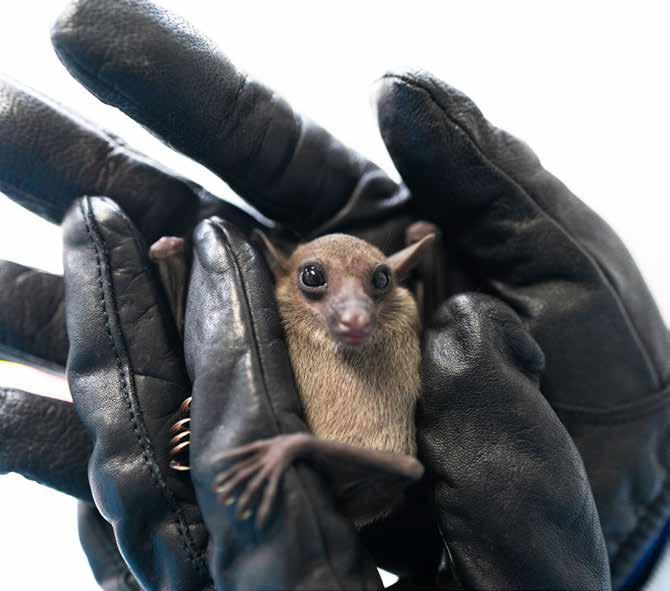
Jarvis-DHL: empowering patients through AI
SHP receives nearly two million visits every year, most of which are for diabetes, hypertension, and hyperlipidemia. By integrating AI enabled tools, Jarvis-DHL enhances primary care for these chronic diseases. It was the only proposal awarded during Singapore’s AI Grand Challenge, which sought to answer: “How can AI help primary care teams stop or slow disease progression and complication development in 3H – hyperglycemia (diabetes), hypertension (high blood pressure) and hyperlipidemia (high cholesterol) – patients by 20 per cent in five years?” The study is a collaboration among SingHealth Health Services Research Centre, SNEC, NHCS, Duke-NUS and Institute of Data Science, NUS. In the primary care stream, SHP investigators develop the PERDICT.AI (PERsonalised DIabetes Counselling Tool using Artificial Intelligence) to promote interactive physician-patient consultation in the management of diabetes, hypertension, and hypercholesterolemia through enhanced risk perception and selection of patient-centric therapeutic treatment.
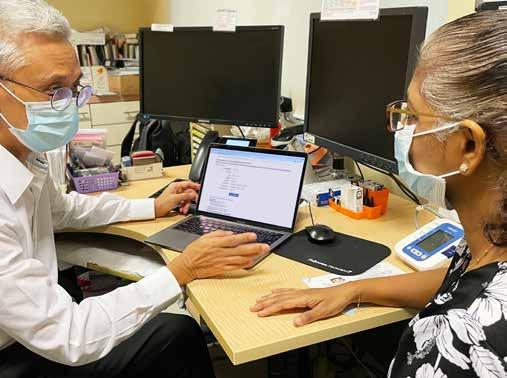
72 SingHealth Duke-NUS Academic Medical Centre
SGH develops drug monitoring tool to track antibiotic levels in critically ill patients
A pilot study led by Dr Lim Tze Peng, Senior Principal Pharmacist Researcher, Pharmacy, SGH, indicated that using a therapeutic drug monitoring tool can help clinicians to measure antibiotic
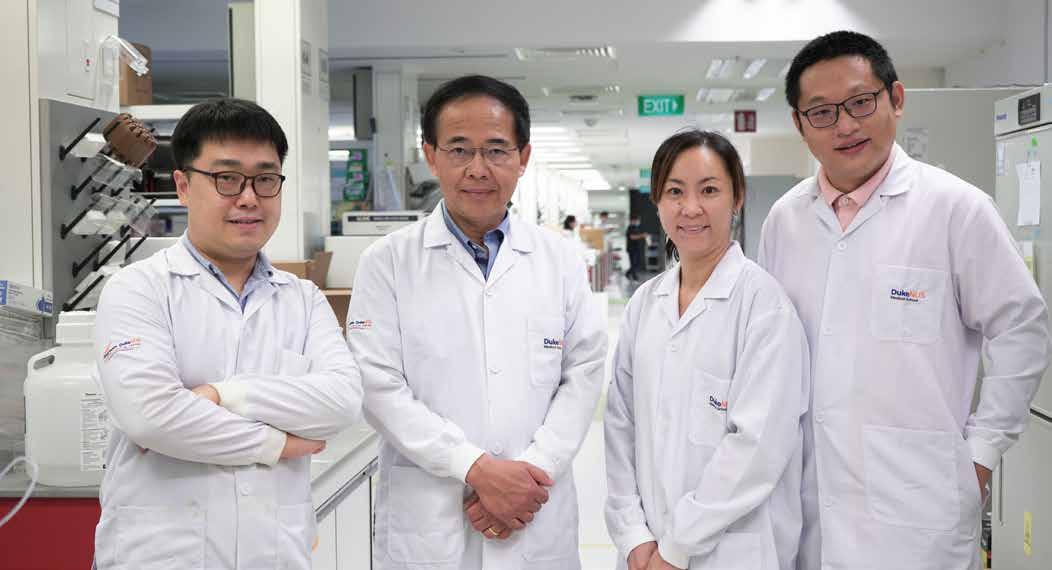
dosages more effectively in patients. This not only optimises antibiotic use but also may prevent development of antibiotic resistance in the long run, which it is particularly crucial for ICU and diabetic patients whose medical conditions often fluctuate. As the pilot study was done only on 80 patients, the team has expanded its scope to about 700 patients in January 2023.
Duke-NUS partners Singapore start-up CoVBio on broad-spectrum COVID-19 vaccines and therapeutics
Duke-NUS signed an exclusive worldwide licensing agreement with Singapore start-up CoV Biotechnology (CoVBio) to develop broadspectrum vaccines and therapeutic antibodies that could protect against future coronavirus pandemics. It uses a novel consensus sequence to develop vaccines that target not only SARSCoV-2 and its current variants of concern (VOCs) but also future ones. It even addresses animal coronaviruses known as sarbecoviruses that could infect humans.
CoVBio aims to introduce a discovery made by Prof Wang Linfa and his team from the Emerging Infectious Diseases Programme at Duke-NUS. They found that 2003 SARS survivors vaccinated with the Pfizer-BioNTech mRNA vaccine produced very powerful antibodies that neutralised known SARS-CoV-2 VOCs and animal sarbecoviruses. The team designed a consensus sequence known as C1.25, which is used to produce mRNA and protein subunit vaccine candidates that protect against SARS-CoV-2 VOCs. Besides developing the pan-sarbecovirus mRNA and protein subunit vaccines, Duke-NUS and CoVBio will also collaborate on broad-spectrum therapeutic antibodies to offer additional treatment options.
73 Annual Report 2022/2023
A cure for hypertension
Between five and 20 per cent of patients with hypertension have primary aldosteronism, which is curable but often gets undiagnosed. The Shimadzu CGH Clinomics Centre (SC3), jointly launched by CGH and Shimadzu (Asia Pacific), is a satellite laboratory of the hospital. Equipped with mass spectrometry technology to assess levels of renin and aldosterone hormones in just five working days, the laboratory aims to bring about better clinical care for patients. Previously, these tests had to be sent overseas and took several weeks to be completed. With the ability to diagnose the cause of hypertension early, doctors can prescribe appropriate medication sooner. The CGH team comprising Clinical Asst Prof Troy Puar, Senior Consultant, Endocrinology, Dr Daryl Hee, Senior Manager, CGH, and Head of SC3, and Clinical Prof Aw Tar Choon, Senior Consultant, Laboratory Medicine, SC3, is working towards becoming a regional referral centre for mass spectrometry solutions.
Partnership with alder therapeutics to boost cell-based regenerative therapy
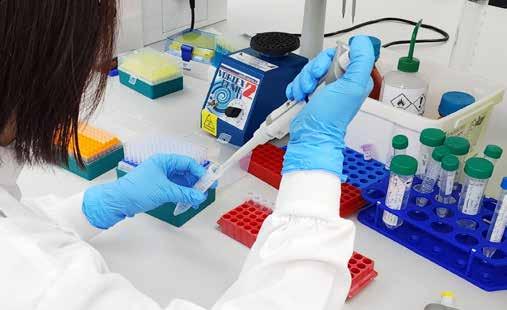
Duke-NUS licensed two laminin-related patents to Swedish biotech start-up Alder Therapeutics to accelerate development of the latter’s retinal and cardiac cell therapeutic products.
The licences originated from discoveries by Prof Karl Tryggvason from Duke-NUS Cardiovascular and Metabolic Disorders Programme. Using highly
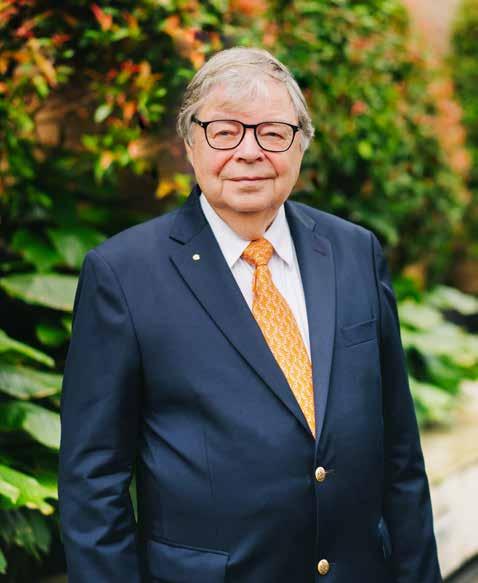
cell-type-specific laminins, the team develops fully humanised, chemically defined, reproducible and non-tumourigenic differentiation protocols for creating several cell types derived from human embryonic stem cells.

One of the two inventions being advanced to clinical application by Alder is based on retinal cell research led by Asst Prof Tay Hwee Goon from Duke-NUS’ Centre for Vision Research. It proposes a method to influence human embryonic stem cells to differentiate into photoreceptors, which presents an effective treatment option for patients who have lost their vision due to retinal degeneration.
The other technology licensed to Alder for therapeutic development is a novel protocol to generate heart muscle precursors from human embryonic stem cells. Led by Asst Prof Lynn Yap from Duke-NUS’ Cardiovascular and Metabolic Disorders Programme, the team generates these precursors using laminin LN-221. Preclinical tests indicated increase in heart function and absence of tumour formation, hence promising a safe and effective method to regenerate human heart muscle.
74 SingHealth Duke-NUS Academic Medical Centre
Novel, non-invasive method to predict and reduce relapse of childhood cancers
Taking only a small blood sample and separating cancer cells from healthy ones, scientists and doctors from KKH, NUS Yong Loo Lin School of Medicine and Institute for Health Innovation and Technology successfully determined the probability of cancer spread that can be used to prevent relapse. It involves no pain, costs less, and promises to detect unidentified “leftover” disease. This method will deepen understanding of childhood cancers and further develop personalised care for patients.
Sensors to detect cognitive impairment among seniors
The study team comprised A/Prof Iris Rawtaer, Head, Department of Psychiatry and Deputy Director Research, SKH; Prof Tan Ah Hwee, Professor, Singapore Management University; Assoc Prof Rathi Mahendran, Senior Consultant, Department of Psychological Medicine, NUS; Assoc Prof Laura Tay Bee Gek, Senior Consultant, Department of Geriatric Medicine, SKH; Asst Prof Seyed Ehsan Saffari, Duke-NUS; Dr Kenneth Kwok, Principal Research Scientist, Institute of HighPerformance Computing; and Assoc Prof Ng Tze Pin, Department of Psychological Medicine, NUS.
Novel cancer vaccine offers benefit in phase I clinical trial
In a first-in-human Phase One clinical trial of a novel adenovirus-based vaccine, which combines a common cancer protein target linked with an immune boosting protein, it was shown to be safe in 21 patients with advanced breast, ovarian and lung cancer. Published in Nature Communications in October 2022, the trial results showed that the vaccine altered the body’s immune system to protect it against cancer. Led by Professor Toh Han Chong, DCEO (Strategic Partnerships) and Senior Consultant in the Division of Medical Oncology, NCCS; and Professor Salvatore Albani, Director of the SingHealth Duke-NUS Translational Immunology Institute, the trial is being extended towards a larger population of patients.
NHCS and Duke-NUS Scientists
Sensors In-home for Elder Well-being (SINEW) provides a timely novel way to detect early signs of cognitive impairment.
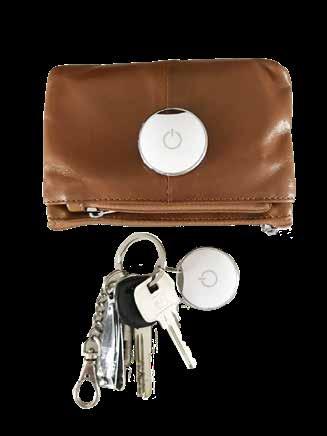
The three-year study involved installation of sensors in the homes of seniors to monitor their behaviour and identify changes that indicate mild cognitive impairment and dementia.
Developing an algorithm to flag patterns that require early intervention will be useful for preventive health and reducing caregiver burden.
First in the World to Regenerate Diseased Kidney
Regenerative therapy may be able to restore kidney function, according to scientists at NHCS and Duke-NUS. Their preclinical study published in Nature Communications reveals that the key is in blocking a damaging and scar-regulating protein known as Interleukin-11 (IL-11). Using these findings, the team is exploring potential new treatments for kidney disease.
75 Annual Report 2022/2023
Asst Prof Yu Na wins NMRC Clinician Scientist Award
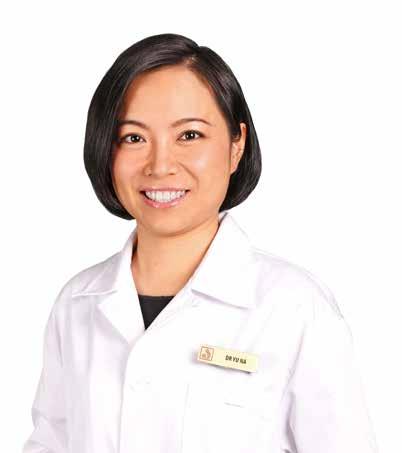
Asst Prof Yu Na, Director of Medical Technology at NDCS, received the Clinician Scientist Award –Investigator Category from the National Medical Research Council for her research on digital dentistry in metal-based partial denture production. She is the first dental clinician to win the award. Her clinical study demonstrated comparable effects and accuracy between digitally printed and handmade denture bases within patient volunteers. Integrating digital technology reduces production time, improves patient experience, and enables faster assessments and decision-making by dentists, addressing the growing treatment demand in an ageing population.
Fighting dementia with gut microbes
Established in 2022, the ASEAN Microbiome Nutrition Centre (AMNC) comprises an interdisciplinary research team assembled from NNI, Sunway University, Malaysia, and UK Dementia. Directed by Prof Sven Pettersson, Principal Investigator, NNI, AMNC aims to identify how underlying mechanisms of gut microbe mediated communication within the human body can slow down biological ageing and neurodegenerative diseases such as dementia. AMNC will leverage the findings and translate these into the design of next-generation therapies.
Ensuring care continuity during a pandemic
COVID-19 and its restrictions affected discharge planning and care continuity due to limited stepdown care options and remote assessment of discharge needs.
To guide healthcare administrators to better plan essential community care services in the event of infectious disease outbreaks, a multi-institution team embarked on a study “Evaluating the impact of COVID-19 restrictions on discharge planning and post-discharge outcomes in the community hospital and Regional Health System: A mixed method study”.
Findings showed that average length of stay for patients affected by COVID-19 restrictions was significantly longer than prior to lock-down. Nearly half of the patients from both groups needed referral to community care services upon discharge. To improve care transition during a pandemic, participants suggested for clearer communication of guidelines, improved inter-sectorial collaborations, shared responsibility of patient care and employment of novel models of care. The study was awarded a Community Care Research Grant by the Agency for Integrated Care.
The study was undertaken by the following: Assoc Prof Low Lian Leng, Senior Consultant and Medical Director, Outram Community Hospital; Dr Loo Yu Xian, Consultant; Ms Kong Lai Yee, Deputy Head, Medical Social Services: Dr Luke Low, Senior Consultant and Medical Director, SKCH, Dr Xu Bangyu, Consultant; Dr Shermain Chia, Staff Registrar; and Ms Olivia Xia Jiawen, Principal Analyst, Dr Ong Chong Yau, Consultant, SKH; Dr Kwan Yu Heng, Medical Officer, SGH; Asst Prof Sungwon Yoon, Duke-NUS; Dr Lim Su Fee, Deputy Director, Nursing, SGH; and Ms Rachel Marie Towle, Senior Nurse Clinician, SGH.
76 SingHealth Duke-NUS Academic Medical Centre
What your eyes show about your health
identifying individuals who test positive for chronic kidney disease through RetiKid, healthcare professionals can promptly refer them for further diagnostics tests ensuring timely intervention. With an accuracy rate of 91 per cent, this AI algorithm has been tested using over 23,000 retinal images from nearly 12,000 participants from Singapore and China. This study, led by Assoc Prof Charumathi Sabanayagam, Deputy Head, Ocular Epidemiology Research Group, SERI, and published in The Lancet Digital Health in 2020, showcases the remarkable potential of RetiKid in bolstering early detection strategies.
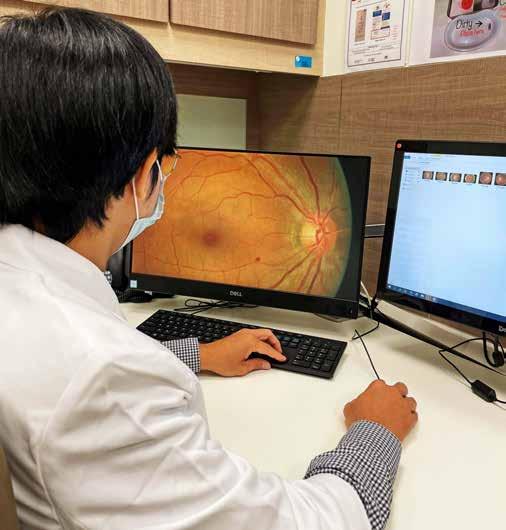
Two AI screening tools have been developed by scientists from SERI using retinal images to detect chronic kidney disease and predict biological age respectively. RetiKid is an innovative AI tool designed to revolutionise early detection strategies for chronic kidney disease. By utilising non-invasive retinal imaging, it quickly analyses the back of the eye photos, providing preliminary screening results within just one hour. By
Calculating risk of coronary artery disease with PRECISE
PRECISE (or Predictive Risk scorE for CAD in Southeast Asians with chEst pain) is the first diagnostic prediction model of its kind designed for use in a primary care setting. It is equipped with an algorithm that considers clinical variables such as age, gender, underlying chronic conditions and type of chest pain among others to assess risk of coronary artery disease. Developed by SHP in collaboration with NHCS,
Retinal images also play a key role in RetiAge, which indicates physiological changes related to ageing, and in turn risk of systemic diseases and lifespan. The study was led by Principal Investigator Prof Cheng Ching-Yu, Head, Ocular Epidemiology Research Group and Data Science Research Platform, SERI. Developed using more than 129,000 retinal images from more than 40,000 participants from South Korea, the algorithm was further evaluated among 56,000 participants in the UK Biobank. Both RetiKid and RetiAge have the ability to seamlessly integrate with Singapore Eye Lesion Analyser Plus (SELENA+), a deep learning system that screens for diabetic eye diseases, glaucoma, and age-related macular degeneration. This integration allows patients to be screened for multiple ailments using a single retinal image, streamlining the screening process, and optimising healthcare resources.
Duke-NUS and the National Healthcare Group Polyclinics, it can be used as a clinical decision support tool for primary care physicians to decide and select timely interventions in patients, who present with chest pain in the community. The team, led by main author Dr Sinead Wang, Consultant, SHP-Outram, examined more than 1,600 patients who presented with chest pain from across eight polyclinics for this study. The plan is to implement PRECISE in local primary care practices.
77 Annual Report 2022/2023
FUELLING RESEARCH AND HOPE FOR PATIENTS THROUGH PHILANTHROPY
The easing of the COVID-19 restrictions saw the return of gala dinners and physical fundraising events. The generous support of like-minded individuals and organisations in improving healthcare and supporting patients in need will go a long way in advancing medicine.
A New Dawn: SingHealth Duke-NUS gala dinner returns
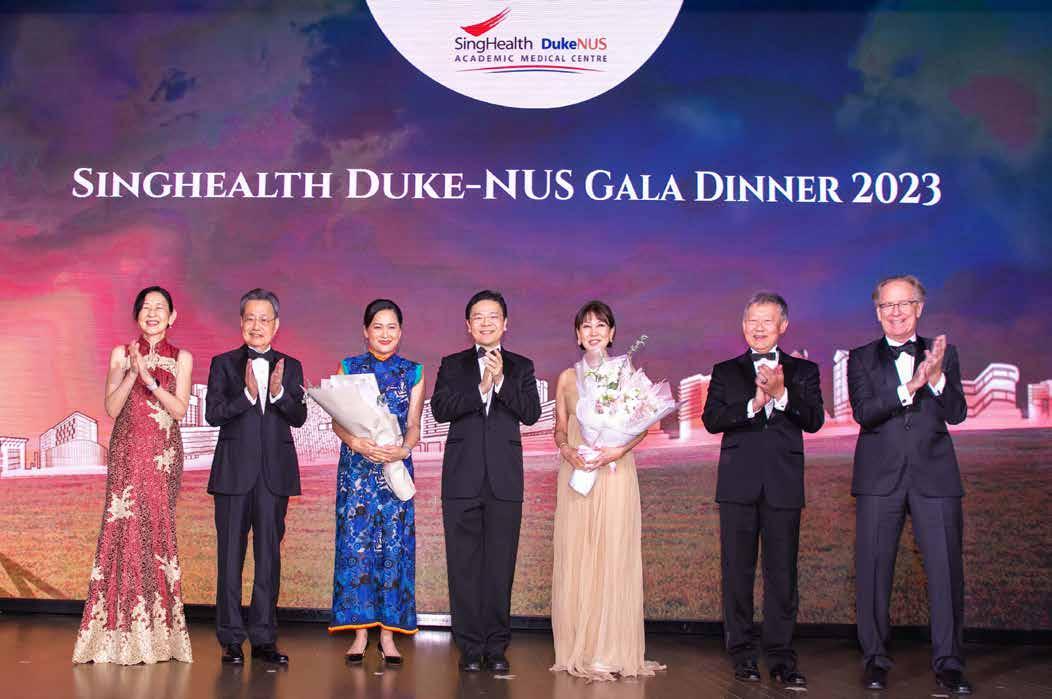
The SingHealth Duke-NUS Gala Dinner took place on 28 January 2023, after a hiatus of more than three years due to COVID-19. Themed “A New Dawn”, it celebrated the AMC’s emergence from
the pandemic with a renewed sense of purpose - to transform and deliver care that is patient-centred, value-driven and efficacious. It was also an opportunity to thank donors and partners for their generous support towards medical research, education and innovation.
78 SingHealth Duke-NUS Academic Medical Centre
At the gala dinner, three transformational gifts, including a $50 million gift from the Lee Foundation, were announced. The gift will boost the AMC’s efforts to design and strengthen frameworks to hasten advancements in healthcare innovation, seed the potential for discovery and innovation through funding and pilot grants, and push the boundaries of medicine through novel research programmes.
Two other gifts in support of dementia and neuroscience totalling $14 million were also presented onstage. These were most timely as the AMC embarks on Healthier SG and harnesses the potential of research, education and innovation to better anticipate the needs of our changing demography and deliver health solutions to meet the needs of Singaporeans at every life stage.
The Eye Ball 2022

The 10th edition of The Eye Ball was held on 4 November 2022 at The Ritz-Carlton, Millenia Singapore, after a two-year hiatus due to the pandemic. In his welcome speech, Prof Aung Tin, CEO of SNEC, highlighted that the most significant transformation happens during tough times. As zoom meetings and teleconsultations have become the new normal, the use of technology such as artificial intelligence has been helpful in the detection of eye diseases.
NHCS Heart To Heart Gala 2023
NHCS celebrated its 25th anniversary in conjunction with its fourth NHCS Heart To Heart Gala on 17 March 2023 at The Ritz-Carlton, Millenia Singapore, which raised $1.2 million with close to 600 guests in attendance.
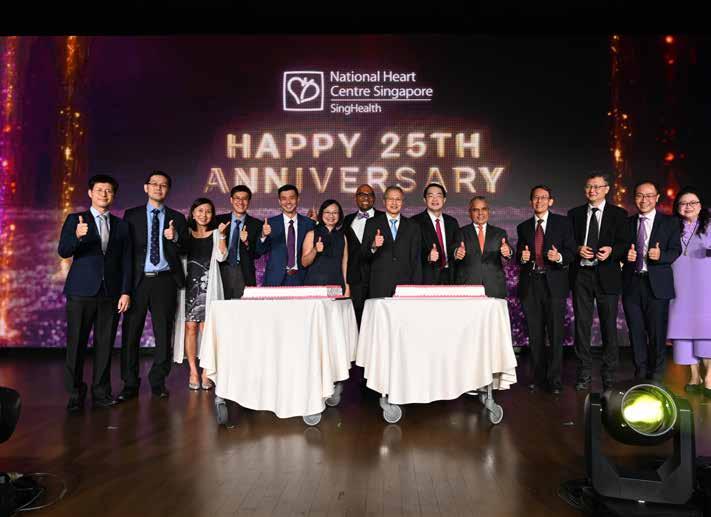
Themed “Colours of Health and Hope”, the gala emphasised the positive impact of colours on health and well-being. Funds raised will provide financial assistance to needy heart patients, support high-risk patients who require novel treatment and are unable to undergo conventional therapy, advance cardiovascular research and training of cardiac healthcare professionals.
The theme, “Metamorphosis: Vision & Transformation”, reflected this idea.
The event raised $1.24 million and featured culinary delights, performances by a talented cast of ophthalmology Residents and staff, and a charity auction. It aimed to spread awareness of eye diseases and the fragility of vision while raising funds for VisionSave to support education and research into eye diseases and help financially needy patients.
79 Annual Report 2022/2023
SGH Beyond 200
SGH Beyond 200 raised over $800,000 to support needy patients, as well as programmes that improve patient outcomes. Every year, more than 2,000 needy patients - most of them are elderly with a household per capita income of $650 or less - require financial assistance for critical treatment and medication. Prof Kenneth Kwek, CEO and Assoc Prof Ruban Poopalalingam, Chairman, Medical Board, SGH got together their band of avid cyclists to complete 201km within a day on 3 September 2022.
Among the cyclists were kidney transplant patients, Mr Yip Je Choong and Mr Esmond Teo. Both decided to take part in the event so they could do their bit for less privileged patients and their families.
“One Heart, One Mind” CHIONG AH! Charity Race 2022
53 corporate partners came on board NNI’s inaugural signature fundraiser, CHIONG AH! Charity Race 2022. Participants discovered hidden gems of Singapore as teams of two had to “chiong” around the island to complete the race of all 10 stations in the fastest time possible.

$115,300 was raised for patient care, research, education and unmet needs at the NNI Fund.
Healing Arts Charity Auction
The Healing Arts Charity Auction was held in conjunction with the launch of Healing Arts @ SHP, an initiative to transform health and healthcare experience through the arts. Featuring paintings by SHP staff and local artist Mr Low Hai Hong, the Charity Auction raised $56,488 for the Gift of Family Fund in support of disadvantaged patients as well as research and advancement endeavours that strengthen primary care.
Launched during the official opening of Eunos Polyclinic, Healing Arts @ SHP also aims to make art accessible in the community.
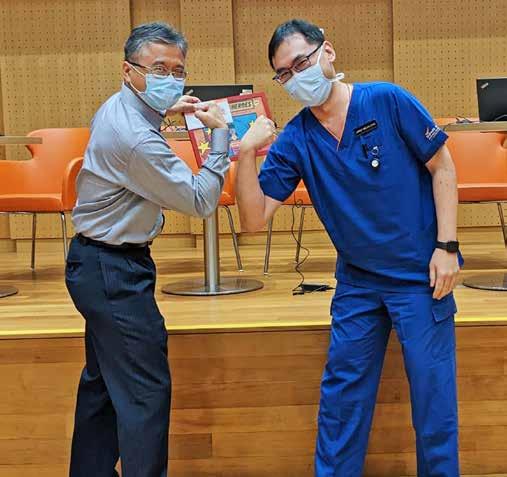
SKH Giving Heroes 2022
Encouraged to spread kindness and become Giving Heroes, SKH staff participated in a Staff Giving Divisional Challenge. It was aimed at fostering a competitive yet friendly spirit of giving as teams vied for the Champion titles. They raised more than $50,000 in support of needy patients.
Prof Teo Eng Kiong (left), CEO of SKH, and Prof Melvin Chua, Chairman, Division of Medicine and Inpatient Care, SKH
80 SingHealth Duke-NUS Academic Medical Centre
NDCS Comedy Night 2023

NDCS wrapped up its 25th anniversary celebrations with plenty of laughter and smiles as well-loved stand-up comedians, Hossan Leong, Pam Oei and Siti Khalijah brought the house down at Victoria Theatre on 15 March 2023. More than $55,500 in donations was raised in support of NDCS Tooth Fairy Fund.
iWalk 2022: Towards Recovery & Hope
SCH held its signature fundraising event iWalk with almost 1,000 participants. Themed “Towards Recovery & Hope”, the virtual race had various distance challenges and a new cycling category. Funds raised went towards making a difference in patients’ lives, clinical care, research and education, community health as well as other patient-related programmes. The event raised $43,277.
SKH’s Running Men 2022
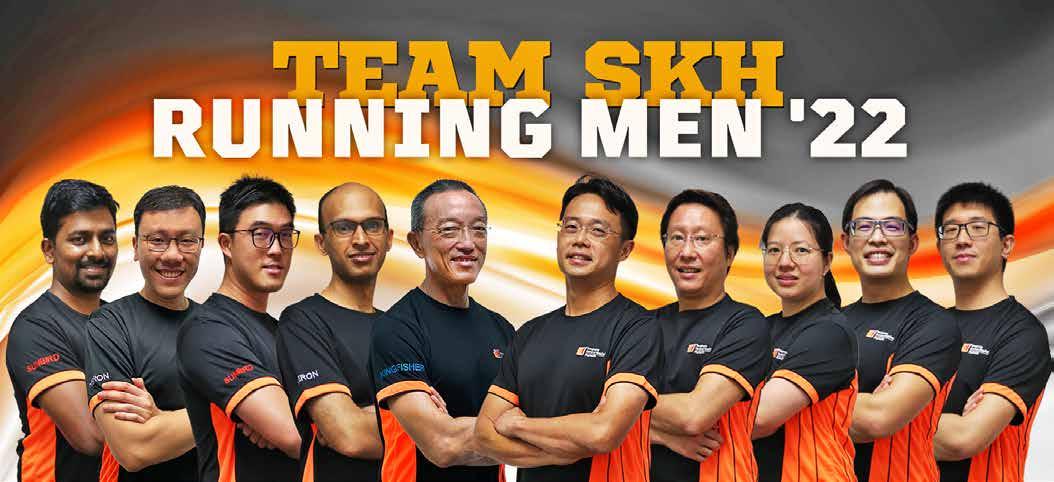
To mark Prostate Cancer Awareness Month, the Running Men returned in November 2022 to show their support for men’s health by completing a
30 km run. To cheer the urology doctors on, the public were encouraged to donate towards public education, patient care and research on prostate diseases.
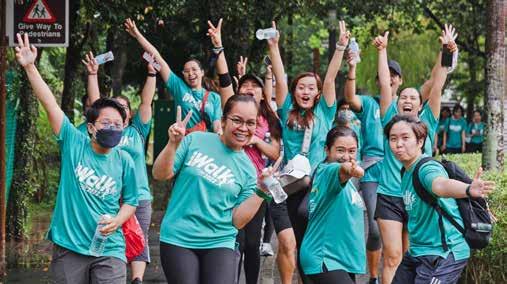
81 Annual Report 2022/2023
$18,000 from Felix Bell Run
KKH’s Children’s Intensive Care Unit team raised over $18,000 for the Felix Bell Paediatric Critical Care Programme Fund through a commitment to run a total of 160 km over three months. Established in memory of Felix Bell, this fund furthers holistic care of critically ill children.
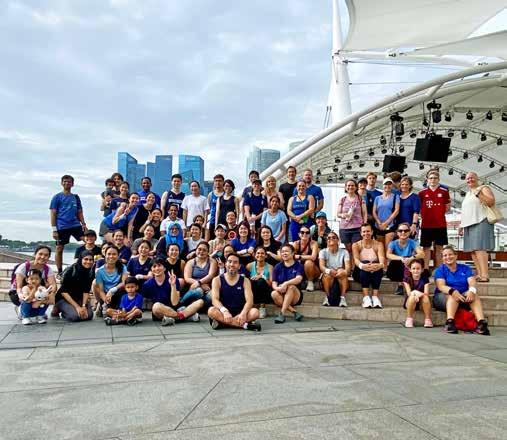
Soo Jia Sien Heart Research Fund
Set up with generous contributions from the Estate of Loke Foong Meng, the Soo Jia Sien Heart Research Fund supports NHCS’ work in cardiac research and education. The Estate made a subsequent donation of $100,000 to support a potential treatment factor that can improve the heart’s pumping function and prevent heart failure.
Prof Derek Hausenloy, Director, NHRIS and Senior Consultant, NHCS, says: “We are excited to discover the new treatment factor; the second gift from the Estate will enable us to proceed to the next phase of the study. We are hopeful that these new therapeutic treatments will improve the health of our patients.”
25th anniversary tea blend fundraising campaign
Partnering for a Healthier Tomorrow
$200,000 Legacy gift to support mental health
In his last days, Mr Yeong Yow Wong was touched by the care and concern he received at CGH. He told his family that he was well taken care of at the hospital, and instructed them to support its philanthropic efforts after his passing.
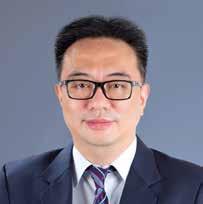
Mr Yeong’s family members have vast experience serving in Singapore’s educational sector; they were especially interested in CGH’s efforts in promoting mental health awareness in youths and made a $200,000 donation. His family believes that this contribution can help to foster the spirit of care and compassion late Mr Yeong had experienced, and ensure that others benefit from it too.
NDCS launched a special green tea blend as part of its 25th anniversary celebrations. An exclusive creation that featured Japanese brown rice green tea, orange and rosemary, the tea was given out as a token of appreciation when donors made a minimum of $25 in support of the NDCS Tooth Fairy Fund. The campaign raised close to $84,000.
Healthier smiles
With a generous donation of $50,000 to its Tooth Fairy Fund, NDCS furthers its efforts to promote the importance of good oral health among students, especially those with special needs. This project dovetails with its Healthier SG goals. Oral Health Talks are organised at schools such as Assumption Pathway, Eden, Metta, MINDS, NorthLight, Pathlight, Crest Secondary and Spectra Secondary to promote sustainable oral care habits, after which students are encouraged to write pledges on tooth-shaped squishy toys as a commitment to keep up their oral health.
82 SingHealth Duke-NUS Academic Medical Centre
$30,000 boost for diabetes diet therapy research
COVID-19 disrupted Assoc Prof Lee Kheng Hock’s research on the effectiveness of intermittent fasting as a diet therapy for diabetes by hindering patient recruitment process and increasing operating costs. Assoc Prof Lee is the Senior Consultant of Department of Family Medicine and Continuing Care, SGH, and Academic Deputy Chair and Academic Vice Chair, Faculty Affairs and Development of Family Medicine ACP.
Mr BK Iyer’s timely donation of $30,000 got the study back on track and enabled the team to recruit its required number of patients. An avid tennis player, Mr Iyer wanted to give back to the community.
NCCS Cancer Fund
Corporate giving plays a crucial role in supporting NCCS Cancer Fund to provide patients the best possible care. BMW Group Asia, which renovated its offices in 2022, raised $9,600 by selling excess furniture during an internal fundraising campaign. A virtual BMW Berlin Marathon in Singapore also pulled together nearly $3,000 for the cause. Amore Fitness organised charity classes during Cancer Survivors’ Month and Breast Cancer Awareness Month, and raised more than $11,000.
Transformational gifts
Lien Ying Chow Endowment Fund
The Lien Ying Chow Endowment Fund was established with a pledged gift of $20 million from Mrs Margaret Lien to honour Dr Lien’s legacy. This transformative gift allows NCCS to provide holistic psychosocial care for cancer patients, and to extend support during their treatment journey. Besides improving quality of life and enhancing caregiving sustainability, it will help to alleviate the financial hardship of patients in need.
War against Dementia
Mr Cheng Wai Keung, Chairman of SingHealth, and his network collectively raised close to $9.5 million during FY 2022 in support of NNI’s Ecosystem of Dementia Care programme. This three year programme aims to deliver essential care and support services ranging from community screenings to rehabilitation and intervention, for persons with dementia, as well as their caregivers and families. To enable more patients to receive holistic care, NNI is planning to scale up its pilot programmes with community partners for dementia rehabilitation and intervention, with the aim of moving them towards mainstream clinical services.
Goh Foundation Innovation in Supportive and Palliative CaRE Programme (INSPiRE)
With a pledged gift of $6.35 million from Goh Foundation, the Innovation in Supportive and Palliative CaRE Programme (INSPiRE) at NCCS aims to empower patients and their loved ones by assessing the effectiveness and implementation of a comprehensive needs-based Health Coaching Programme and a Grief and Bereavement Support Programme. INSPiRE is also working to establish a supportive and palliative care database, an academic fund, and a faculty professorship to drive transformation in supportive and palliative care delivery models.
Cynthia Goh Palliative Care Institute
The late Prof Cynthia Goh dedicated her life to developing palliative care in Singapore and the Asia Pacific region. She was a pioneer who set up the palliative department at NCCS and SGH. Named in recognition of her contributions, her husband Prof Goh Hak Su, family, friends and colleagues donated $6 million to the Cynthia Goh Palliative Care Institute (CGPCI) to continue her legacy. CGPCI aims to accelerate the advancement of palliative care practice and care access locally and regionally.
83 Annual Report 2022/2023
Agape Population Health Programme Fund and Agape Professorship in Population Health
A gift of $5 million enabled the SingHealth Regional Health System (RHS) to launch the Agape Population Health Programme Fund and Agape Professorship in Population Health.
RHS spearheads multifaceted efforts to support vulnerable patients in the community.
Agape Population Health Programme Fund seeks to promote healthy living and to prevent onset of diseases. It supports transformative models of community care and addresses funding gaps to directly benefit the needy. The Agape Professorship in Population Health supports research that contribute to the health of people in Singapore, and that positively impact patient care for the future.
Parkinson’s Disease Diagnosis & Treatment Research Fund
Parkinson’s Disease (PD) is a common neurodegenerative disorder that causes problems with movement such as slowness, stiffness and/ or uncontrollable shaking of arms and legs. PD has no cure and can worsen over time. Golden Agri International’s pledge of $3 million over three years towards the PD Diagnosis & Treatment Research Fund at the Neuroscience ACP seeks to advance diagnosis and treatment through development of diagnostic markers, identification of drug targets and testing of drug targets in human cell and animal models. These advances aim to help patients manage their conditions better with effective personalised treatments to achieve better quality of life.
$2.8 Million to Genomics for KIDS in ASEAN programme under MCHRI
Supported with over $2.8 million from Temasek Foundation, the Genomics for KIDS in ASEAN programme is the first programme to be established under the SingHealth Duke-NUS Maternal and Child Health Research Institute (MCHRI). The MCHRI, which was set up at KKH in 2021, serves as a centre of excellence for maternal and child health research to transform and improve national health in Singapore. In line with the mission of MCHRI, the Genomics for KIDS in ASEAN programme aims to enhance access to genomic services, increase regional capacity and capability, and institute an ASEAN-specific genomic database to better understand rare diseases in ASEAN. It will run over three years and aims to benefit over 500 families.
Gut Bacteria to Treat Chronic Brain Diseases Research Fund
According to recent discoveries, bacteria in the gut produce chemicals known as metabolites, which can travel via the bloodstream to the brain. Some of these metabolites are toxic to brain cells and have been linked to neurodegenerative diseases.
The Gut Bacteria To Treat Chronic Brain Diseases Research Fund under the Neuroscience Academic Clinical Programme was established with a $1.5 million pledge from The Ngee Ann Kongsi. Researchers will now be able to work on identifying specific bacteria and metabolites associated with neurodegenerative brain conditions, discovering potential new therapies that can modify or remove harmful metabolites and/or changing the composition of gut bacteria to prevent the production of such toxins. This research will impact health outcomes and lives of patients today and for future generations to come.
84 SingHealth Duke-NUS Academic Medical Centre
Alleviating the Burden of Disability with SGH Paediatric Surgery Fund
To commemorate 40 years of paediatric surgery in Singapore, the Department of Paediatric Surgery in the Surgery Academic Clinical Programme started a campaign that focuses on advancing outcomes for children with life-limiting congenital malformations and newborn diseases, particularly critical organs of breathing, digestion and the urogenital system.
More than $1 million has been raised through the campaign which will go towards the Paediatric Surgery Fund. The fund will provide long-term funding resources for the Department of Paediatric Surgery to develop (i) new technologies to improve the quality of surgical correction of congenital malformations and newborn diseases; (ii) novel predictive testing methods to identify patients at highest risk of deterioration and disability; and (iii) supportive care systems to alleviate the burden of disability in incurable disorders.
$1 million for new phases of PSCP and POSP
KKH and Children’s Cancer Foundation (CCF) have reaffirmed their commitment to provide comprehensive, patient-centric care for the medical, physical, psychological, nutritional, and social well-being of children with cancer. Both signed an MOU in September 2022. As part of this renewed collaboration, CCF has gifted $1 million to support the continuation of two existing programmes in 2024: CCF Psychosocial and Supportive Care Programme for Paediatric Oncology (PSCP) and CCF Paediatric Oncology Survivorship Programme (POSP).
Prof Alex Sia, CEO, KKH, says, “KKH manages 70 per cent of children with cancer in Singapore. We continually seek breakthroughs in understanding and managing childhood cancers, and using research and clinical innovation to develop novel therapies. We look forward to many more years of strong collaboration with CCF, as we continue to improve our patients’ quality of life and survival.”
Musim Mas empowers healthcare leaders
The SGH Healthcare Management Excellence Programme got an encouraging start with a $1 million gift from Musim Mas Group. The programme trains healthcare professionals to deliver high quality, accessible and affordable healthcare. This money also helped to establish the first SGH Healthcare Excellence Training Awards.
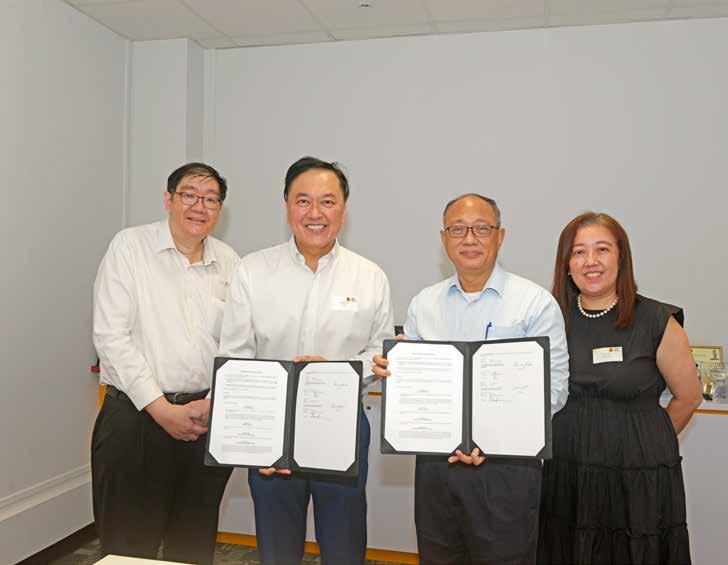
“In the coming decades, our health system will face multifaceted challenges including ageing population, rising costs and potential shortfall of healthcare workers. Equipping our future healthcare leaders to manage and tackle these challenges will enhance the resilience of our health system and ensure that our population can continue to enjoy sustainable world class yet affordable health services,” Assoc Prof Tan Hiang Khoon, DCEO, Future Health Division, SGH.
Tackling the emerging burden of cardiometabolic diseases
NHCS received a $1 million gift in the name of Mrs Donna Aratani Kwee that will support two research projects in studying cardiometabolic diseases. Given the rise in the number of people who experience cardiometabolic diseases, researchers aim to gain a deeper understanding as to why Asians are more susceptible to developing these conditions. This is done through studying the heart stem cells from Asian patients, and using data
85 Annual Report 2022/2023
OUR ACHIEVEMENTS
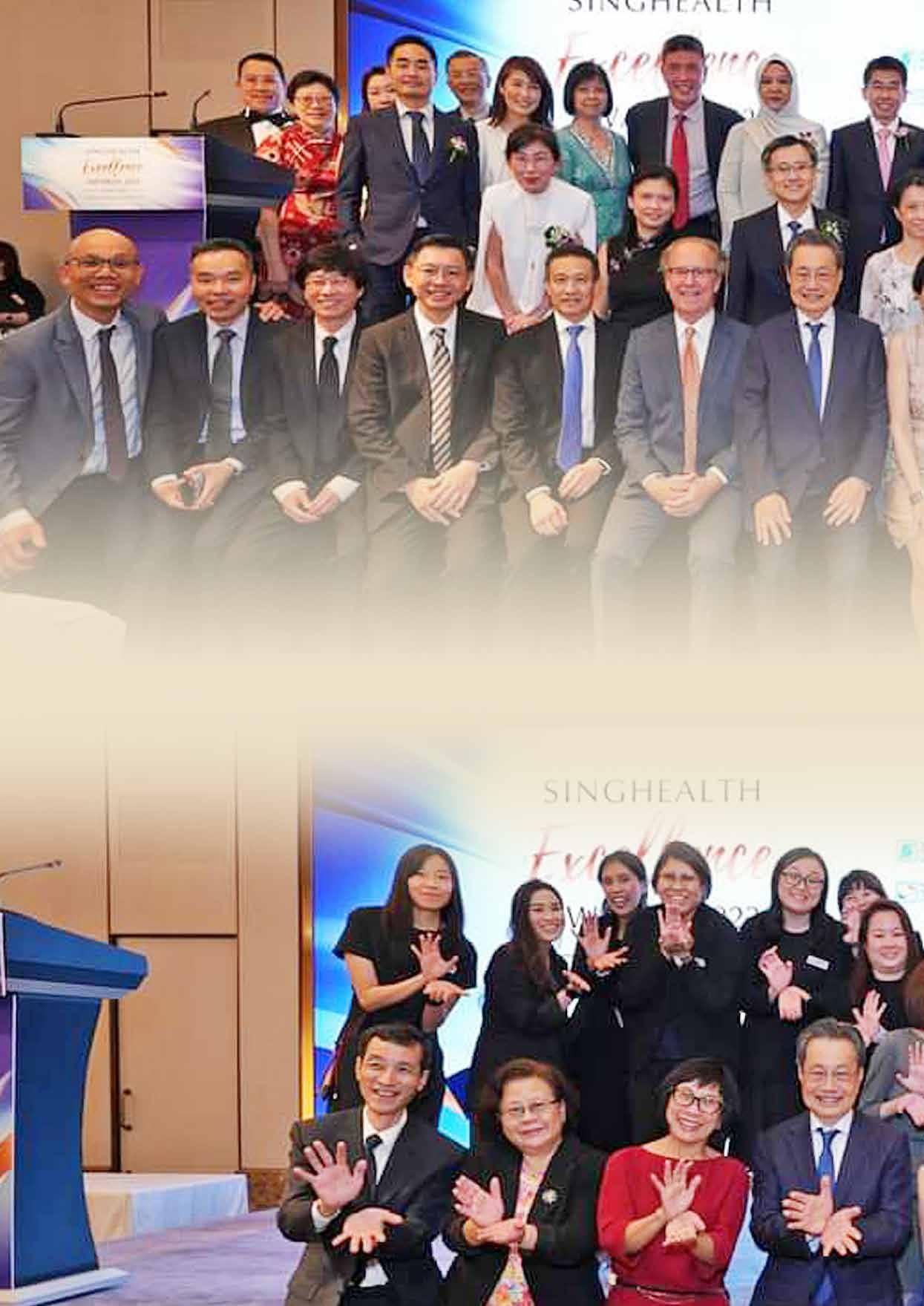
• About Us
• Leadership
• Overall Key Figures and Statistics
ACHIEVEMENTS
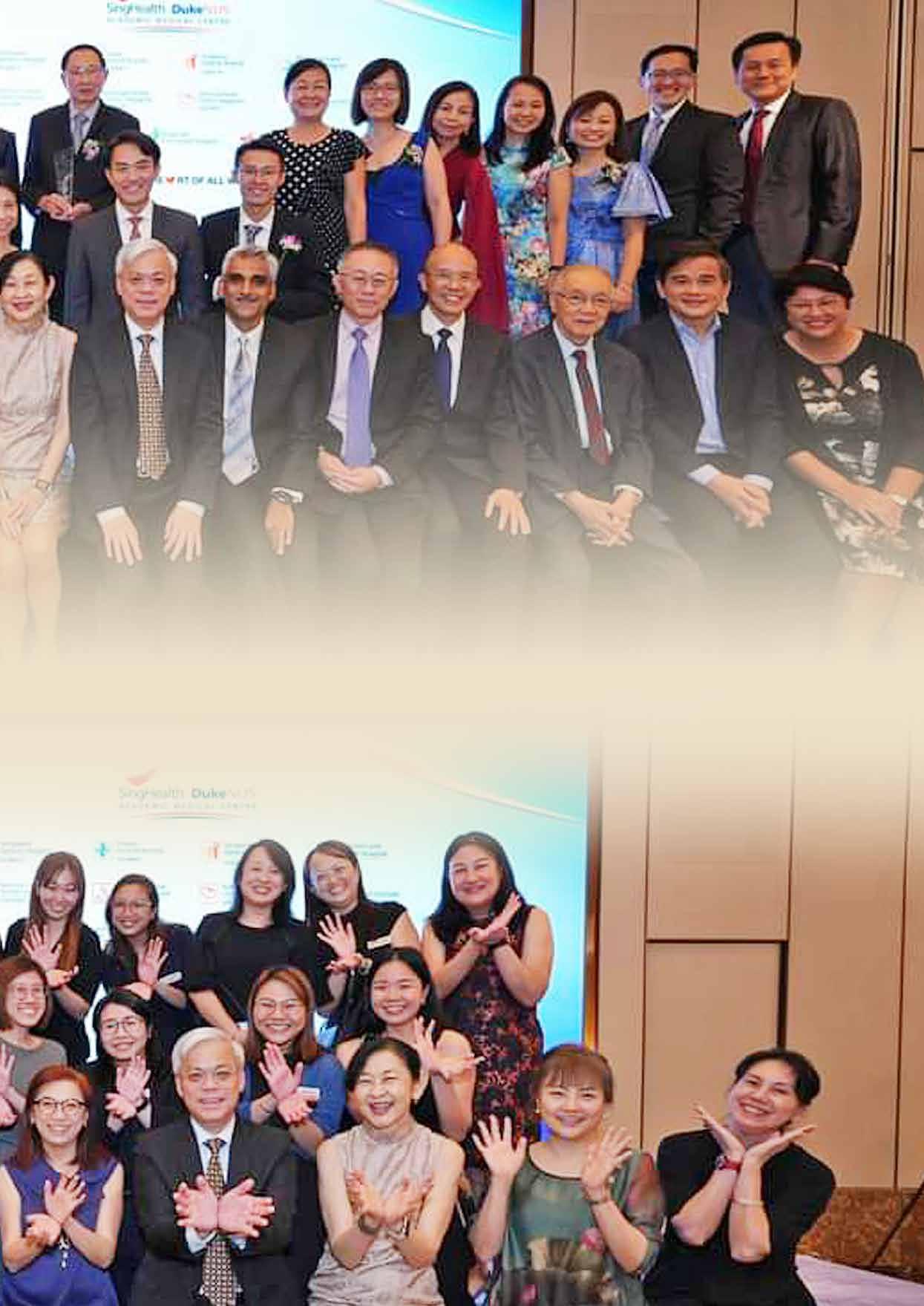
• Financial Information
• Research Statistics
• Giving Statistics
ABOUT US
OUR VISION
Defining Tomorrow’s Medicine
The SingHealth Duke-NUS AMC draws on the collective strengths of SingHealth and DukeNUS Medical School to provide our patients and community with the best outcomes and experience.
By leveraging the synergies in clinical care, research and education created through our Academic Clinical Programmes, Disease Centres and Joint Institutes, the SingHealth DukeNUS AMC fosters the exchange of scientific knowledge and clinical perspectives to accelerate innovation and new discoveries, advance the practice of medicine as well as nurture the next generation of healthcare professionals.
SingHealth delivers comprehensive, multidisciplinary and integrated care across a network of acute hospitals, national specialty centres, polyclinics and community hospitals. Offering over 40 clinical specialties, SingHealth is Singapore’s largest public healthcare cluster.
Duke-NUS Medical School, Singapore’s flagship graduate-entry medical school, nurtures
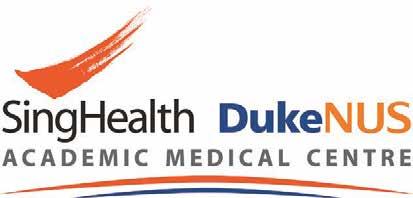
‘Clinician Plus’ graduates to become leaders in the global healthcare and biomedical ecosystem, while scientists from its five Signature Research Programmes and ten Centres transform medicine and improve lives in Asia and beyond.
For more information, please visit:
www.singhealthdukenus.com.sg
www.singhealth.com.sg
www.duke-nus.edu.sg
OUR MISSION
Care to Heal
Educate to Empower
Innovate to Advance
OUR COMMON PURPOSE
OUR CORE VALUES
Compassion Integrity
Collaboration
88 SingHealth Duke-NUS Academic Medical Centre
Members of the SingHealth Group
Hospitals:
Singapore General Hospital, Changi General Hospital, Sengkang General Hospital, KK Women’s and Children’s Hospital and Eastern General Hospital (expected completion: 2030)
National Specialty Centres:
National Cancer Centre Singapore, National Dental Centre Singapore, National Heart Centre Singapore, National Neuroscience Institute and Singapore National Eye Centre
Community Hospitals:
Bright Vision Community Hospital, Sengkang Community Hospital and Outram Community Hospital
Polyclinics:
Bedok, Bukit Merah, Eunos, Marine Parade, Outram, Pasir Ris, Punggol, Sengkang, Tampines, Tampines North (expected completion: 2023) and Kaki Bukit (expected completion: 2026)
About Duke-NUS Medical School
Duke-NUS Medical School is Singapore’s flagship graduate entry medical school, established in 2005 with a strategic, governmentled partnership between two world-class institutions: Duke University School of Medicine and the National University of Singapore (NUS). Through an innovative curriculum, students at Duke-NUS are nurtured to become multi-faceted ‘Clinicians Plus’ poised to steer the healthcare and biomedical ecosystem in Singapore and beyond. A leader in ground-breaking research and translational innovation, Duke-NUS has gained international renown through its five Signature Research Programmes and ten Centres. The enduring impact of its discoveries is amplified by its successful Academic Medicine partnership with SingHealth, Singapore’s largest healthcare group. This strategic alliance has spawned 15 Academic Clinical Programmes, which harness multi Duke-NUS to harness multidisciplinary research and education to transform medicine and improve lives.
For more information, please visit: www.duke-nus.edu.sg
89 Annual Report 2022/2023
LEADERSHIP
SingHealth Board Of Directors
CHAIRMAN
Mr Cheng Wai Keung
Chairman & Managing Director Wing Tai Holdings Ltd
MEMBERS
Mr Chan Yeng Kit
Permanent Secretary Ministry of Health
Mr Khoo Boon Hui
(till 23 September 2022)
Director
Certis CISCO Security Pte Ltd
Mr Lee Chuan Teck
(from 1 July 2022)
Permanent Secretary (Development)
Ministry of Trade and Industry
Prof Victor J Dzau
President, National Academy of Medicine, USA
Ms Euleen Goh Yiu Kiang
Chairman DBS Foundation Ltd
Mr Tony Chew Leong Chee
Executive Chairman
Asia Resource Corporation Pte Ltd
Prof Thomas M Coffman
Dean
Duke-NUS Medical School
Ms Jacqueline Poh Mae-Jean
Managing Director
Economic Development Board
Mr Loh Ngai Seng
(till 30 June 2022)
Permanent Secretary
Ministry of Transport
Mr Lim Chin Hu
Board Member
Singapore Exchange Limited & ST Engineering
Ms Khartini Binte Abdul Khalid
Senior Lecturer
Ngee Ann Polytechnic
Ms Joy Tan Partner
Wong Partnership LLP
Mr Fong Heng Boo
Non-Executive Director Agency for Integrated Care Pte Ltd
Mr Yeoh Oon Jin Chairman
Singapore Land Authority
Prof Hsieh Tsun-yan
Chairman & Lead Counselor
LinHart Group Pte Ltd
Ms Leong Wai Leng
(from 24 September 2022)
President, Singapore Market
Temasek International Pte Ltd
90 SingHealth Duke-NUS Academic Medical Centre
Duke-NUS Governing Board
CHAIRMAN
Mr Goh Yew Lin
Managing Director
G.K. Goh Holdings Limited
MEMBERS
Dr Fidah Alsagoff
Senior Managing Director Joint Head Enterprise Development Group
Head, Life Sciences Temasek International Pte Ltd
Prof Edward G Buckley
Vice-Dean for Education
Chair, Department of Ophthalmology Duke University School of Medicine
Mr Chng Hak-Peng
Board Member
National Library Board Singapore
Prof Fong Kok Yong
Deputy Group Chief Executive Officer (Medical & Clinical Services)
Singapore Health Services
Dr Geh Min
Immediate Past President
Nature Society (Singapore)
Former Nominated Member of Parliament
Prof Mary E. Klotman
Executive Vice President for Health Affairs
Duke University
Mr Lee Kim Shin Counsel
Allen & Gledhill LLP
DEPUTY CHAIRMAN
Prof Aaron Thean
Deputy President (Academic Affairs) and Provost National University of Singapore
Mr Lee Ming San
Managing Director One North Capital Pte Ltd
Ms Lee Sze Yeng
Deputy Managing Partner
KPMG Singapore
Prof Kenneth
Mak Seck Wai
Director-General of Health
Ministry of Health
Mr Mak Lye Mun
Executive Chairman Intraco Limited
Ms Joan Moh Jiehui
Divisional Director Higher Education (Planning, Skills & Academic Research)
Ministry of Education
Prof Ivy Ng Swee Lian
Group Chief Executive Officer
Singapore Health Services
Ms Teo Swee Lian
Non-Executive and Independent Director
Singapore Telecommunications Ltd
91 Annual Report 2022/2023
SingHealth Duke-NUS Senior Management
SingHealth
Prof Ivy Ng
Group Chief Executive Officer
Prof Fong Kok Yong
Deputy Group Chief Executive Officer (Medical & Clinical Services)
Prof Kenneth Kwek
Deputy Group Chief Executive Officer (Innovation & Informatics)
Prof Lee Chien Earn
Deputy Group Chief Executive Officer (Regional Health System)
Prof Ng Wai Hoe
Deputy Group Chief Executive Officer (Strategy & Planning)
Prof Lim Soon Thye
Deputy Group Chief Executive Officer (Research & Education)
Prof Terrance Chua
Group Chairman, Medical Board Assoc Prof Ong Biauw Chi
Group Chief Risk Officer
Mr Sia Kheng Hong
Group Chief Financial Officer
Mr Tan Jack Thian
Group Chief Operating Officer
Ms Esther Tan
Group Chief Human Resource Officer
Assoc Prof Tan Say Beng
Group Chief Research Officer
Prof Chan Choong Meng
Group Chief Education Officer
Assoc Prof
Chow Wan Cheng
Group Director, Academic Medicine
Adj Assoc Prof
Tracy Carol Ayre
Group Chief Nurse
Assoc Prof Lita Chew
Group Director, Allied Health
Ms Audrey Lau
Group Chief Communications Officer
Mr Benedict Tan
Group Chief Digital Strategy Officer
Dr Goh Min Liong
Group Chief Medical Informatics Officer
Prof Tan Kok Hian
Group Director, Institute for Patient Safety & Quality
Dr Michael Wong
Group Director, Regional Health System
Ms Lee Chen Ee
Group Director, Innovation & Transformation
Mr Kevin Tay
Group Chief Information Officer
Ms Quay Keng Wah
Group Director, Office of Strategy Management
Assoc Prof
Tan Hiang Khoon
Group Director, International Collaboration Office
Ms Elizabeth Quah
Group Director, Regional Hospital Network
Prof Aung Tin
Group Director, Research (Scientific)
Ms Enny Kiesworo
Group Director, Research (Corporate Admin & Technology Development)
Prof Lo Yew Long
Group Director, Research (Research Integrity, Compliance & Ethics)
Assoc Prof Nigel Tan
Group Director, Education (Undergraduate)
Assoc Prof Adrian Koh
Group Director, Education (Graduate)
Mr Chua Kim Chuan
Group Chief Information Security Officer
Assoc Prof Phua Ghee Chee
Group Director, Staff Wellness
Dr Lim Eng Kok
Group Director, Value-Driven Care & Future Workforce
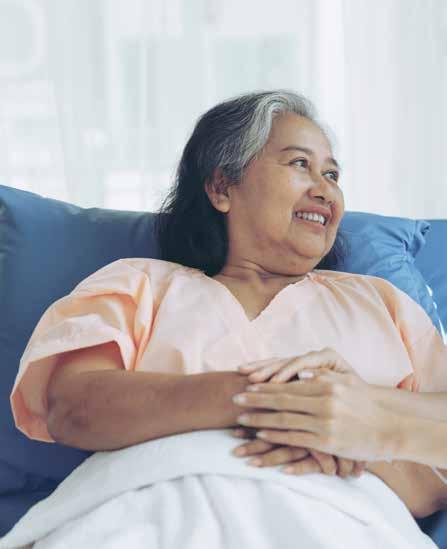
92 SingHealth Duke-NUS Academic Medical Centre
Duke-NUS
Prof Thomas M. Coffman
Dean
Prof Patrick J Casey
(till 1 July 2023)
Senior Vice-Dean, Office of Research
Prof Patrick Tan
(from 1 July 2023)
Senior Vice-Dean, Office of Research
Ms Karen Chang
Senior Vice-Dean & Group Director, Office of Corporate Services
Prof Ian Edward Curran
Vice-Dean, Office of Education
Assoc Prof
Chow Wan Cheng
Vice-Dean, Office of Academic Medicine
Prof Patrick J Casey
Interim Head, Office of Innovation & Entrepreneurship
SingHealth Institutions Senior Management

Prof Kenneth Kwek
Chief Executive Officer
Prof Ruban Poopalalingam
Chairman, Medical Board
Prof Ng Wai Hoe
Chief Executive Officer
Adj Assoc Prof Siau Chuin
Chairman, Medical Board
Prof Teo Eng Kiong
Chief Executive Officer
Prof Hsu Pon Poh
Chairman,Medical Board
Prof Alex Sia
Chief Executive Officer
Assoc Prof Ng Kee Chong
(till 1 May 2023)
Chairman, Medical Board
Assoc Prof Chan Yoke Hwee
(from 1 May 2023)
Chairman, Medical Board
Prof William Hwang
Chief Executive Officer
Assoc Prof Poon Choy Yoke
Chief Executive Officer
Prof Terrance Chua
Chief Executive Officer
Assoc Prof Au Wing Lok
Chief Executive Officer Prof Aung Tin
Chief Executive Officer Ms Margaret Lee
till 1 March 2023
Chief Executive Officer
Dr Gan Wee Hoe
(from 1 March 2023)
Chief Executive Officer
Dr David Ng
Chief Executive Officer
93 Annual Report 2022/2023
OVERALL KEY FIGURES AND STATISTICS
Acute Care and Polyclinics
Bed Occupancy Rate Inpatient Surgeries Day Surgeries Average Length of Stay (days) Total Patient Days Inpatients
SIZE Beds (as at end Mar) WORKLOAD PER ANNUM 88.9% 82.9% 6.0% pts 5.5 5.5 - days 264,608 246,581 7.3% 214,219 202,362 5.9% 1,462,502 1,366,543 7.0% 105,741 103,429 2.2% MANPOWER
4,841 4,841Medical 4317 4,172 Dental 136 171 Nursing 11,730 11,535 Others 10,243 10,103 AHPs 6,403 6,283 Total number 32,829 32,264 94 SingHealth Duke-NUS Academic Medical Centre
Bed Occupancy Rate Total Patient Days Inpatients Specialist Outpatient Clinic Attendances Dental Procedures Polyclinic Attendances Dental Attendances Accident & Emergency Attendances SIZE Beds (as at end Mar) WORKLOAD PER ANNUM 66.5% 77.9% -11.3% pts 3.0% -1.6% 7,930 9,059 -12.5% 20.5% 5.6% 167,298 191,337 -12.6% -1.3% 20.1% 1,774,218 1,679,394 2,720,332 2,640,303 540,422 448,507 246,068 249,335 376,520 382,720 Year ended 31 Mar 2023 Year ended 31 Mar 2022 Community Hospitals 805 670 95 Annual Report 2022/2023
FINANCIAL INFORMATION
Assets by Major Categories
Liabilities by Major Categories
Trade and Other Payables
Other Current Liabilities
Non Current Liabilities
TOTAL EQUITY
(S$ million) (S$ million) 1,297 4,395 1,233 4,132 6,787 5,213 1,574 6,395 4,942 1,453 2,864 257 2,588 232 2,626 561 2,574 578
Equipment
Plant and
Trade and Other Receivables
Other Assets
TOTAL TOTAL 96 SingHealth Duke-NUS Academic Medical Centre
Revenue Breakdown by Major Categories
Expenditure by Major Categories
Other Operating Expenses
Depreciation and Amortisation
* Include donations to Charity Funds
(S$ million) (S$ million) 2,538 3,948 2,308 3,731 7,582 7,461 445 7,677 7,536 420 3,473 1,594 3,098 2,067 1,571
2,271
1,474
1,318
Clinical
Revenue Manpower Subvention Supplies and Consumables Other Revenue*
TOTAL TOTAL Year ended 31 Mar 2023 Year ended 31 Mar 2022 97 Annual Report 2022/2023
31 Third Hospital Avenue, #03-03 Bowyer Block C, Singapore 168753 Tel: 6225 0488 www.singhealth.com.sg IBM PHD STUDENTS (of whom 32 are also MD students) CTS PHD STUDENTS (of whom 2 students are also MD graduates) QBM PHD STUDENTS 20 25 107 Medical 0 0 Dental 0 0 Nursing 9 11 Others 950 906 AHPs 111 101 Total Number 1,070 1,018
Year ended 31 Mar 2023 Year ended 31 Mar 2022 98 SingHealth Duke-NUS Academic Medical Centre
MANPOWER
8 College Road, Singapore 169857
Tel: 6516 7666 www.duke-nus.edu.sg
ALL FACULTY (as of 31 Mar 2023):
2,509 89
Total number of MD and PhD students and graduates
1,126
MD GRADUATES
614 325 3
(of whom 24 are also PhD graduates and 2 are CTS PhD students)
MD STUDENTS
(of whom 32 are also PhD students and 4 are PhD graduates)
IBM PHD GRADUATES
(of whom 24 are also MD graduates and 4 are final year MD students)
5
CTS PHD GRADUATES
GRADUATES
Note: "students" in this table refers to current students.
IBM: Integrated Biology & Medicine
QBM: Quantitative Biology & Medicine
(previously Integrated Biostatistics & Informatics),
CTS: Clinical & Translational Sciences
QBM PHD
99 Annual Report 2022/2023
FIGURES SIZE Beds (as at end Mar) WORKLOAD PER ANNUM Year ended 31 Mar 2023 Year ended 31 Mar 2022 Bed Occupancy Rate 86.8% 83.3% Inpatients 75,233 72,491 Average Length of Stay (days) 7.2 7.3 Total Patient Days 542,361 527,720 Day Surgeries 69,211 65,142 Inpatient Surgeries 41,540 41,715 Specialist Outpatient Clinic Attendances 771,371 744,603 Accident & Emergency Attendances 114,193 109,258 1,939 Outram Road, Singapore 169608 Tel: 6222 3332 www.sgh.com.sg 1,939 Medical 1,255 1,232 DentalNursing 3,634 3,777 Others 2,391 2,451 AHPs 1,903 1,884 Total number 9,183 9,344 100 SingHealth Duke-NUS Academic Medical Centre
KEY
WORKLOAD PER ANNUM Bed Occupancy Rate 74.9% 72.0% Inpatients 78,623 70,990 Average Length of Stay (days) 2.7 2.8 Total Patient Days 209,656 201,395 Day Surgeries 12,659 11,465 Inpatient Surgeries 17,695 17,934 Specialist Outpatient Clinic Attendances 591,707 584,737 Dental Attendances 7,229 6,586 Accident & Emergency Attendances 178,263 111,679 Dental Procedures 12,005 11,067 100 Bukit Timah Road, Singapore 229899 Tel: 6225 5554 www.kkh.com.sg KEY FIGURES SIZE Beds (as at end Mar) Year ended 31 Mar 2023 Year ended 31 Mar 2022 864 864 Medical 761 753 10 Dental 10 1,907 Nursing 1,829 1,305 Others 1,303 990 AHPs 963 4,973 Total number 4,858 101 Annual Report 2022/2023
KEY FIGURES
WORKLOAD PER ANNUM Bed Occupancy Rate Inpatient Surgeries 98.4% 21,927 87.2% 20,349 Inpatients 53,250 49,592 Average Length of Stay (days) 6.9 6.7 Total Patient Days 368,353 334,037 Day Surgeries 33,474 31,576 Specialist Outpatient Clinic Attendances 423,512 417,565 Accident & Emergency Attendances 128,392 118,730 Dental Attendances 3,705 3,046 Dental Procedures 4,579 3,746 Year ended 31 Mar 2022 Year ended 31 Mar 2023 1,054 1,054 2 Simei Street 3, Singapore 529889 Tel: 6788 8833 www.cgh.com.sg Medical 764 748 6 Dental 6 2,388 Nursing 2,374 1,709 Others 1,699 1,036 AHPs 1,051 5,903 Total number 5,878
SIZE Beds (as at end Mar) 102 SingHealth Duke-NUS Academic Medical Centre
Year ended 31 Mar 2022 Year ended 31 Mar 2023 799 799 110 Sengkang East Way, Singapore 544886 Tel: 6930 6000 www.skh.com.sg WORKLOAD PER ANNUM Bed Occupancy Rate Average Length of Stay (days) Total Patient Days Inpatients 95.9% 89.4% 6.0 5.7 48,133 44,587 286,779 253,618 Inpatient Surgeries Specialist Outpatient Clinic Attendances Dental Attendances Accident & Emergency Attendances Dental Procedures Day Surgeries 25,714 21,762 19,330 226,247 2,712 119,574 1,888 18,271 201,863 3,169 108,840 2,611 Medical 550 525 3 Dental 2 1,872 Nursing 1,695 1,136 Others 1,075 702 AHPs 669 4,263 Total number 3,966
FIGURES SIZE Beds (as at end Mar) 103 Annual Report 2022/2023
KEY
5 Hospital Drive, Singapore 169609 Tel: 6704 8000 www.nhcs.com.sg 82.3% 73.9% Bed Occupancy Rate 5.9 5.6 Average Length of Stay (days) 55,353 49,773 Total Patient Days 9,369 8,921 Inpatients WORKLOAD PER ANNUM 142,966 142,670 Specialist Outpatient Clinic Attendances 5,249 5,160 Inpatient Surgeries 2,847 2,557 Day Surgeries 185 185 Year ended 31 Mar 2023 Year ended 31 Mar 2022
SIZE Beds (as at end Mar) Medical 146 138Dental450 Nursing 466 373 Others 365 313 AHPs 287 1,282 Total number 1,256 104 SingHealth Duke-NUS Academic Medical Centre
KEY FIGURES
WORKLOAD PER ANNUM 11 Hospital Drive, Singapore 169610 Tel: 6436 8000 www.nccs.com.sg KEY FIGURES 9,392 9,566 Day Surgeries 182,688 189,511 Dental Attendances 220,217 235,634 Dental Procedures 5 Second Hospital Avenue, Singapore 168938 Tel: 6324 8802 www.ndcs.com.sg Year ended 31 Mar 2023 Year ended 31 Mar 2022 Specialist Outpatient Clinic Attendances 7,503 8,052 Day Surgeries WORKLOAD PER ANNUM 158,530 158,183 Year ended 31 Mar 2022 Year ended 31 Mar 2023 KEY FIGURES Medical 196 190Dental211 Nursing 206 433 Others 397 500 AHPs 477 1,340 Total number 1,270 Medical140 Dental 130 20 Nursing 19 359 Others 348 38 AHPs 48 557 Total number 545 105 Annual Report 2022/2023
11
11
Jalan Tan Tock Seng, Singapore 308433 Tel: 6357 7153 www.nni.com.sg
167 Jalan Bukit Merah, Tower 5, #15-10, Singapore 150167 Tel: 6236 4800 polyclinic.singhealth.com.
Medical 244 238 21 Dental 22 332 Nursing 303 617 Others 642 252 AHPs 228 1,466 Total number 1,433 Medical 132 131 Medical 136 133DentalDental310 Nursing 308 40 Nursing 41 397 Others 360 148 Others 148 179 AHPs 171 150 AHPs 147 1,018 Total number 970 474 Total number 469 106 SingHealth Duke-NUS Academic Medical Centre
Third Hospital Drive, Singapore 169751 Tel: 6227 7255 www.snec.com.sg
KEY FIGURES
46,737 42,088 Specialist Outpatient Clinic Attendances 137,831 129,662
Procedures
Attendances
Polyclinic Attendances
PER ANNUM Year ended 31 Mar 2023 Year ended 31 Mar 2022 Year ended 31 Mar 2023 Year ended 31 Mar 2022
PER ANNUM WORKLOAD PER ANNUM Year ended 31 Mar 2022 Year ended 31 Mar 2023
Dental
49,734 47,023 Dental
1,774,218 1,679,394
WORKLOAD
WORKLOAD
FIGURES 53,419 52,242 Day Surgeries 359,262 348,594 Specialist Outpatient Clinic Attendances 107 Annual Report 2022/2023
KEY FIGURES KEY
10 Hospital Blvd, Singapore 168582 Tel: 6970 3000 www.singhealthch.com.sg Medical 38 33Dental277 Nursing 159 115 Others 77 117 AHPs 102 547 Total number 371 1 Anchorvale Street, Singapore 544835 Tel: 6930 7000 www.singhealthch.com.sg Medical 32 25Dental183 Nursing 201 85 Others 79 92 AHPs 81 392 Total number 386 5 Lorong Napiri, Singapore 547530 Tel: 6248 5755 www.singhealthch.com.sg Medical 18 25Dental 141 88 Nursing 132 81 Others 72 19 AHPs 370 206 Total number MANPOWER Medical 1 0 0 Dental 0 108 SingHealth Duke-NUS Academic Medical Centre
Inpatients 2,292 2,189 WORKLOAD PER ANNUM 269 SIZE Beds (as at end Mar) 82.6% 85.5% Bed Occupancy Rate 62,121 73,486 Total Patient Days 201 Year ended 31 Mar 2023 Year ended 31 Mar 2022
Year ended 31 Mar 2023 Year ended 31 Mar 2022 WORKLOAD PER ANNUM 316 85.5% 88.9% Bed Occupancy Rate 3,320 2,857 Inpatients 92,726 91,865 Total Patient Days
283 SIZE Beds (as at end Mar) WORKLOAD PER ANNUM 220 18.3% 46.0% Bed Occupancy Rate Inpatients 2,318 4,013 Total Patient Days 12,451 25,986 186 Year ended 31 Mar 2023 Year ended 31 Mar 2022
SIZE Beds (as at end Mar) Year ended 31 Mar 2023 Year ended 31 Mar 2022 9 Nursing 6 144 Others 123 1 AHPs 1 155 Total Number 130 109 Annual Report 2022/2023
KEY FIGURES
KEY FIGURES
KEY FIGURES
RESEARCH STATISTICS
Cluster CS (includes TA who fulfills the criteria)
Faculty CS
National CS (includes Singapore Translational Research Investigator Award, CSA, HPHSR Clinician Scientist Award, CIA/CIDA & excludes TA)
Transition Award (TA)
Clinician Innovator Award/Clinician Innovator Development Award (CIA/CIDA)
Total CS (unique warm bodies)
NO. OF CLINICIAN-SCIENTISTS (CS) [SINGHEALTH & DUKE-NUS] NO OF PRINCIPAL INVESTIGATORS LEADING ONGOING RESEARCH [SINGHEALTH] STAFFING NO. OF CLINICIAN-INVESTIGATORS [SINGHEALTH] 435 686
63
29
10
21
3
115 110 SingHealth Duke-NUS Academic Medical Centre
RESEARCH ACHIEVEMENTS
PUBLICATION IN INTERNATIONAL PEERREVIEWED JOURNALS (FY07 – CY22) [SINGHEALTH & DUKE-NUS]
>24,000 SingHealth >11,600
Duke-NUS
NURSING RESEARCH STATISTICS (CY2022)
COMPETITIVE FUNDING (FY07 – CY22) [SINGHEALTH & DUKE-NUS]
>S$2.5B
AWARDS (CY22) [SINGHEALTH & DUKE-NUS]
1
Clinician Scientist Award - Investigator (CSA-INV)
Clinician Scientist Award - Senior Investigator (CSA-SI) 9
7 TA 1 CIA/CIDA
Number of presentations
Number of publications
Number of research projects with nurses as principal investigators
$1,190,385.54 Quantum of grants awarded
Allied Health Professionals
85 47 38 11 230 216
Number of conference presentations
Number of research papers published
$4,020,285
Total research grants received
Number of grants 111 Annual Report 2022/2023
EDUCATION STATISTICS
Undergraduate Education
SingHealth handles about 43 per cent of the nation’s clinical teaching load annually. On an average day, SingHealth provides training to
780 medical students
146 allied health students
993 nursing students
112 SingHealth Duke-NUS Academic Medical Centre
Graduate Education
JCST Accredited programmes
475
Chief Residents completed the national Singapore Chief Residency Programme and SingHealth Residency Leadership Programme.
new dentistry Residents joined SingHealth in AY22. As the largest Sponsoring Institution for medical Residency Programmes in Singapore, SingHealth has: 227 20 915 33 new medical Residents in AY22 medical Residents in training across
1,965
faculty members ACGME-I
and
medical Residents graduated from SingHealth Residency in AY22
medical
AY22
30 20 13
Accredited
161
students engaged in
programmes
To date, SingHealth Residency has nurtured Chief Residents 189 113 Annual Report 2022/2023
Postgraduate & Continuing Education
Allied Health Education
5,760 healthcare professionals trained in 105 unique continuing allied health education programme across 232 sessions
Oral Health Education
12 unique oral health education programmes were conducted for 205 oral health professionals across 230 sessions
Healthcare Administration & Leadership
1,685 healthcare professionals and administrators trained in 21 unique programmes across 73 sessions to develop their competencies
Recognising Educational Excellence
61 outstanding educators conferred the AMEI Golden Apple Awards 2022
12 outstanding House Officers and 34 exemplary Medical Officers received the SingHealth Best Junior Doctors Awards 2022
114 SingHealth Duke-NUS Academic Medical Centre
Nursing Education
39,935 nurses trained in more than 30 Unique Continuing Nursing Education programmes across 1,245 sessions
539 nurses from other healthcare clusters attached to SingHealth
Medical Education
360 junior and senior clinicians attended and benefitted from 4 academic and professional development programmes across 13 sessions
466 aspiring clinician-investigators and clinician-innovators participated in the research, innovation, and medical technology seminars and workshops
Technology-Enhanced Learning & Innovation
16,060 healthcare professionals attended more than 100 unique simulation training workshops over 1,153 sessions to hone their clinical and surgical skills
Educators Development
1,499 educators equipped with capabilities through 56 AMEI Education Grand Rounds and workshops
AMEI Education Grant awarded to 12 projects and scholarly efforts to evaluate and improve educational outcomes
359 outstanding residency faculty and top-performing residents received the Residency in SingHealth Excels! (RiSE) Awards 2022
7 top-performing graduating Duke-NUS students accorded the SingHealth Awards 2022
115 Annual Report 2022/2023
GIVING STATISTICS
Philanthropic gifts go a long way in supporting the key pillars of research, education, innovation and improvements in clinical care as we pursue academic medicine. Funds raised also support initiatives to boost the well-being and resilience of caregivers and healthcare workers, which enable them to better care for the sick and the afflicted.
Donations in FY2022: $172.36 million
Academic Medicine and Academic Clinical Programmes:
$32.44 million
Other Areas of Support:
Education:
Patient Care and Support:
$69.64 million
$20.10 million $27.54 million
Research:
$22.64 million
116 SingHealth Duke-NUS Academic Medical Centre
Professorships and Named Funds
• Agape Professorship in Population Health
• Agape Population Health Programme Fund
• Lien Ying Chow Endowment Fund
• DBS Population Health Fund
• Cynthia Goh Palliative Care Programme Fund
• Golden Horse Fund Management Diagnosing Brain Injuries Research Fund
• Goh Foundation Innovation in Supportive and Palliative Care Programme
117 Annual Report 2022/2023

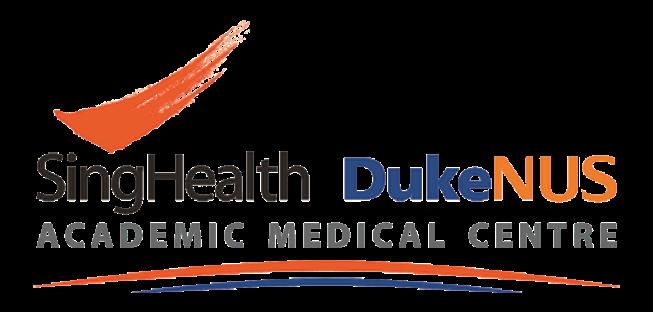

























































 Prof Leopold Schmetterer Scientific Director & Head of Ocular Imaging, Singapore Eye Research Institute (SERI)
Prof Leopold Schmetterer Scientific Director & Head of Ocular Imaging, Singapore Eye Research Institute (SERI)


 Head, Opthalmic Engineering & Innovation Laboratory, SERI
Head, Opthalmic Engineering & Innovation Laboratory, SERI


 Prof Tina Wong Head & Senior Consultant, Department of Glaucoma, SNEC
Prof Tina Wong Head & Senior Consultant, Department of Glaucoma, SNEC





 Assoc Prof Victor Koh Head & Consultant, Department of Ophthalmology, National University Hospital (NUH)
Assoc Prof Victor Koh Head & Consultant, Department of Ophthalmology, National University Hospital (NUH)














 Consultant,
Consultant,



 From 2011 to 2020, the number of patients on haemodialysis jumped by nearly 67 per cent.
From 2011 to 2020, the number of patients on haemodialysis jumped by nearly 67 per cent.




































































